Incentives Can't Buy Me Knowledge: The Missing Effects of Appreciation and Aligned Performance Appraisals on Knowledge Sharing of Public Employees
VerifiedAdded on 2023/02/13
|38
|11884
|88
AI Summary
This study examines whether incentives affect public employees' intention to share knowledge. Tested incentives satisfy needs for either achievement or appreciation. Both treatments were tested on implicit as well as explicit knowledge sharing. A 2x3 factorial survey experiment was designed to observe within-person and between-person effects. Data were collected from public employees in the core administration and healthcare sector (n=623) in 2018. The analysis indicates that both treatments positively affect knowledge-sharing intention if it is explicit knowledge that ought to be shared. However, no effects of either treatment can be found in either type of knowledge sharing. No negative effect of the tested incentives on knowledge sharing was observed. Hence, incentives might not harm knowledge sharing but also do not pay off in organizational practice. In contrast to these motivation-enhancing human resource practices, ability and opportunity-enhancing practices should be tested to foster knowledge sharing.
Contribute Materials
Your contribution can guide someone’s learning journey. Share your
documents today.
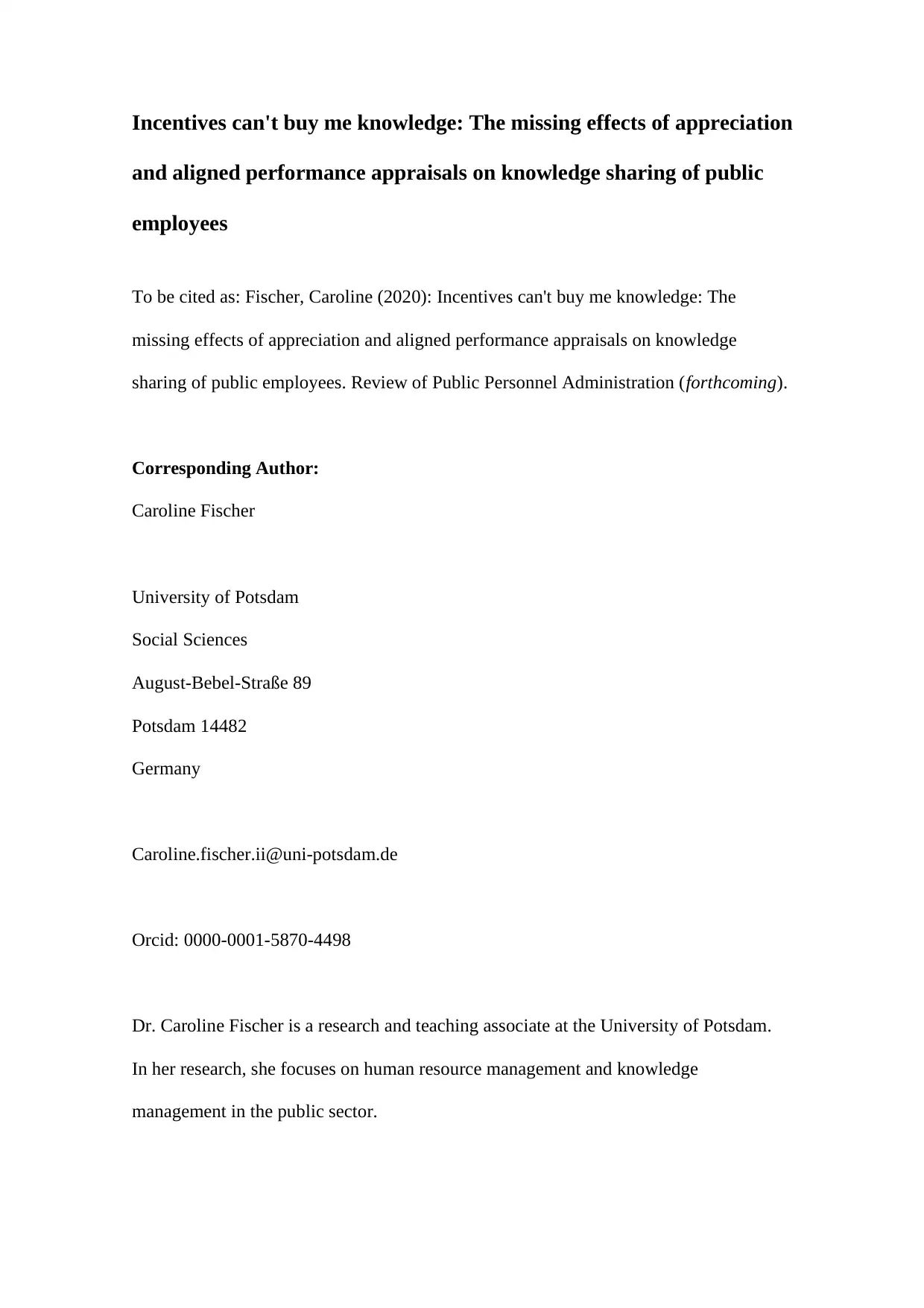
Incentives can't buy me knowledge: The missing effects of appreciation
and aligned performance appraisals on knowledge sharing of public
employees
To be cited as: Fischer, Caroline (2020): Incentives can't buy me knowledge: The
missing effects of appreciation and aligned performance appraisals on knowledge
sharing of public employees. Review of Public Personnel Administration (forthcoming).
Corresponding Author:
Caroline Fischer
University of Potsdam
Social Sciences
August-Bebel-Straße 89
Potsdam 14482
Germany
Caroline.fischer.ii@uni-potsdam.de
Orcid: 0000-0001-5870-4498
Dr. Caroline Fischer is a research and teaching associate at the University of Potsdam.
In her research, she focuses on human resource management and knowledge
management in the public sector.
and aligned performance appraisals on knowledge sharing of public
employees
To be cited as: Fischer, Caroline (2020): Incentives can't buy me knowledge: The
missing effects of appreciation and aligned performance appraisals on knowledge
sharing of public employees. Review of Public Personnel Administration (forthcoming).
Corresponding Author:
Caroline Fischer
University of Potsdam
Social Sciences
August-Bebel-Straße 89
Potsdam 14482
Germany
Caroline.fischer.ii@uni-potsdam.de
Orcid: 0000-0001-5870-4498
Dr. Caroline Fischer is a research and teaching associate at the University of Potsdam.
In her research, she focuses on human resource management and knowledge
management in the public sector.
Secure Best Marks with AI Grader
Need help grading? Try our AI Grader for instant feedback on your assignments.
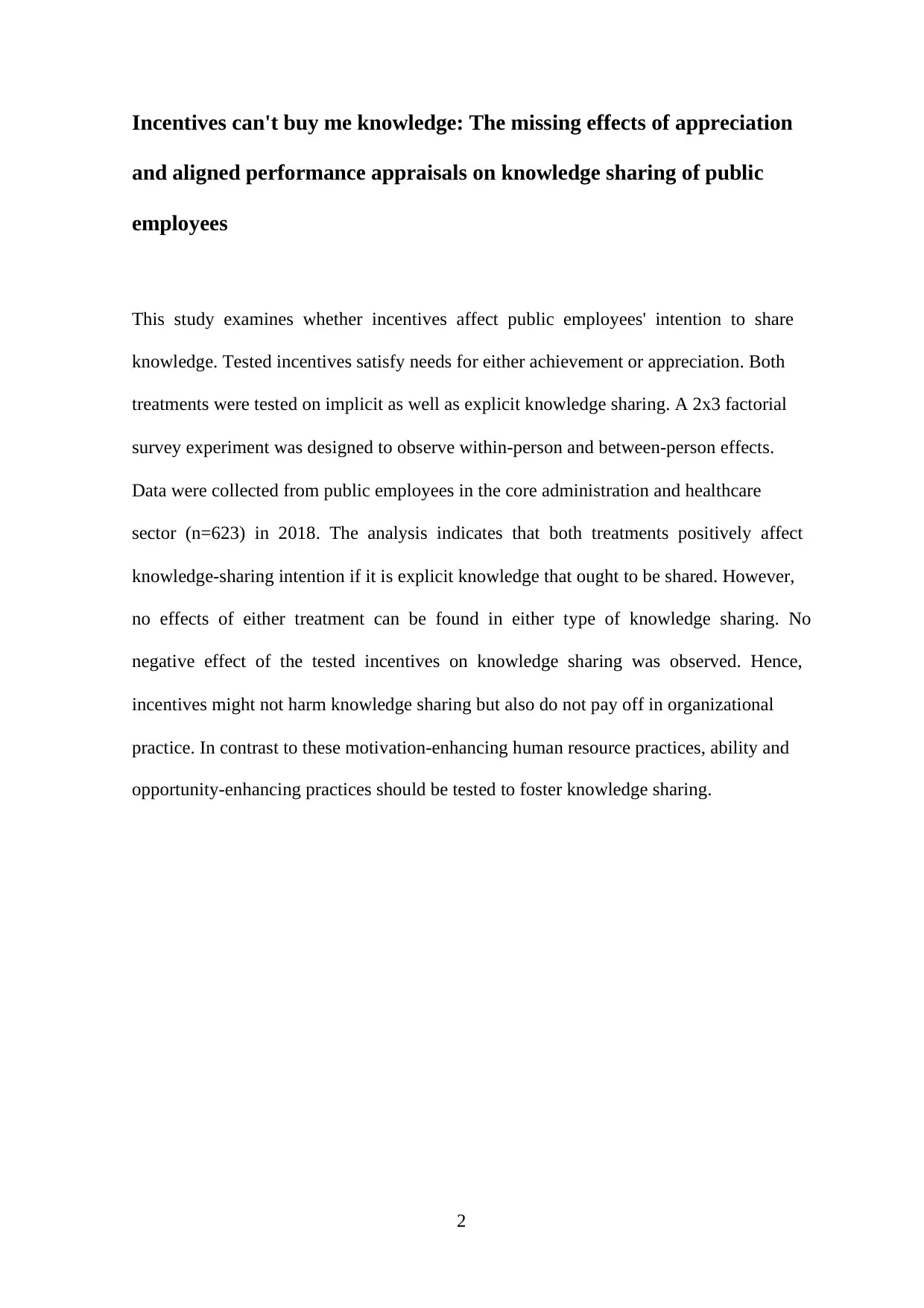
2
Incentives can't buy me knowledge: The missing effects of appreciation
and aligned performance appraisals on knowledge sharing of public
employees
This study examines whether incentives affect public employees' intention to share
knowledge. Tested incentives satisfy needs for either achievement or appreciation. Both
treatments were tested on implicit as well as explicit knowledge sharing. A 2x3 factorial
survey experiment was designed to observe within-person and between-person effects.
Data were collected from public employees in the core administration and healthcare
sector (n=623) in 2018. The analysis indicates that both treatments positively affect
knowledge-sharing intention if it is explicit knowledge that ought to be shared. However,
no effects of either treatment can be found in either type of knowledge sharing. No
negative effect of the tested incentives on knowledge sharing was observed. Hence,
incentives might not harm knowledge sharing but also do not pay off in organizational
practice. In contrast to these motivation-enhancing human resource practices, ability and
opportunity-enhancing practices should be tested to foster knowledge sharing.
Incentives can't buy me knowledge: The missing effects of appreciation
and aligned performance appraisals on knowledge sharing of public
employees
This study examines whether incentives affect public employees' intention to share
knowledge. Tested incentives satisfy needs for either achievement or appreciation. Both
treatments were tested on implicit as well as explicit knowledge sharing. A 2x3 factorial
survey experiment was designed to observe within-person and between-person effects.
Data were collected from public employees in the core administration and healthcare
sector (n=623) in 2018. The analysis indicates that both treatments positively affect
knowledge-sharing intention if it is explicit knowledge that ought to be shared. However,
no effects of either treatment can be found in either type of knowledge sharing. No
negative effect of the tested incentives on knowledge sharing was observed. Hence,
incentives might not harm knowledge sharing but also do not pay off in organizational
practice. In contrast to these motivation-enhancing human resource practices, ability and
opportunity-enhancing practices should be tested to foster knowledge sharing.
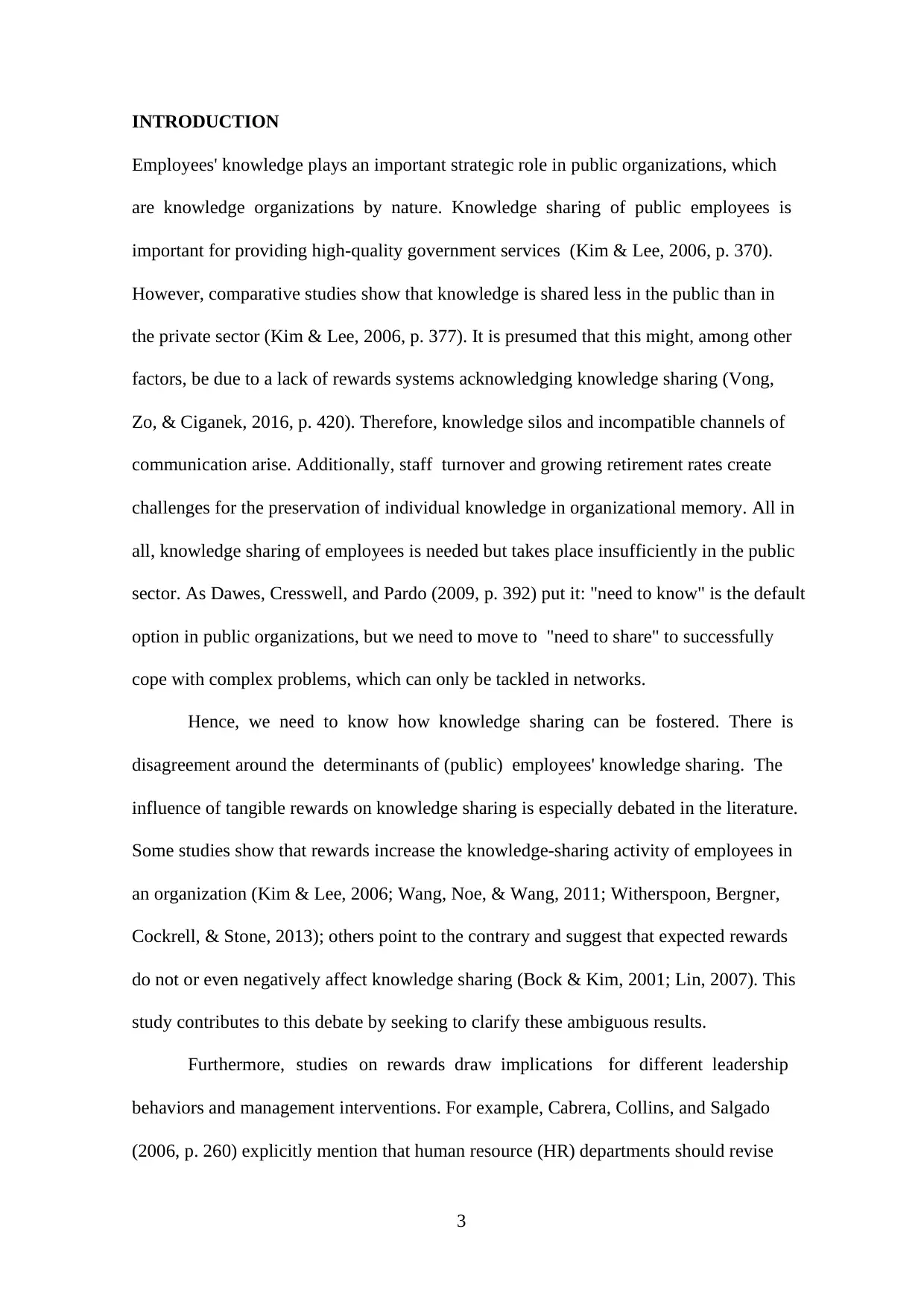
3
INTRODUCTION
Employees' knowledge plays an important strategic role in public organizations, which
are knowledge organizations by nature. Knowledge sharing of public employees is
important for providing high-quality government services (Kim & Lee, 2006, p. 370).
However, comparative studies show that knowledge is shared less in the public than in
the private sector (Kim & Lee, 2006, p. 377). It is presumed that this might, among other
factors, be due to a lack of rewards systems acknowledging knowledge sharing (Vong,
Zo, & Ciganek, 2016, p. 420). Therefore, knowledge silos and incompatible channels of
communication arise. Additionally, staff turnover and growing retirement rates create
challenges for the preservation of individual knowledge in organizational memory. All in
all, knowledge sharing of employees is needed but takes place insufficiently in the public
sector. As Dawes, Cresswell, and Pardo (2009, p. 392) put it: "need to know" is the default
option in public organizations, but we need to move to "need to share" to successfully
cope with complex problems, which can only be tackled in networks.
Hence, we need to know how knowledge sharing can be fostered. There is
disagreement around the determinants of (public) employees' knowledge sharing. The
influence of tangible rewards on knowledge sharing is especially debated in the literature.
Some studies show that rewards increase the knowledge-sharing activity of employees in
an organization (Kim & Lee, 2006; Wang, Noe, & Wang, 2011; Witherspoon, Bergner,
Cockrell, & Stone, 2013); others point to the contrary and suggest that expected rewards
do not or even negatively affect knowledge sharing (Bock & Kim, 2001; Lin, 2007). This
study contributes to this debate by seeking to clarify these ambiguous results.
Furthermore, studies on rewards draw implications for different leadership
behaviors and management interventions. For example, Cabrera, Collins, and Salgado
(2006, p. 260) explicitly mention that human resource (HR) departments should revise
INTRODUCTION
Employees' knowledge plays an important strategic role in public organizations, which
are knowledge organizations by nature. Knowledge sharing of public employees is
important for providing high-quality government services (Kim & Lee, 2006, p. 370).
However, comparative studies show that knowledge is shared less in the public than in
the private sector (Kim & Lee, 2006, p. 377). It is presumed that this might, among other
factors, be due to a lack of rewards systems acknowledging knowledge sharing (Vong,
Zo, & Ciganek, 2016, p. 420). Therefore, knowledge silos and incompatible channels of
communication arise. Additionally, staff turnover and growing retirement rates create
challenges for the preservation of individual knowledge in organizational memory. All in
all, knowledge sharing of employees is needed but takes place insufficiently in the public
sector. As Dawes, Cresswell, and Pardo (2009, p. 392) put it: "need to know" is the default
option in public organizations, but we need to move to "need to share" to successfully
cope with complex problems, which can only be tackled in networks.
Hence, we need to know how knowledge sharing can be fostered. There is
disagreement around the determinants of (public) employees' knowledge sharing. The
influence of tangible rewards on knowledge sharing is especially debated in the literature.
Some studies show that rewards increase the knowledge-sharing activity of employees in
an organization (Kim & Lee, 2006; Wang, Noe, & Wang, 2011; Witherspoon, Bergner,
Cockrell, & Stone, 2013); others point to the contrary and suggest that expected rewards
do not or even negatively affect knowledge sharing (Bock & Kim, 2001; Lin, 2007). This
study contributes to this debate by seeking to clarify these ambiguous results.
Furthermore, studies on rewards draw implications for different leadership
behaviors and management interventions. For example, Cabrera, Collins, and Salgado
(2006, p. 260) explicitly mention that human resource (HR) departments should revise
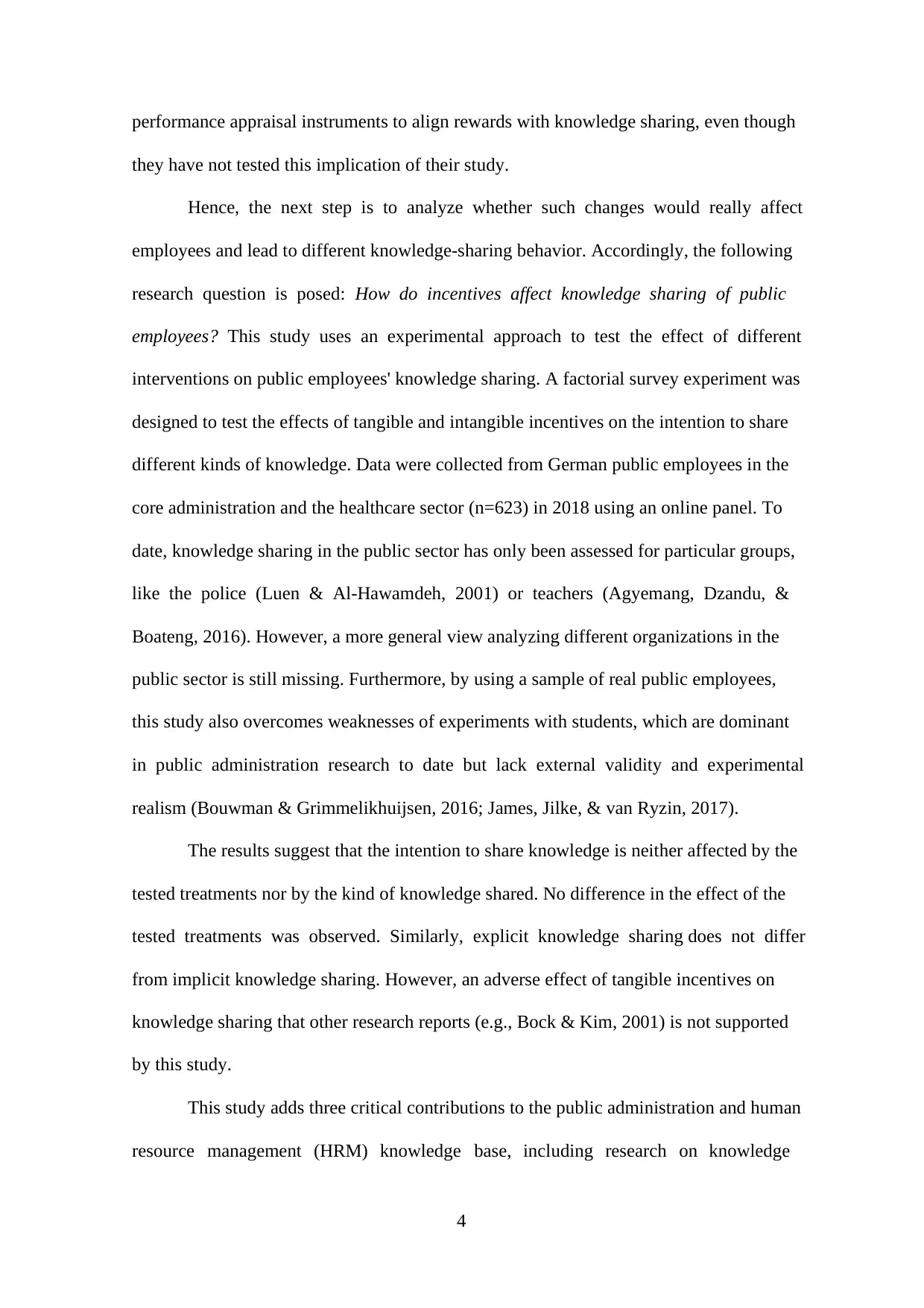
4
performance appraisal instruments to align rewards with knowledge sharing, even though
they have not tested this implication of their study.
Hence, the next step is to analyze whether such changes would really affect
employees and lead to different knowledge-sharing behavior. Accordingly, the following
research question is posed: How do incentives affect knowledge sharing of public
employees? This study uses an experimental approach to test the effect of different
interventions on public employees' knowledge sharing. A factorial survey experiment was
designed to test the effects of tangible and intangible incentives on the intention to share
different kinds of knowledge. Data were collected from German public employees in the
core administration and the healthcare sector (n=623) in 2018 using an online panel. To
date, knowledge sharing in the public sector has only been assessed for particular groups,
like the police (Luen & Al-Hawamdeh, 2001) or teachers (Agyemang, Dzandu, &
Boateng, 2016). However, a more general view analyzing different organizations in the
public sector is still missing. Furthermore, by using a sample of real public employees,
this study also overcomes weaknesses of experiments with students, which are dominant
in public administration research to date but lack external validity and experimental
realism (Bouwman & Grimmelikhuijsen, 2016; James, Jilke, & van Ryzin, 2017).
The results suggest that the intention to share knowledge is neither affected by the
tested treatments nor by the kind of knowledge shared. No difference in the effect of the
tested treatments was observed. Similarly, explicit knowledge sharing does not differ
from implicit knowledge sharing. However, an adverse effect of tangible incentives on
knowledge sharing that other research reports (e.g., Bock & Kim, 2001) is not supported
by this study.
This study adds three critical contributions to the public administration and human
resource management (HRM) knowledge base, including research on knowledge
performance appraisal instruments to align rewards with knowledge sharing, even though
they have not tested this implication of their study.
Hence, the next step is to analyze whether such changes would really affect
employees and lead to different knowledge-sharing behavior. Accordingly, the following
research question is posed: How do incentives affect knowledge sharing of public
employees? This study uses an experimental approach to test the effect of different
interventions on public employees' knowledge sharing. A factorial survey experiment was
designed to test the effects of tangible and intangible incentives on the intention to share
different kinds of knowledge. Data were collected from German public employees in the
core administration and the healthcare sector (n=623) in 2018 using an online panel. To
date, knowledge sharing in the public sector has only been assessed for particular groups,
like the police (Luen & Al-Hawamdeh, 2001) or teachers (Agyemang, Dzandu, &
Boateng, 2016). However, a more general view analyzing different organizations in the
public sector is still missing. Furthermore, by using a sample of real public employees,
this study also overcomes weaknesses of experiments with students, which are dominant
in public administration research to date but lack external validity and experimental
realism (Bouwman & Grimmelikhuijsen, 2016; James, Jilke, & van Ryzin, 2017).
The results suggest that the intention to share knowledge is neither affected by the
tested treatments nor by the kind of knowledge shared. No difference in the effect of the
tested treatments was observed. Similarly, explicit knowledge sharing does not differ
from implicit knowledge sharing. However, an adverse effect of tangible incentives on
knowledge sharing that other research reports (e.g., Bock & Kim, 2001) is not supported
by this study.
This study adds three critical contributions to the public administration and human
resource management (HRM) knowledge base, including research on knowledge
Paraphrase This Document
Need a fresh take? Get an instant paraphrase of this document with our AI Paraphraser
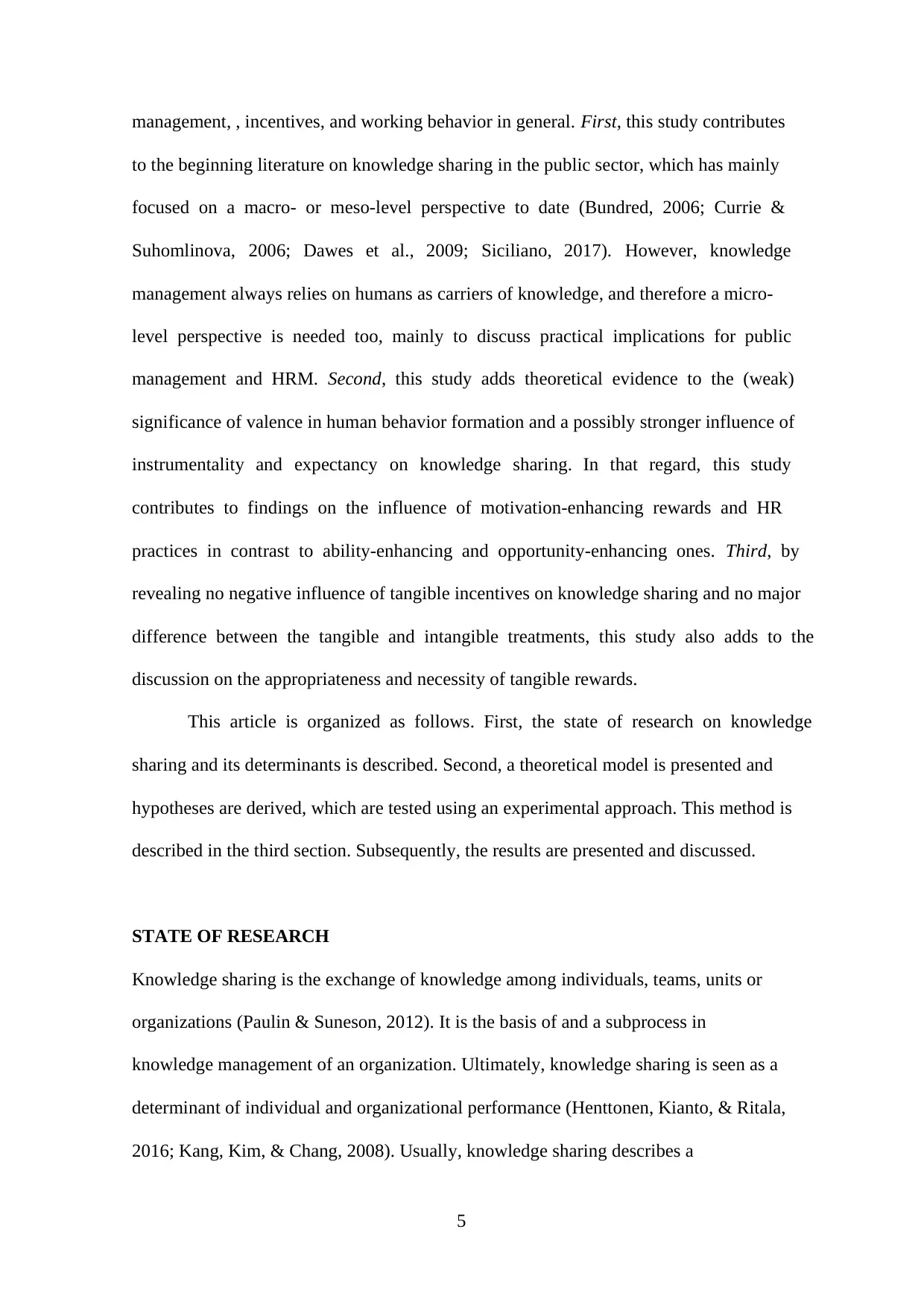
5
management, , incentives, and working behavior in general. First, this study contributes
to the beginning literature on knowledge sharing in the public sector, which has mainly
focused on a macro- or meso-level perspective to date (Bundred, 2006; Currie &
Suhomlinova, 2006; Dawes et al., 2009; Siciliano, 2017). However, knowledge
management always relies on humans as carriers of knowledge, and therefore a micro-
level perspective is needed too, mainly to discuss practical implications for public
management and HRM. Second, this study adds theoretical evidence to the (weak)
significance of valence in human behavior formation and a possibly stronger influence of
instrumentality and expectancy on knowledge sharing. In that regard, this study
contributes to findings on the influence of motivation-enhancing rewards and HR
practices in contrast to ability-enhancing and opportunity-enhancing ones. Third, by
revealing no negative influence of tangible incentives on knowledge sharing and no major
difference between the tangible and intangible treatments, this study also adds to the
discussion on the appropriateness and necessity of tangible rewards.
This article is organized as follows. First, the state of research on knowledge
sharing and its determinants is described. Second, a theoretical model is presented and
hypotheses are derived, which are tested using an experimental approach. This method is
described in the third section. Subsequently, the results are presented and discussed.
STATE OF RESEARCH
Knowledge sharing is the exchange of knowledge among individuals, teams, units or
organizations (Paulin & Suneson, 2012). It is the basis of and a subprocess in
knowledge management of an organization. Ultimately, knowledge sharing is seen as a
determinant of individual and organizational performance (Henttonen, Kianto, & Ritala,
2016; Kang, Kim, & Chang, 2008). Usually, knowledge sharing describes a
management, , incentives, and working behavior in general. First, this study contributes
to the beginning literature on knowledge sharing in the public sector, which has mainly
focused on a macro- or meso-level perspective to date (Bundred, 2006; Currie &
Suhomlinova, 2006; Dawes et al., 2009; Siciliano, 2017). However, knowledge
management always relies on humans as carriers of knowledge, and therefore a micro-
level perspective is needed too, mainly to discuss practical implications for public
management and HRM. Second, this study adds theoretical evidence to the (weak)
significance of valence in human behavior formation and a possibly stronger influence of
instrumentality and expectancy on knowledge sharing. In that regard, this study
contributes to findings on the influence of motivation-enhancing rewards and HR
practices in contrast to ability-enhancing and opportunity-enhancing ones. Third, by
revealing no negative influence of tangible incentives on knowledge sharing and no major
difference between the tangible and intangible treatments, this study also adds to the
discussion on the appropriateness and necessity of tangible rewards.
This article is organized as follows. First, the state of research on knowledge
sharing and its determinants is described. Second, a theoretical model is presented and
hypotheses are derived, which are tested using an experimental approach. This method is
described in the third section. Subsequently, the results are presented and discussed.
STATE OF RESEARCH
Knowledge sharing is the exchange of knowledge among individuals, teams, units or
organizations (Paulin & Suneson, 2012). It is the basis of and a subprocess in
knowledge management of an organization. Ultimately, knowledge sharing is seen as a
determinant of individual and organizational performance (Henttonen, Kianto, & Ritala,
2016; Kang, Kim, & Chang, 2008). Usually, knowledge sharing describes a
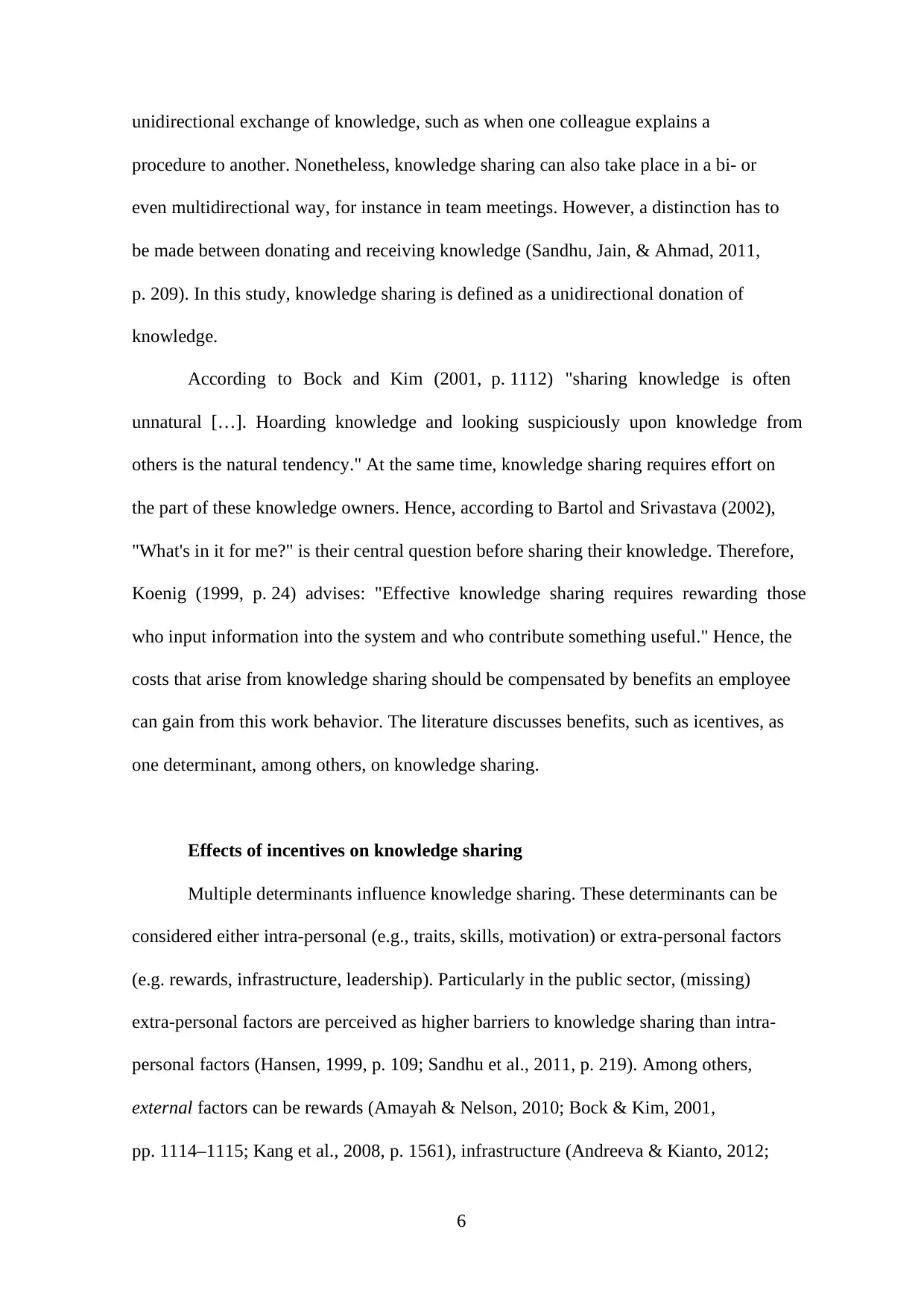
6
unidirectional exchange of knowledge, such as when one colleague explains a
procedure to another. Nonetheless, knowledge sharing can also take place in a bi- or
even multidirectional way, for instance in team meetings. However, a distinction has to
be made between donating and receiving knowledge (Sandhu, Jain, & Ahmad, 2011,
p. 209). In this study, knowledge sharing is defined as a unidirectional donation of
knowledge.
According to Bock and Kim (2001, p. 1112) "sharing knowledge is often
unnatural […]. Hoarding knowledge and looking suspiciously upon knowledge from
others is the natural tendency." At the same time, knowledge sharing requires effort on
the part of these knowledge owners. Hence, according to Bartol and Srivastava (2002),
"What's in it for me?" is their central question before sharing their knowledge. Therefore,
Koenig (1999, p. 24) advises: "Effective knowledge sharing requires rewarding those
who input information into the system and who contribute something useful." Hence, the
costs that arise from knowledge sharing should be compensated by benefits an employee
can gain from this work behavior. The literature discusses benefits, such as icentives, as
one determinant, among others, on knowledge sharing.
Effects of incentives on knowledge sharing
Multiple determinants influence knowledge sharing. These determinants can be
considered either intra-personal (e.g., traits, skills, motivation) or extra-personal factors
(e.g. rewards, infrastructure, leadership). Particularly in the public sector, (missing)
extra-personal factors are perceived as higher barriers to knowledge sharing than intra-
personal factors (Hansen, 1999, p. 109; Sandhu et al., 2011, p. 219). Among others,
external factors can be rewards (Amayah & Nelson, 2010; Bock & Kim, 2001,
pp. 1114–1115; Kang et al., 2008, p. 1561), infrastructure (Andreeva & Kianto, 2012;
unidirectional exchange of knowledge, such as when one colleague explains a
procedure to another. Nonetheless, knowledge sharing can also take place in a bi- or
even multidirectional way, for instance in team meetings. However, a distinction has to
be made between donating and receiving knowledge (Sandhu, Jain, & Ahmad, 2011,
p. 209). In this study, knowledge sharing is defined as a unidirectional donation of
knowledge.
According to Bock and Kim (2001, p. 1112) "sharing knowledge is often
unnatural […]. Hoarding knowledge and looking suspiciously upon knowledge from
others is the natural tendency." At the same time, knowledge sharing requires effort on
the part of these knowledge owners. Hence, according to Bartol and Srivastava (2002),
"What's in it for me?" is their central question before sharing their knowledge. Therefore,
Koenig (1999, p. 24) advises: "Effective knowledge sharing requires rewarding those
who input information into the system and who contribute something useful." Hence, the
costs that arise from knowledge sharing should be compensated by benefits an employee
can gain from this work behavior. The literature discusses benefits, such as icentives, as
one determinant, among others, on knowledge sharing.
Effects of incentives on knowledge sharing
Multiple determinants influence knowledge sharing. These determinants can be
considered either intra-personal (e.g., traits, skills, motivation) or extra-personal factors
(e.g. rewards, infrastructure, leadership). Particularly in the public sector, (missing)
extra-personal factors are perceived as higher barriers to knowledge sharing than intra-
personal factors (Hansen, 1999, p. 109; Sandhu et al., 2011, p. 219). Among others,
external factors can be rewards (Amayah & Nelson, 2010; Bock & Kim, 2001,
pp. 1114–1115; Kang et al., 2008, p. 1561), infrastructure (Andreeva & Kianto, 2012;
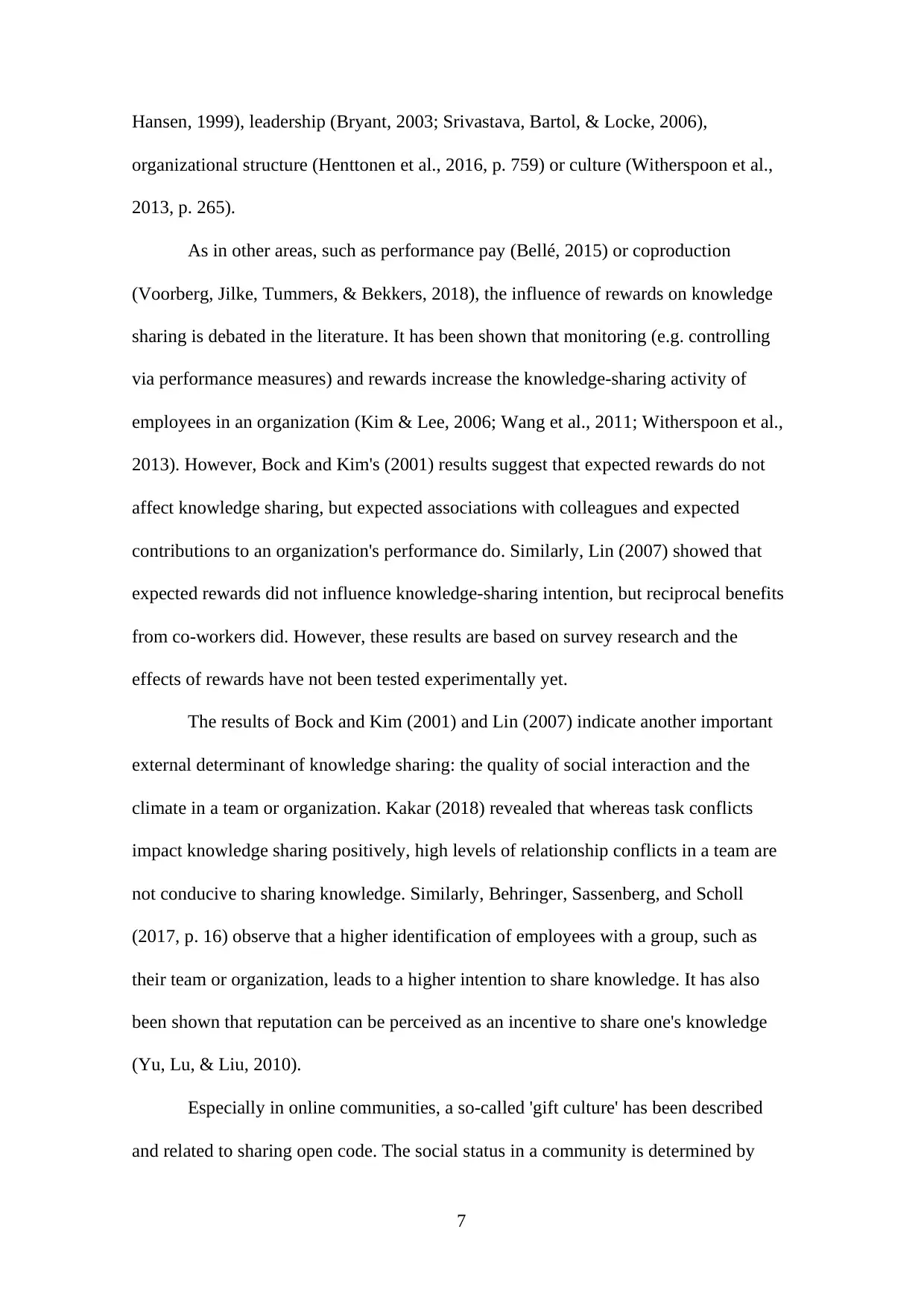
7
Hansen, 1999), leadership (Bryant, 2003; Srivastava, Bartol, & Locke, 2006),
organizational structure (Henttonen et al., 2016, p. 759) or culture (Witherspoon et al.,
2013, p. 265).
As in other areas, such as performance pay (Bellé, 2015) or coproduction
(Voorberg, Jilke, Tummers, & Bekkers, 2018), the influence of rewards on knowledge
sharing is debated in the literature. It has been shown that monitoring (e.g. controlling
via performance measures) and rewards increase the knowledge-sharing activity of
employees in an organization (Kim & Lee, 2006; Wang et al., 2011; Witherspoon et al.,
2013). However, Bock and Kim's (2001) results suggest that expected rewards do not
affect knowledge sharing, but expected associations with colleagues and expected
contributions to an organization's performance do. Similarly, Lin (2007) showed that
expected rewards did not influence knowledge-sharing intention, but reciprocal benefits
from co-workers did. However, these results are based on survey research and the
effects of rewards have not been tested experimentally yet.
The results of Bock and Kim (2001) and Lin (2007) indicate another important
external determinant of knowledge sharing: the quality of social interaction and the
climate in a team or organization. Kakar (2018) revealed that whereas task conflicts
impact knowledge sharing positively, high levels of relationship conflicts in a team are
not conducive to sharing knowledge. Similarly, Behringer, Sassenberg, and Scholl
(2017, p. 16) observe that a higher identification of employees with a group, such as
their team or organization, leads to a higher intention to share knowledge. It has also
been shown that reputation can be perceived as an incentive to share one's knowledge
(Yu, Lu, & Liu, 2010).
Especially in online communities, a so-called 'gift culture' has been described
and related to sharing open code. The social status in a community is determined by
Hansen, 1999), leadership (Bryant, 2003; Srivastava, Bartol, & Locke, 2006),
organizational structure (Henttonen et al., 2016, p. 759) or culture (Witherspoon et al.,
2013, p. 265).
As in other areas, such as performance pay (Bellé, 2015) or coproduction
(Voorberg, Jilke, Tummers, & Bekkers, 2018), the influence of rewards on knowledge
sharing is debated in the literature. It has been shown that monitoring (e.g. controlling
via performance measures) and rewards increase the knowledge-sharing activity of
employees in an organization (Kim & Lee, 2006; Wang et al., 2011; Witherspoon et al.,
2013). However, Bock and Kim's (2001) results suggest that expected rewards do not
affect knowledge sharing, but expected associations with colleagues and expected
contributions to an organization's performance do. Similarly, Lin (2007) showed that
expected rewards did not influence knowledge-sharing intention, but reciprocal benefits
from co-workers did. However, these results are based on survey research and the
effects of rewards have not been tested experimentally yet.
The results of Bock and Kim (2001) and Lin (2007) indicate another important
external determinant of knowledge sharing: the quality of social interaction and the
climate in a team or organization. Kakar (2018) revealed that whereas task conflicts
impact knowledge sharing positively, high levels of relationship conflicts in a team are
not conducive to sharing knowledge. Similarly, Behringer, Sassenberg, and Scholl
(2017, p. 16) observe that a higher identification of employees with a group, such as
their team or organization, leads to a higher intention to share knowledge. It has also
been shown that reputation can be perceived as an incentive to share one's knowledge
(Yu, Lu, & Liu, 2010).
Especially in online communities, a so-called 'gift culture' has been described
and related to sharing open code. The social status in a community is determined by
Secure Best Marks with AI Grader
Need help grading? Try our AI Grader for instant feedback on your assignments.
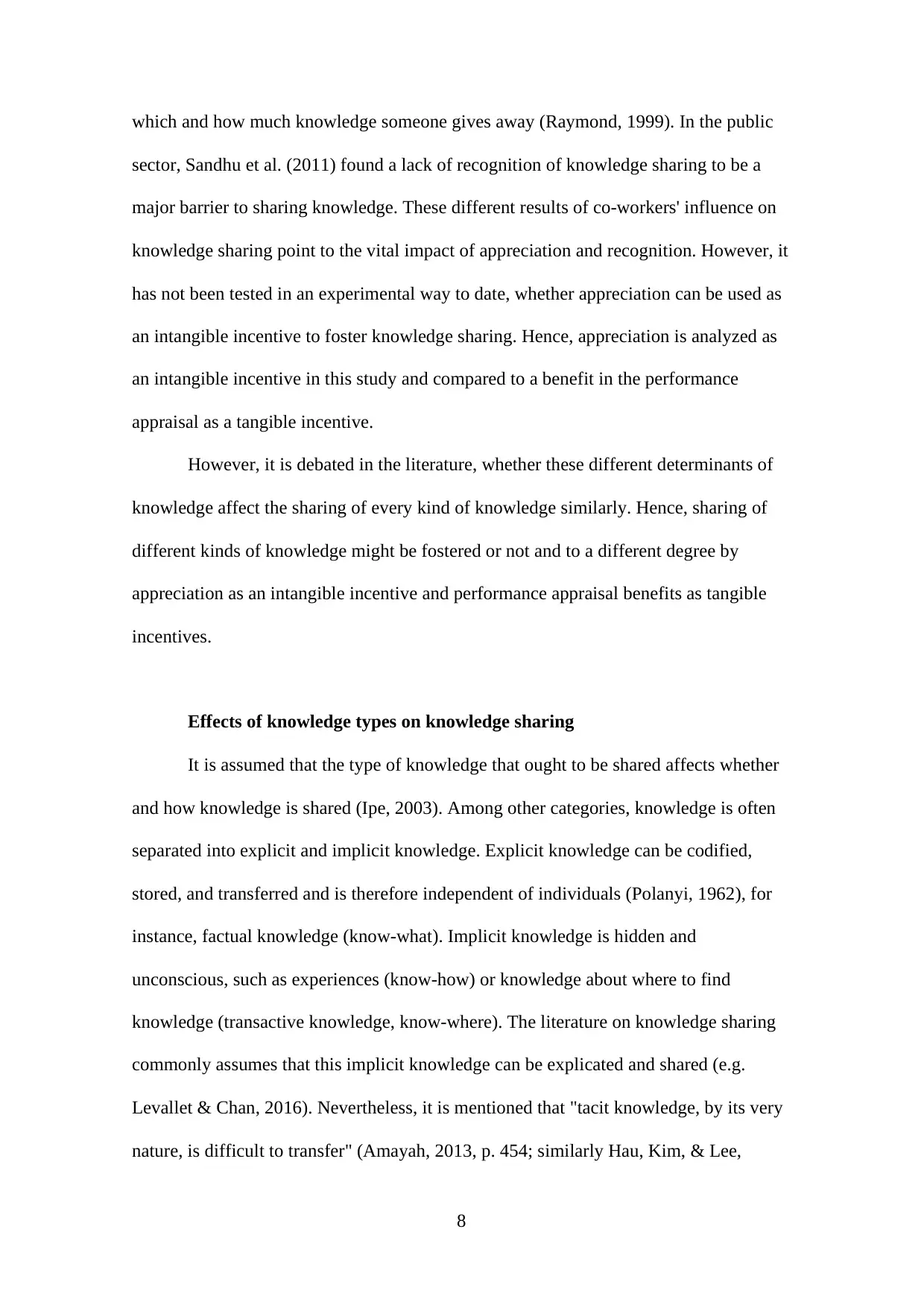
8
which and how much knowledge someone gives away (Raymond, 1999). In the public
sector, Sandhu et al. (2011) found a lack of recognition of knowledge sharing to be a
major barrier to sharing knowledge. These different results of co-workers' influence on
knowledge sharing point to the vital impact of appreciation and recognition. However, it
has not been tested in an experimental way to date, whether appreciation can be used as
an intangible incentive to foster knowledge sharing. Hence, appreciation is analyzed as
an intangible incentive in this study and compared to a benefit in the performance
appraisal as a tangible incentive.
However, it is debated in the literature, whether these different determinants of
knowledge affect the sharing of every kind of knowledge similarly. Hence, sharing of
different kinds of knowledge might be fostered or not and to a different degree by
appreciation as an intangible incentive and performance appraisal benefits as tangible
incentives.
Effects of knowledge types on knowledge sharing
It is assumed that the type of knowledge that ought to be shared affects whether
and how knowledge is shared (Ipe, 2003). Among other categories, knowledge is often
separated into explicit and implicit knowledge. Explicit knowledge can be codified,
stored, and transferred and is therefore independent of individuals (Polanyi, 1962), for
instance, factual knowledge (know-what). Implicit knowledge is hidden and
unconscious, such as experiences (know-how) or knowledge about where to find
knowledge (transactive knowledge, know-where). The literature on knowledge sharing
commonly assumes that this implicit knowledge can be explicated and shared (e.g.
Levallet & Chan, 2016). Nevertheless, it is mentioned that "tacit knowledge, by its very
nature, is difficult to transfer" (Amayah, 2013, p. 454; similarly Hau, Kim, & Lee,
which and how much knowledge someone gives away (Raymond, 1999). In the public
sector, Sandhu et al. (2011) found a lack of recognition of knowledge sharing to be a
major barrier to sharing knowledge. These different results of co-workers' influence on
knowledge sharing point to the vital impact of appreciation and recognition. However, it
has not been tested in an experimental way to date, whether appreciation can be used as
an intangible incentive to foster knowledge sharing. Hence, appreciation is analyzed as
an intangible incentive in this study and compared to a benefit in the performance
appraisal as a tangible incentive.
However, it is debated in the literature, whether these different determinants of
knowledge affect the sharing of every kind of knowledge similarly. Hence, sharing of
different kinds of knowledge might be fostered or not and to a different degree by
appreciation as an intangible incentive and performance appraisal benefits as tangible
incentives.
Effects of knowledge types on knowledge sharing
It is assumed that the type of knowledge that ought to be shared affects whether
and how knowledge is shared (Ipe, 2003). Among other categories, knowledge is often
separated into explicit and implicit knowledge. Explicit knowledge can be codified,
stored, and transferred and is therefore independent of individuals (Polanyi, 1962), for
instance, factual knowledge (know-what). Implicit knowledge is hidden and
unconscious, such as experiences (know-how) or knowledge about where to find
knowledge (transactive knowledge, know-where). The literature on knowledge sharing
commonly assumes that this implicit knowledge can be explicated and shared (e.g.
Levallet & Chan, 2016). Nevertheless, it is mentioned that "tacit knowledge, by its very
nature, is difficult to transfer" (Amayah, 2013, p. 454; similarly Hau, Kim, & Lee,
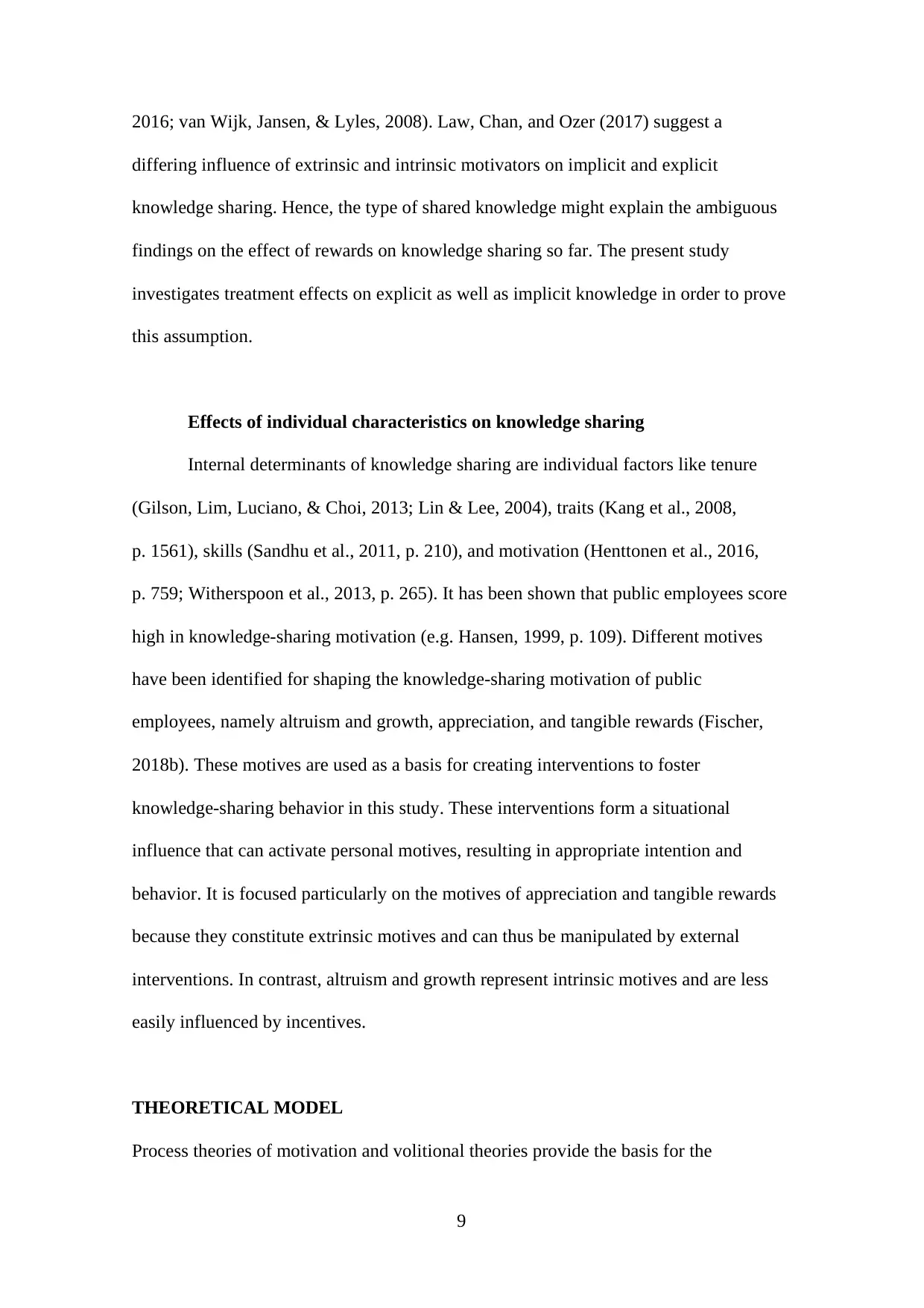
9
2016; van Wijk, Jansen, & Lyles, 2008). Law, Chan, and Ozer (2017) suggest a
differing influence of extrinsic and intrinsic motivators on implicit and explicit
knowledge sharing. Hence, the type of shared knowledge might explain the ambiguous
findings on the effect of rewards on knowledge sharing so far. The present study
investigates treatment effects on explicit as well as implicit knowledge in order to prove
this assumption.
Effects of individual characteristics on knowledge sharing
Internal determinants of knowledge sharing are individual factors like tenure
(Gilson, Lim, Luciano, & Choi, 2013; Lin & Lee, 2004), traits (Kang et al., 2008,
p. 1561), skills (Sandhu et al., 2011, p. 210), and motivation (Henttonen et al., 2016,
p. 759; Witherspoon et al., 2013, p. 265). It has been shown that public employees score
high in knowledge-sharing motivation (e.g. Hansen, 1999, p. 109). Different motives
have been identified for shaping the knowledge-sharing motivation of public
employees, namely altruism and growth, appreciation, and tangible rewards (Fischer,
2018b). These motives are used as a basis for creating interventions to foster
knowledge-sharing behavior in this study. These interventions form a situational
influence that can activate personal motives, resulting in appropriate intention and
behavior. It is focused particularly on the motives of appreciation and tangible rewards
because they constitute extrinsic motives and can thus be manipulated by external
interventions. In contrast, altruism and growth represent intrinsic motives and are less
easily influenced by incentives.
THEORETICAL MODEL
Process theories of motivation and volitional theories provide the basis for the
2016; van Wijk, Jansen, & Lyles, 2008). Law, Chan, and Ozer (2017) suggest a
differing influence of extrinsic and intrinsic motivators on implicit and explicit
knowledge sharing. Hence, the type of shared knowledge might explain the ambiguous
findings on the effect of rewards on knowledge sharing so far. The present study
investigates treatment effects on explicit as well as implicit knowledge in order to prove
this assumption.
Effects of individual characteristics on knowledge sharing
Internal determinants of knowledge sharing are individual factors like tenure
(Gilson, Lim, Luciano, & Choi, 2013; Lin & Lee, 2004), traits (Kang et al., 2008,
p. 1561), skills (Sandhu et al., 2011, p. 210), and motivation (Henttonen et al., 2016,
p. 759; Witherspoon et al., 2013, p. 265). It has been shown that public employees score
high in knowledge-sharing motivation (e.g. Hansen, 1999, p. 109). Different motives
have been identified for shaping the knowledge-sharing motivation of public
employees, namely altruism and growth, appreciation, and tangible rewards (Fischer,
2018b). These motives are used as a basis for creating interventions to foster
knowledge-sharing behavior in this study. These interventions form a situational
influence that can activate personal motives, resulting in appropriate intention and
behavior. It is focused particularly on the motives of appreciation and tangible rewards
because they constitute extrinsic motives and can thus be manipulated by external
interventions. In contrast, altruism and growth represent intrinsic motives and are less
easily influenced by incentives.
THEORETICAL MODEL
Process theories of motivation and volitional theories provide the basis for the
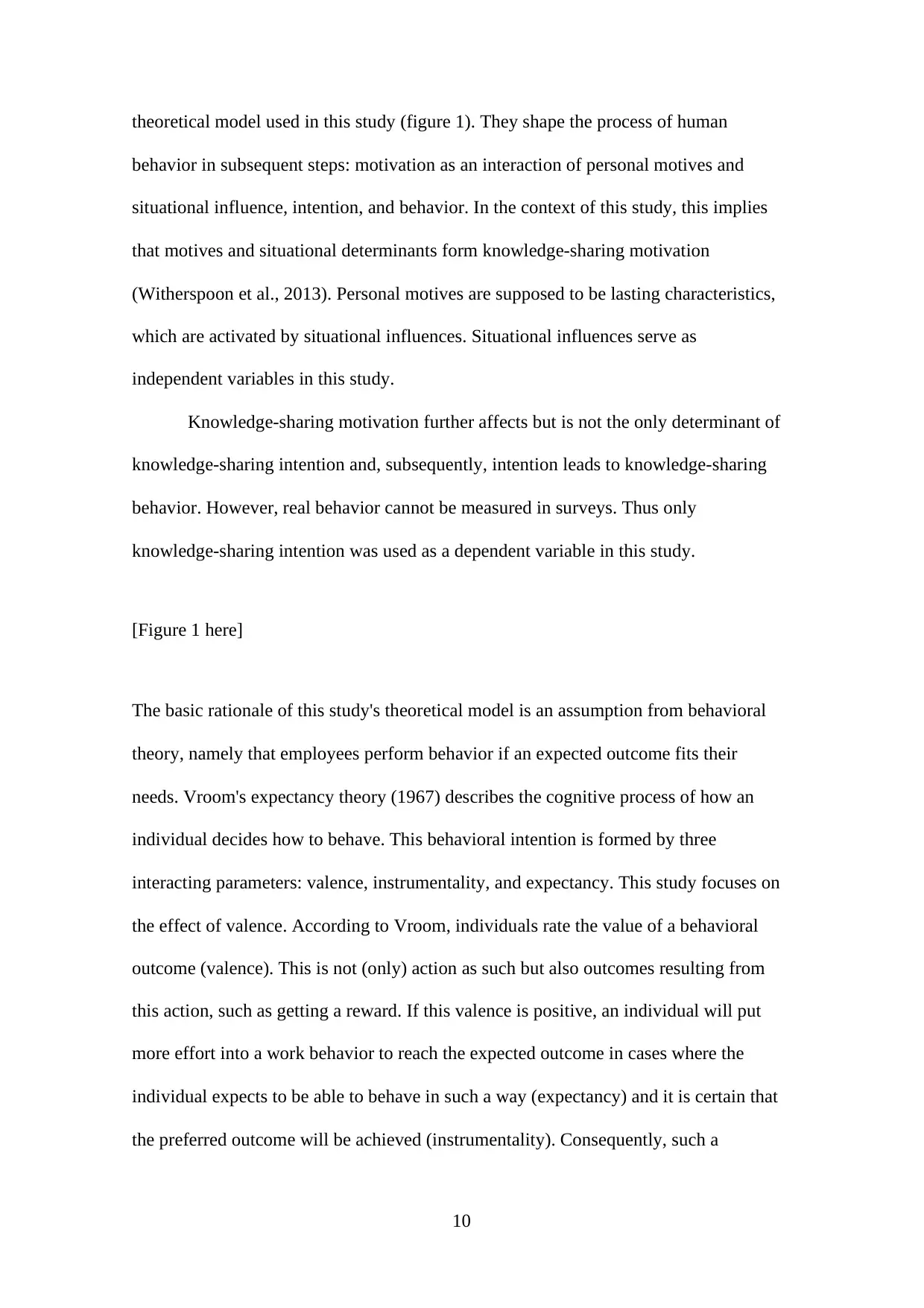
10
theoretical model used in this study (figure 1). They shape the process of human
behavior in subsequent steps: motivation as an interaction of personal motives and
situational influence, intention, and behavior. In the context of this study, this implies
that motives and situational determinants form knowledge-sharing motivation
(Witherspoon et al., 2013). Personal motives are supposed to be lasting characteristics,
which are activated by situational influences. Situational influences serve as
independent variables in this study.
Knowledge-sharing motivation further affects but is not the only determinant of
knowledge-sharing intention and, subsequently, intention leads to knowledge-sharing
behavior. However, real behavior cannot be measured in surveys. Thus only
knowledge-sharing intention was used as a dependent variable in this study.
[Figure 1 here]
The basic rationale of this study's theoretical model is an assumption from behavioral
theory, namely that employees perform behavior if an expected outcome fits their
needs. Vroom's expectancy theory (1967) describes the cognitive process of how an
individual decides how to behave. This behavioral intention is formed by three
interacting parameters: valence, instrumentality, and expectancy. This study focuses on
the effect of valence. According to Vroom, individuals rate the value of a behavioral
outcome (valence). This is not (only) action as such but also outcomes resulting from
this action, such as getting a reward. If this valence is positive, an individual will put
more effort into a work behavior to reach the expected outcome in cases where the
individual expects to be able to behave in such a way (expectancy) and it is certain that
the preferred outcome will be achieved (instrumentality). Consequently, such a
theoretical model used in this study (figure 1). They shape the process of human
behavior in subsequent steps: motivation as an interaction of personal motives and
situational influence, intention, and behavior. In the context of this study, this implies
that motives and situational determinants form knowledge-sharing motivation
(Witherspoon et al., 2013). Personal motives are supposed to be lasting characteristics,
which are activated by situational influences. Situational influences serve as
independent variables in this study.
Knowledge-sharing motivation further affects but is not the only determinant of
knowledge-sharing intention and, subsequently, intention leads to knowledge-sharing
behavior. However, real behavior cannot be measured in surveys. Thus only
knowledge-sharing intention was used as a dependent variable in this study.
[Figure 1 here]
The basic rationale of this study's theoretical model is an assumption from behavioral
theory, namely that employees perform behavior if an expected outcome fits their
needs. Vroom's expectancy theory (1967) describes the cognitive process of how an
individual decides how to behave. This behavioral intention is formed by three
interacting parameters: valence, instrumentality, and expectancy. This study focuses on
the effect of valence. According to Vroom, individuals rate the value of a behavioral
outcome (valence). This is not (only) action as such but also outcomes resulting from
this action, such as getting a reward. If this valence is positive, an individual will put
more effort into a work behavior to reach the expected outcome in cases where the
individual expects to be able to behave in such a way (expectancy) and it is certain that
the preferred outcome will be achieved (instrumentality). Consequently, such a
Paraphrase This Document
Need a fresh take? Get an instant paraphrase of this document with our AI Paraphraser
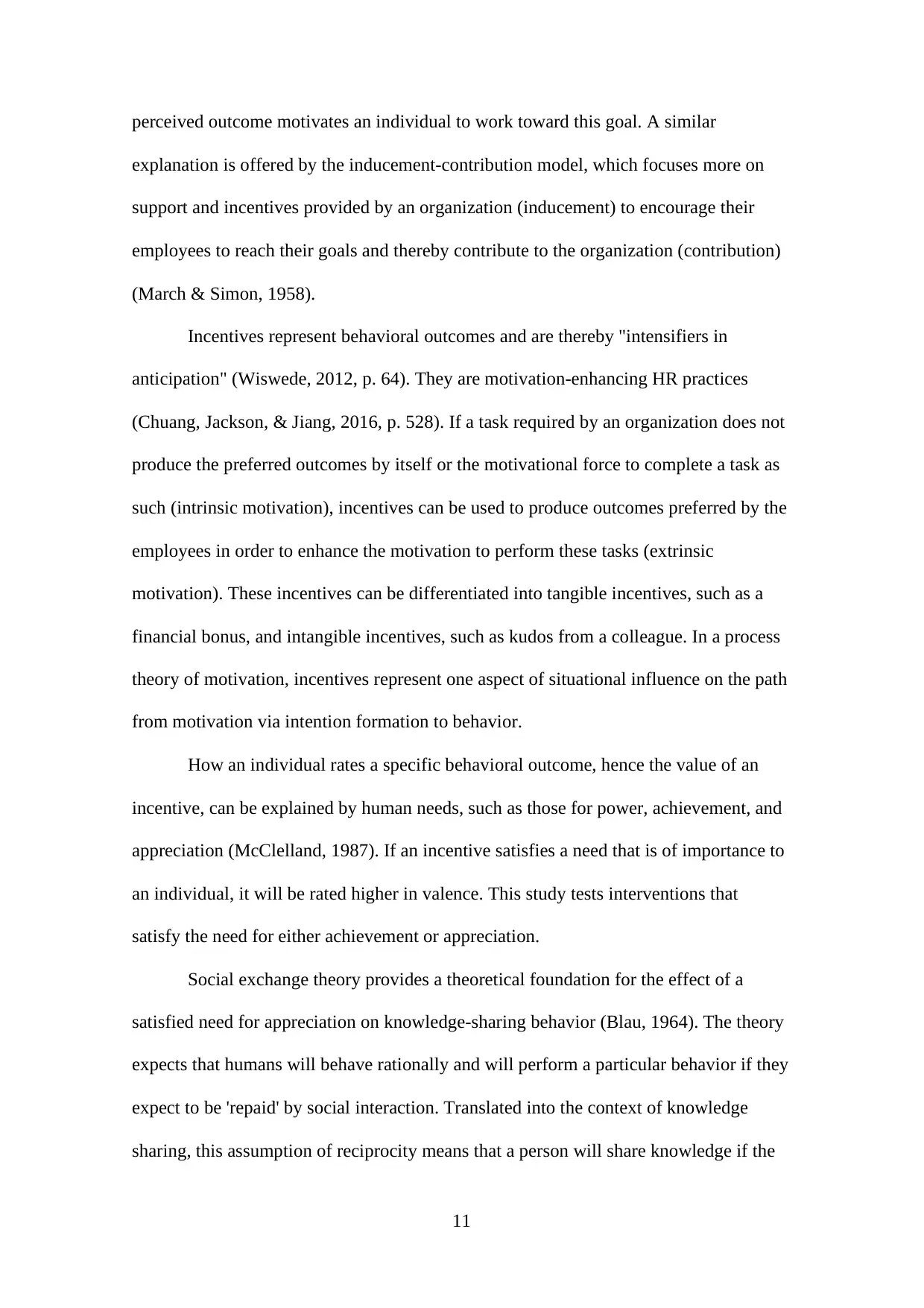
11
perceived outcome motivates an individual to work toward this goal. A similar
explanation is offered by the inducement-contribution model, which focuses more on
support and incentives provided by an organization (inducement) to encourage their
employees to reach their goals and thereby contribute to the organization (contribution)
(March & Simon, 1958).
Incentives represent behavioral outcomes and are thereby "intensifiers in
anticipation" (Wiswede, 2012, p. 64). They are motivation-enhancing HR practices
(Chuang, Jackson, & Jiang, 2016, p. 528). If a task required by an organization does not
produce the preferred outcomes by itself or the motivational force to complete a task as
such (intrinsic motivation), incentives can be used to produce outcomes preferred by the
employees in order to enhance the motivation to perform these tasks (extrinsic
motivation). These incentives can be differentiated into tangible incentives, such as a
financial bonus, and intangible incentives, such as kudos from a colleague. In a process
theory of motivation, incentives represent one aspect of situational influence on the path
from motivation via intention formation to behavior.
How an individual rates a specific behavioral outcome, hence the value of an
incentive, can be explained by human needs, such as those for power, achievement, and
appreciation (McClelland, 1987). If an incentive satisfies a need that is of importance to
an individual, it will be rated higher in valence. This study tests interventions that
satisfy the need for either achievement or appreciation.
Social exchange theory provides a theoretical foundation for the effect of a
satisfied need for appreciation on knowledge-sharing behavior (Blau, 1964). The theory
expects that humans will behave rationally and will perform a particular behavior if they
expect to be 'repaid' by social interaction. Translated into the context of knowledge
sharing, this assumption of reciprocity means that a person will share knowledge if the
perceived outcome motivates an individual to work toward this goal. A similar
explanation is offered by the inducement-contribution model, which focuses more on
support and incentives provided by an organization (inducement) to encourage their
employees to reach their goals and thereby contribute to the organization (contribution)
(March & Simon, 1958).
Incentives represent behavioral outcomes and are thereby "intensifiers in
anticipation" (Wiswede, 2012, p. 64). They are motivation-enhancing HR practices
(Chuang, Jackson, & Jiang, 2016, p. 528). If a task required by an organization does not
produce the preferred outcomes by itself or the motivational force to complete a task as
such (intrinsic motivation), incentives can be used to produce outcomes preferred by the
employees in order to enhance the motivation to perform these tasks (extrinsic
motivation). These incentives can be differentiated into tangible incentives, such as a
financial bonus, and intangible incentives, such as kudos from a colleague. In a process
theory of motivation, incentives represent one aspect of situational influence on the path
from motivation via intention formation to behavior.
How an individual rates a specific behavioral outcome, hence the value of an
incentive, can be explained by human needs, such as those for power, achievement, and
appreciation (McClelland, 1987). If an incentive satisfies a need that is of importance to
an individual, it will be rated higher in valence. This study tests interventions that
satisfy the need for either achievement or appreciation.
Social exchange theory provides a theoretical foundation for the effect of a
satisfied need for appreciation on knowledge-sharing behavior (Blau, 1964). The theory
expects that humans will behave rationally and will perform a particular behavior if they
expect to be 'repaid' by social interaction. Translated into the context of knowledge
sharing, this assumption of reciprocity means that a person will share knowledge if the
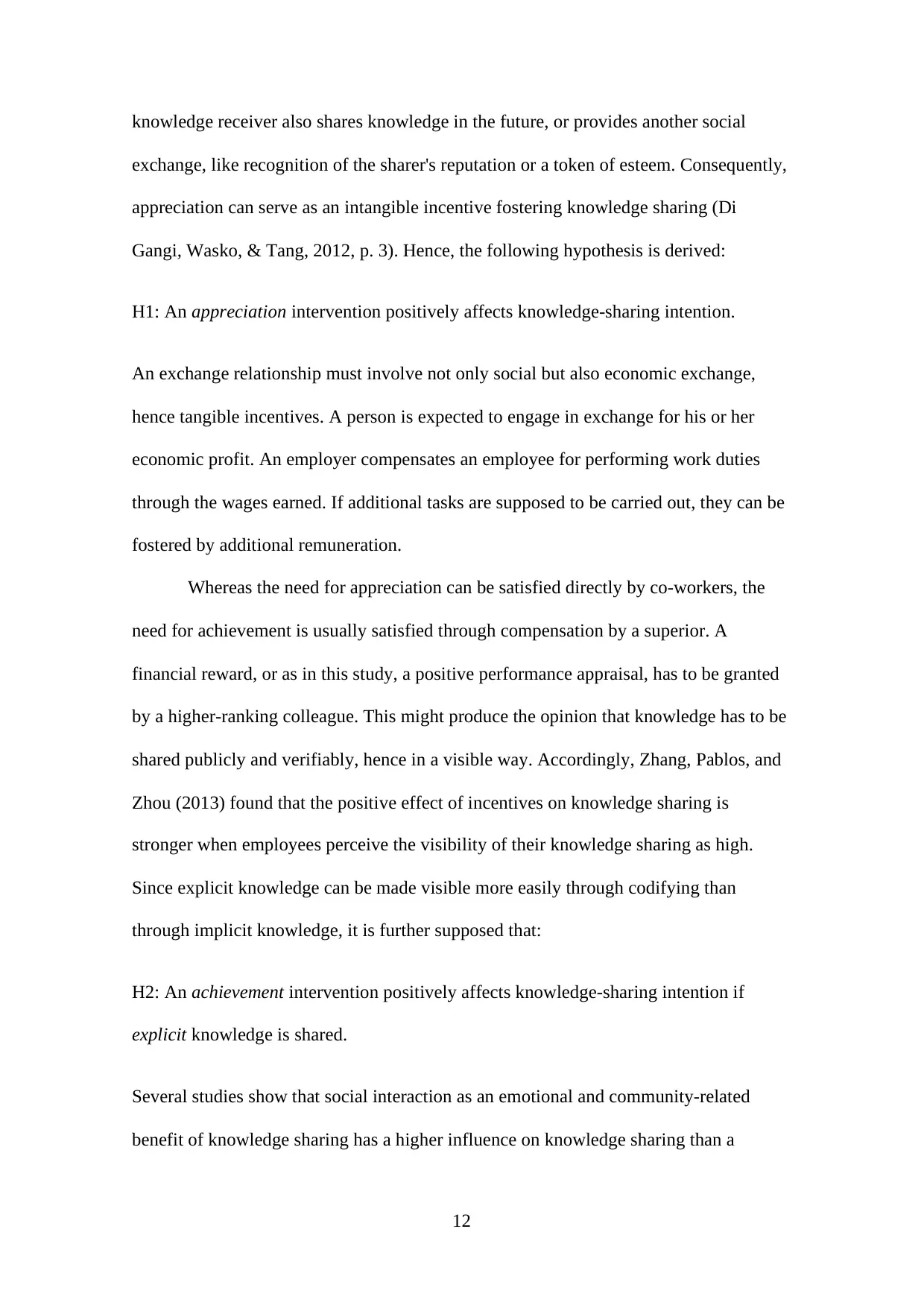
12
knowledge receiver also shares knowledge in the future, or provides another social
exchange, like recognition of the sharer's reputation or a token of esteem. Consequently,
appreciation can serve as an intangible incentive fostering knowledge sharing (Di
Gangi, Wasko, & Tang, 2012, p. 3). Hence, the following hypothesis is derived:
H1: An appreciation intervention positively affects knowledge-sharing intention.
An exchange relationship must involve not only social but also economic exchange,
hence tangible incentives. A person is expected to engage in exchange for his or her
economic profit. An employer compensates an employee for performing work duties
through the wages earned. If additional tasks are supposed to be carried out, they can be
fostered by additional remuneration.
Whereas the need for appreciation can be satisfied directly by co-workers, the
need for achievement is usually satisfied through compensation by a superior. A
financial reward, or as in this study, a positive performance appraisal, has to be granted
by a higher-ranking colleague. This might produce the opinion that knowledge has to be
shared publicly and verifiably, hence in a visible way. Accordingly, Zhang, Pablos, and
Zhou (2013) found that the positive effect of incentives on knowledge sharing is
stronger when employees perceive the visibility of their knowledge sharing as high.
Since explicit knowledge can be made visible more easily through codifying than
through implicit knowledge, it is further supposed that:
H2: An achievement intervention positively affects knowledge-sharing intention if
explicit knowledge is shared.
Several studies show that social interaction as an emotional and community-related
benefit of knowledge sharing has a higher influence on knowledge sharing than a
knowledge receiver also shares knowledge in the future, or provides another social
exchange, like recognition of the sharer's reputation or a token of esteem. Consequently,
appreciation can serve as an intangible incentive fostering knowledge sharing (Di
Gangi, Wasko, & Tang, 2012, p. 3). Hence, the following hypothesis is derived:
H1: An appreciation intervention positively affects knowledge-sharing intention.
An exchange relationship must involve not only social but also economic exchange,
hence tangible incentives. A person is expected to engage in exchange for his or her
economic profit. An employer compensates an employee for performing work duties
through the wages earned. If additional tasks are supposed to be carried out, they can be
fostered by additional remuneration.
Whereas the need for appreciation can be satisfied directly by co-workers, the
need for achievement is usually satisfied through compensation by a superior. A
financial reward, or as in this study, a positive performance appraisal, has to be granted
by a higher-ranking colleague. This might produce the opinion that knowledge has to be
shared publicly and verifiably, hence in a visible way. Accordingly, Zhang, Pablos, and
Zhou (2013) found that the positive effect of incentives on knowledge sharing is
stronger when employees perceive the visibility of their knowledge sharing as high.
Since explicit knowledge can be made visible more easily through codifying than
through implicit knowledge, it is further supposed that:
H2: An achievement intervention positively affects knowledge-sharing intention if
explicit knowledge is shared.
Several studies show that social interaction as an emotional and community-related
benefit of knowledge sharing has a higher influence on knowledge sharing than a
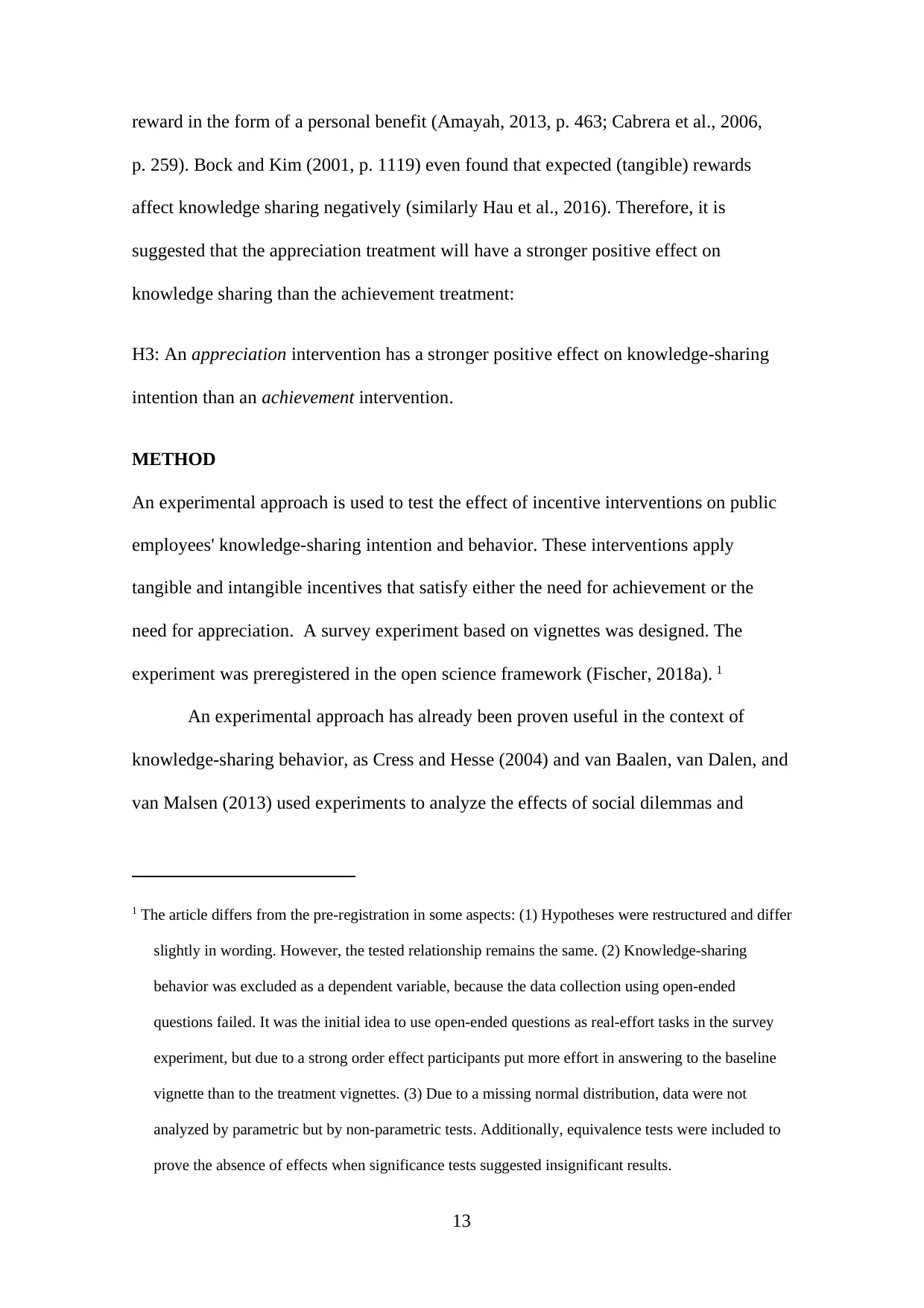
13
reward in the form of a personal benefit (Amayah, 2013, p. 463; Cabrera et al., 2006,
p. 259). Bock and Kim (2001, p. 1119) even found that expected (tangible) rewards
affect knowledge sharing negatively (similarly Hau et al., 2016). Therefore, it is
suggested that the appreciation treatment will have a stronger positive effect on
knowledge sharing than the achievement treatment:
H3: An appreciation intervention has a stronger positive effect on knowledge-sharing
intention than an achievement intervention.
METHOD
An experimental approach is used to test the effect of incentive interventions on public
employees' knowledge-sharing intention and behavior. These interventions apply
tangible and intangible incentives that satisfy either the need for achievement or the
need for appreciation. A survey experiment based on vignettes was designed. The
experiment was preregistered in the open science framework (Fischer, 2018a). 1
An experimental approach has already been proven useful in the context of
knowledge-sharing behavior, as Cress and Hesse (2004) and van Baalen, van Dalen, and
van Malsen (2013) used experiments to analyze the effects of social dilemmas and
1 The article differs from the pre-registration in some aspects: (1) Hypotheses were restructured and differ
slightly in wording. However, the tested relationship remains the same. (2) Knowledge-sharing
behavior was excluded as a dependent variable, because the data collection using open-ended
questions failed. It was the initial idea to use open-ended questions as real-effort tasks in the survey
experiment, but due to a strong order effect participants put more effort in answering to the baseline
vignette than to the treatment vignettes. (3) Due to a missing normal distribution, data were not
analyzed by parametric but by non-parametric tests. Additionally, equivalence tests were included to
prove the absence of effects when significance tests suggested insignificant results.
reward in the form of a personal benefit (Amayah, 2013, p. 463; Cabrera et al., 2006,
p. 259). Bock and Kim (2001, p. 1119) even found that expected (tangible) rewards
affect knowledge sharing negatively (similarly Hau et al., 2016). Therefore, it is
suggested that the appreciation treatment will have a stronger positive effect on
knowledge sharing than the achievement treatment:
H3: An appreciation intervention has a stronger positive effect on knowledge-sharing
intention than an achievement intervention.
METHOD
An experimental approach is used to test the effect of incentive interventions on public
employees' knowledge-sharing intention and behavior. These interventions apply
tangible and intangible incentives that satisfy either the need for achievement or the
need for appreciation. A survey experiment based on vignettes was designed. The
experiment was preregistered in the open science framework (Fischer, 2018a). 1
An experimental approach has already been proven useful in the context of
knowledge-sharing behavior, as Cress and Hesse (2004) and van Baalen, van Dalen, and
van Malsen (2013) used experiments to analyze the effects of social dilemmas and
1 The article differs from the pre-registration in some aspects: (1) Hypotheses were restructured and differ
slightly in wording. However, the tested relationship remains the same. (2) Knowledge-sharing
behavior was excluded as a dependent variable, because the data collection using open-ended
questions failed. It was the initial idea to use open-ended questions as real-effort tasks in the survey
experiment, but due to a strong order effect participants put more effort in answering to the baseline
vignette than to the treatment vignettes. (3) Due to a missing normal distribution, data were not
analyzed by parametric but by non-parametric tests. Additionally, equivalence tests were included to
prove the absence of effects when significance tests suggested insignificant results.
Secure Best Marks with AI Grader
Need help grading? Try our AI Grader for instant feedback on your assignments.
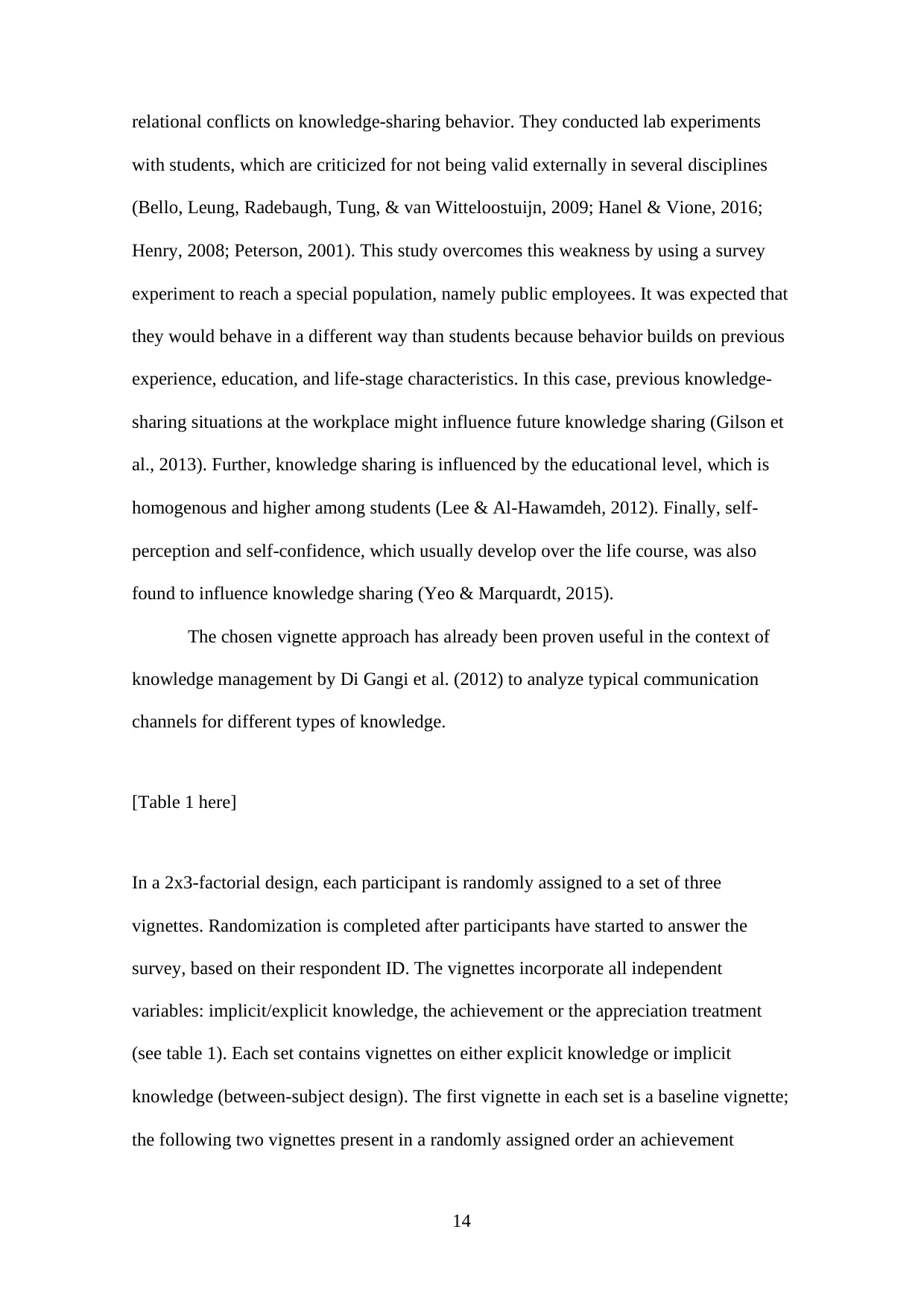
14
relational conflicts on knowledge-sharing behavior. They conducted lab experiments
with students, which are criticized for not being valid externally in several disciplines
(Bello, Leung, Radebaugh, Tung, & van Witteloostuijn, 2009; Hanel & Vione, 2016;
Henry, 2008; Peterson, 2001). This study overcomes this weakness by using a survey
experiment to reach a special population, namely public employees. It was expected that
they would behave in a different way than students because behavior builds on previous
experience, education, and life-stage characteristics. In this case, previous knowledge-
sharing situations at the workplace might influence future knowledge sharing (Gilson et
al., 2013). Further, knowledge sharing is influenced by the educational level, which is
homogenous and higher among students (Lee & Al-Hawamdeh, 2012). Finally, self-
perception and self-confidence, which usually develop over the life course, was also
found to influence knowledge sharing (Yeo & Marquardt, 2015).
The chosen vignette approach has already been proven useful in the context of
knowledge management by Di Gangi et al. (2012) to analyze typical communication
channels for different types of knowledge.
[Table 1 here]
In a 2x3-factorial design, each participant is randomly assigned to a set of three
vignettes. Randomization is completed after participants have started to answer the
survey, based on their respondent ID. The vignettes incorporate all independent
variables: implicit/explicit knowledge, the achievement or the appreciation treatment
(see table 1). Each set contains vignettes on either explicit knowledge or implicit
knowledge (between-subject design). The first vignette in each set is a baseline vignette;
the following two vignettes present in a randomly assigned order an achievement
relational conflicts on knowledge-sharing behavior. They conducted lab experiments
with students, which are criticized for not being valid externally in several disciplines
(Bello, Leung, Radebaugh, Tung, & van Witteloostuijn, 2009; Hanel & Vione, 2016;
Henry, 2008; Peterson, 2001). This study overcomes this weakness by using a survey
experiment to reach a special population, namely public employees. It was expected that
they would behave in a different way than students because behavior builds on previous
experience, education, and life-stage characteristics. In this case, previous knowledge-
sharing situations at the workplace might influence future knowledge sharing (Gilson et
al., 2013). Further, knowledge sharing is influenced by the educational level, which is
homogenous and higher among students (Lee & Al-Hawamdeh, 2012). Finally, self-
perception and self-confidence, which usually develop over the life course, was also
found to influence knowledge sharing (Yeo & Marquardt, 2015).
The chosen vignette approach has already been proven useful in the context of
knowledge management by Di Gangi et al. (2012) to analyze typical communication
channels for different types of knowledge.
[Table 1 here]
In a 2x3-factorial design, each participant is randomly assigned to a set of three
vignettes. Randomization is completed after participants have started to answer the
survey, based on their respondent ID. The vignettes incorporate all independent
variables: implicit/explicit knowledge, the achievement or the appreciation treatment
(see table 1). Each set contains vignettes on either explicit knowledge or implicit
knowledge (between-subject design). The first vignette in each set is a baseline vignette;
the following two vignettes present in a randomly assigned order an achievement
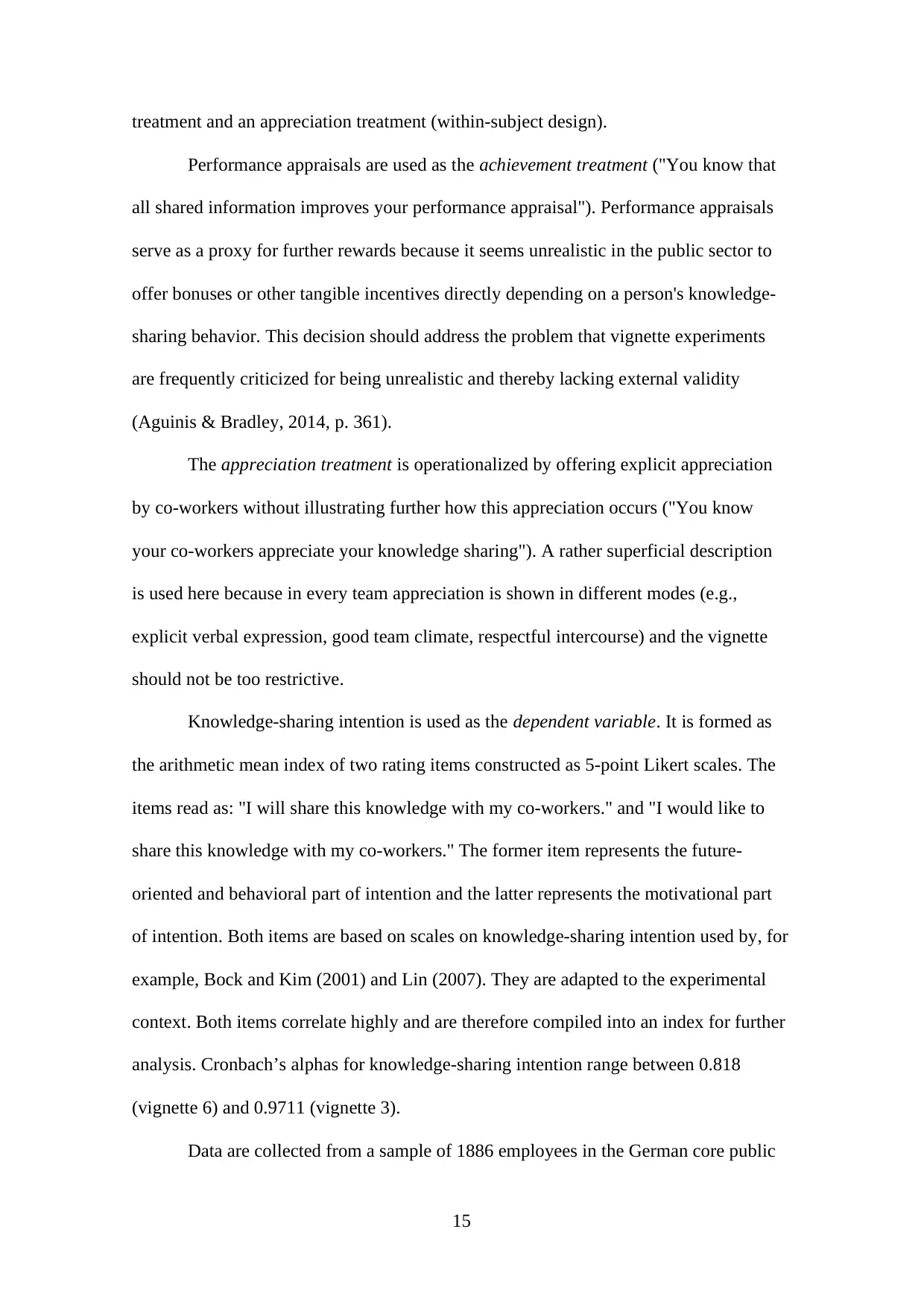
15
treatment and an appreciation treatment (within-subject design).
Performance appraisals are used as the achievement treatment ("You know that
all shared information improves your performance appraisal"). Performance appraisals
serve as a proxy for further rewards because it seems unrealistic in the public sector to
offer bonuses or other tangible incentives directly depending on a person's knowledge-
sharing behavior. This decision should address the problem that vignette experiments
are frequently criticized for being unrealistic and thereby lacking external validity
(Aguinis & Bradley, 2014, p. 361).
The appreciation treatment is operationalized by offering explicit appreciation
by co-workers without illustrating further how this appreciation occurs ("You know
your co-workers appreciate your knowledge sharing"). A rather superficial description
is used here because in every team appreciation is shown in different modes (e.g.,
explicit verbal expression, good team climate, respectful intercourse) and the vignette
should not be too restrictive.
Knowledge-sharing intention is used as the dependent variable. It is formed as
the arithmetic mean index of two rating items constructed as 5-point Likert scales. The
items read as: "I will share this knowledge with my co-workers." and "I would like to
share this knowledge with my co-workers." The former item represents the future-
oriented and behavioral part of intention and the latter represents the motivational part
of intention. Both items are based on scales on knowledge-sharing intention used by, for
example, Bock and Kim (2001) and Lin (2007). They are adapted to the experimental
context. Both items correlate highly and are therefore compiled into an index for further
analysis. Cronbach’s alphas for knowledge-sharing intention range between 0.818
(vignette 6) and 0.9711 (vignette 3).
Data are collected from a sample of 1886 employees in the German core public
treatment and an appreciation treatment (within-subject design).
Performance appraisals are used as the achievement treatment ("You know that
all shared information improves your performance appraisal"). Performance appraisals
serve as a proxy for further rewards because it seems unrealistic in the public sector to
offer bonuses or other tangible incentives directly depending on a person's knowledge-
sharing behavior. This decision should address the problem that vignette experiments
are frequently criticized for being unrealistic and thereby lacking external validity
(Aguinis & Bradley, 2014, p. 361).
The appreciation treatment is operationalized by offering explicit appreciation
by co-workers without illustrating further how this appreciation occurs ("You know
your co-workers appreciate your knowledge sharing"). A rather superficial description
is used here because in every team appreciation is shown in different modes (e.g.,
explicit verbal expression, good team climate, respectful intercourse) and the vignette
should not be too restrictive.
Knowledge-sharing intention is used as the dependent variable. It is formed as
the arithmetic mean index of two rating items constructed as 5-point Likert scales. The
items read as: "I will share this knowledge with my co-workers." and "I would like to
share this knowledge with my co-workers." The former item represents the future-
oriented and behavioral part of intention and the latter represents the motivational part
of intention. Both items are based on scales on knowledge-sharing intention used by, for
example, Bock and Kim (2001) and Lin (2007). They are adapted to the experimental
context. Both items correlate highly and are therefore compiled into an index for further
analysis. Cronbach’s alphas for knowledge-sharing intention range between 0.818
(vignette 6) and 0.9711 (vignette 3).
Data are collected from a sample of 1886 employees in the German core public
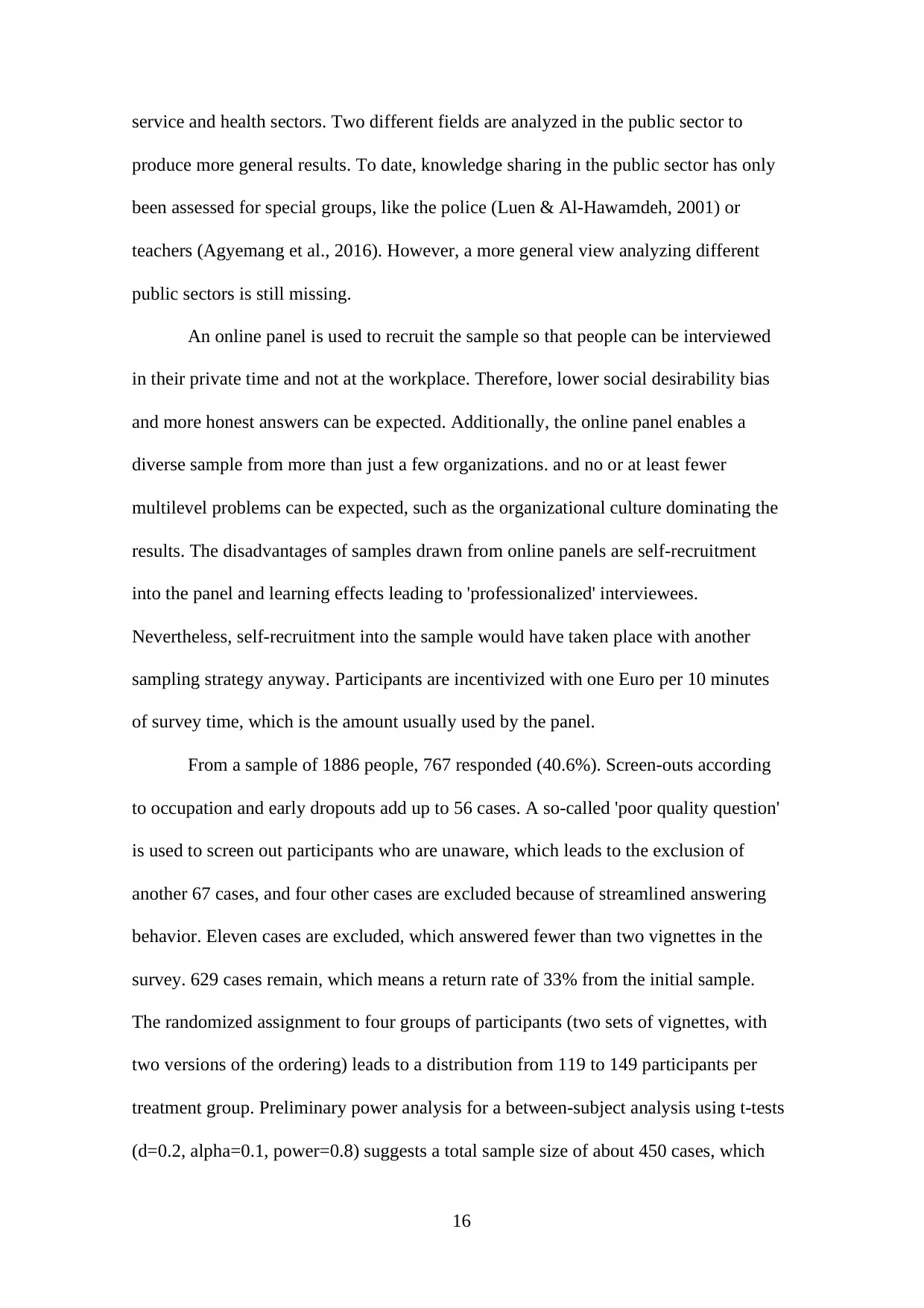
16
service and health sectors. Two different fields are analyzed in the public sector to
produce more general results. To date, knowledge sharing in the public sector has only
been assessed for special groups, like the police (Luen & Al-Hawamdeh, 2001) or
teachers (Agyemang et al., 2016). However, a more general view analyzing different
public sectors is still missing.
An online panel is used to recruit the sample so that people can be interviewed
in their private time and not at the workplace. Therefore, lower social desirability bias
and more honest answers can be expected. Additionally, the online panel enables a
diverse sample from more than just a few organizations. and no or at least fewer
multilevel problems can be expected, such as the organizational culture dominating the
results. The disadvantages of samples drawn from online panels are self-recruitment
into the panel and learning effects leading to 'professionalized' interviewees.
Nevertheless, self-recruitment into the sample would have taken place with another
sampling strategy anyway. Participants are incentivized with one Euro per 10 minutes
of survey time, which is the amount usually used by the panel.
From a sample of 1886 people, 767 responded (40.6%). Screen-outs according
to occupation and early dropouts add up to 56 cases. A so-called 'poor quality question'
is used to screen out participants who are unaware, which leads to the exclusion of
another 67 cases, and four other cases are excluded because of streamlined answering
behavior. Eleven cases are excluded, which answered fewer than two vignettes in the
survey. 629 cases remain, which means a return rate of 33% from the initial sample.
The randomized assignment to four groups of participants (two sets of vignettes, with
two versions of the ordering) leads to a distribution from 119 to 149 participants per
treatment group. Preliminary power analysis for a between-subject analysis using t-tests
(d=0.2, alpha=0.1, power=0.8) suggests a total sample size of about 450 cases, which
service and health sectors. Two different fields are analyzed in the public sector to
produce more general results. To date, knowledge sharing in the public sector has only
been assessed for special groups, like the police (Luen & Al-Hawamdeh, 2001) or
teachers (Agyemang et al., 2016). However, a more general view analyzing different
public sectors is still missing.
An online panel is used to recruit the sample so that people can be interviewed
in their private time and not at the workplace. Therefore, lower social desirability bias
and more honest answers can be expected. Additionally, the online panel enables a
diverse sample from more than just a few organizations. and no or at least fewer
multilevel problems can be expected, such as the organizational culture dominating the
results. The disadvantages of samples drawn from online panels are self-recruitment
into the panel and learning effects leading to 'professionalized' interviewees.
Nevertheless, self-recruitment into the sample would have taken place with another
sampling strategy anyway. Participants are incentivized with one Euro per 10 minutes
of survey time, which is the amount usually used by the panel.
From a sample of 1886 people, 767 responded (40.6%). Screen-outs according
to occupation and early dropouts add up to 56 cases. A so-called 'poor quality question'
is used to screen out participants who are unaware, which leads to the exclusion of
another 67 cases, and four other cases are excluded because of streamlined answering
behavior. Eleven cases are excluded, which answered fewer than two vignettes in the
survey. 629 cases remain, which means a return rate of 33% from the initial sample.
The randomized assignment to four groups of participants (two sets of vignettes, with
two versions of the ordering) leads to a distribution from 119 to 149 participants per
treatment group. Preliminary power analysis for a between-subject analysis using t-tests
(d=0.2, alpha=0.1, power=0.8) suggests a total sample size of about 450 cases, which
Paraphrase This Document
Need a fresh take? Get an instant paraphrase of this document with our AI Paraphraser
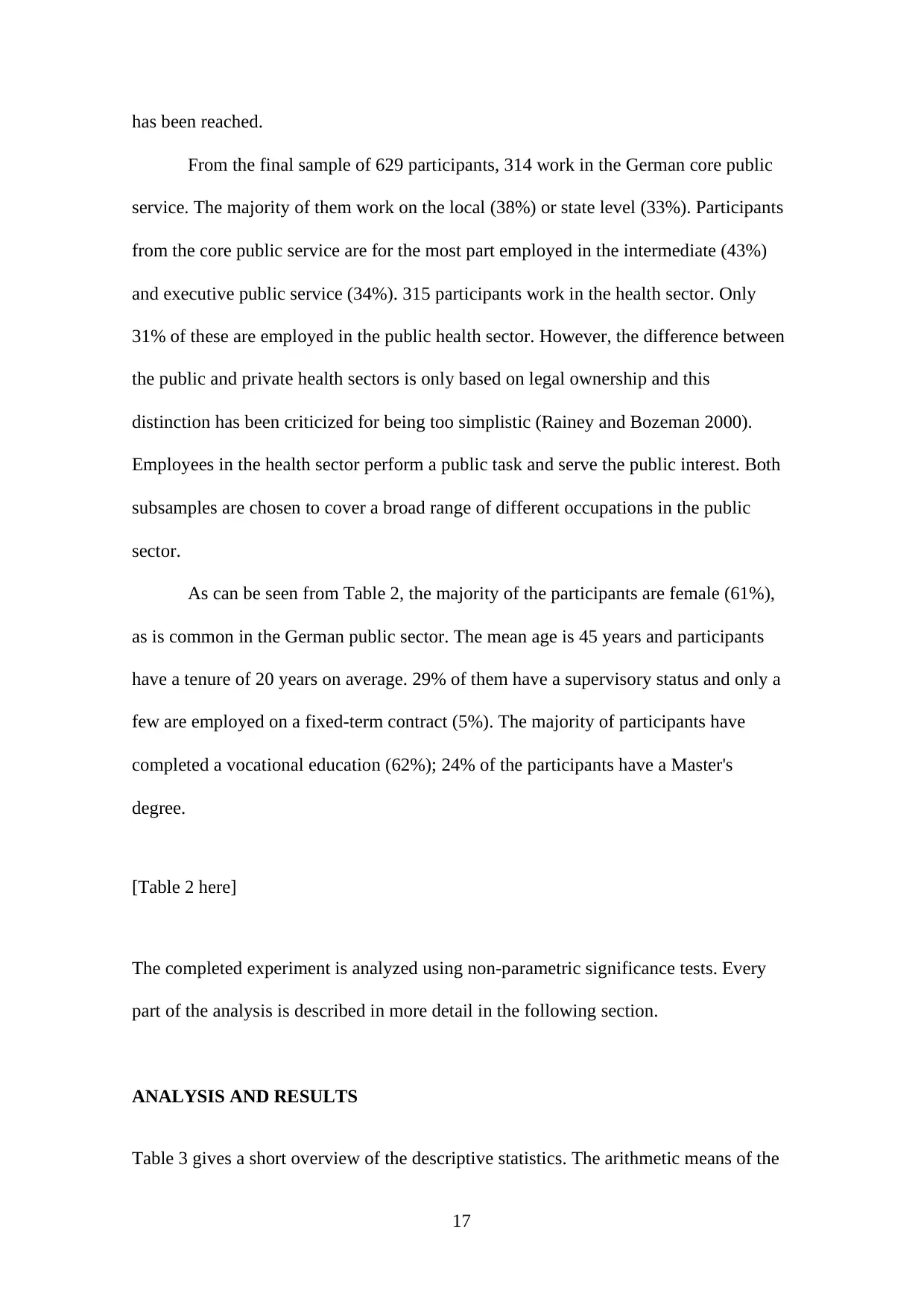
17
has been reached.
From the final sample of 629 participants, 314 work in the German core public
service. The majority of them work on the local (38%) or state level (33%). Participants
from the core public service are for the most part employed in the intermediate (43%)
and executive public service (34%). 315 participants work in the health sector. Only
31% of these are employed in the public health sector. However, the difference between
the public and private health sectors is only based on legal ownership and this
distinction has been criticized for being too simplistic (Rainey and Bozeman 2000).
Employees in the health sector perform a public task and serve the public interest. Both
subsamples are chosen to cover a broad range of different occupations in the public
sector.
As can be seen from Table 2, the majority of the participants are female (61%),
as is common in the German public sector. The mean age is 45 years and participants
have a tenure of 20 years on average. 29% of them have a supervisory status and only a
few are employed on a fixed-term contract (5%). The majority of participants have
completed a vocational education (62%); 24% of the participants have a Master's
degree.
[Table 2 here]
The completed experiment is analyzed using non-parametric significance tests. Every
part of the analysis is described in more detail in the following section.
ANALYSIS AND RESULTS
Table 3 gives a short overview of the descriptive statistics. The arithmetic means of the
has been reached.
From the final sample of 629 participants, 314 work in the German core public
service. The majority of them work on the local (38%) or state level (33%). Participants
from the core public service are for the most part employed in the intermediate (43%)
and executive public service (34%). 315 participants work in the health sector. Only
31% of these are employed in the public health sector. However, the difference between
the public and private health sectors is only based on legal ownership and this
distinction has been criticized for being too simplistic (Rainey and Bozeman 2000).
Employees in the health sector perform a public task and serve the public interest. Both
subsamples are chosen to cover a broad range of different occupations in the public
sector.
As can be seen from Table 2, the majority of the participants are female (61%),
as is common in the German public sector. The mean age is 45 years and participants
have a tenure of 20 years on average. 29% of them have a supervisory status and only a
few are employed on a fixed-term contract (5%). The majority of participants have
completed a vocational education (62%); 24% of the participants have a Master's
degree.
[Table 2 here]
The completed experiment is analyzed using non-parametric significance tests. Every
part of the analysis is described in more detail in the following section.
ANALYSIS AND RESULTS
Table 3 gives a short overview of the descriptive statistics. The arithmetic means of the
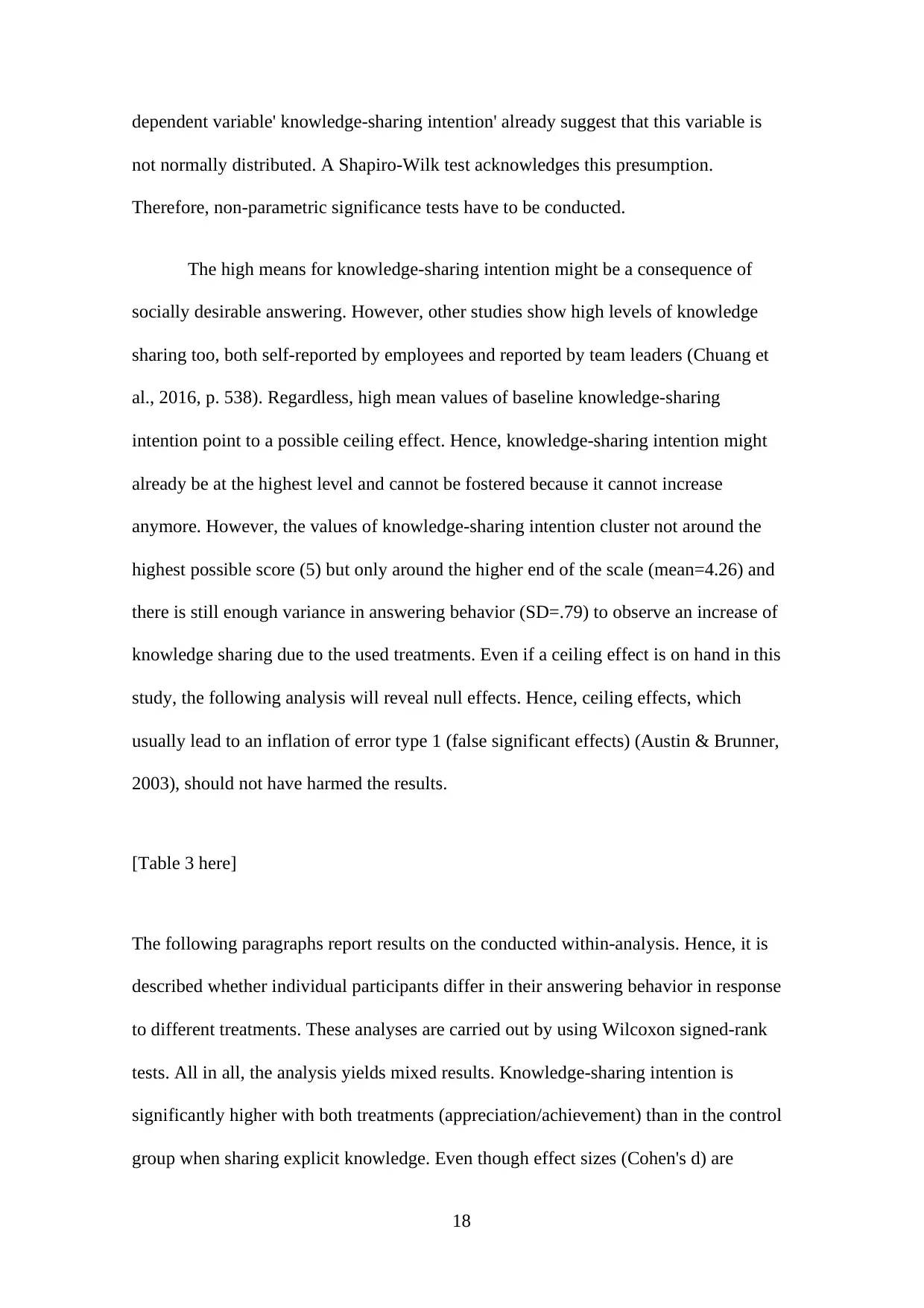
18
dependent variable' knowledge-sharing intention' already suggest that this variable is
not normally distributed. A Shapiro-Wilk test acknowledges this presumption.
Therefore, non-parametric significance tests have to be conducted.
The high means for knowledge-sharing intention might be a consequence of
socially desirable answering. However, other studies show high levels of knowledge
sharing too, both self-reported by employees and reported by team leaders (Chuang et
al., 2016, p. 538). Regardless, high mean values of baseline knowledge-sharing
intention point to a possible ceiling effect. Hence, knowledge-sharing intention might
already be at the highest level and cannot be fostered because it cannot increase
anymore. However, the values of knowledge-sharing intention cluster not around the
highest possible score (5) but only around the higher end of the scale (mean=4.26) and
there is still enough variance in answering behavior (SD=.79) to observe an increase of
knowledge sharing due to the used treatments. Even if a ceiling effect is on hand in this
study, the following analysis will reveal null effects. Hence, ceiling effects, which
usually lead to an inflation of error type 1 (false significant effects) (Austin & Brunner,
2003), should not have harmed the results.
[Table 3 here]
The following paragraphs report results on the conducted within-analysis. Hence, it is
described whether individual participants differ in their answering behavior in response
to different treatments. These analyses are carried out by using Wilcoxon signed-rank
tests. All in all, the analysis yields mixed results. Knowledge-sharing intention is
significantly higher with both treatments (appreciation/achievement) than in the control
group when sharing explicit knowledge. Even though effect sizes (Cohen's d) are
dependent variable' knowledge-sharing intention' already suggest that this variable is
not normally distributed. A Shapiro-Wilk test acknowledges this presumption.
Therefore, non-parametric significance tests have to be conducted.
The high means for knowledge-sharing intention might be a consequence of
socially desirable answering. However, other studies show high levels of knowledge
sharing too, both self-reported by employees and reported by team leaders (Chuang et
al., 2016, p. 538). Regardless, high mean values of baseline knowledge-sharing
intention point to a possible ceiling effect. Hence, knowledge-sharing intention might
already be at the highest level and cannot be fostered because it cannot increase
anymore. However, the values of knowledge-sharing intention cluster not around the
highest possible score (5) but only around the higher end of the scale (mean=4.26) and
there is still enough variance in answering behavior (SD=.79) to observe an increase of
knowledge sharing due to the used treatments. Even if a ceiling effect is on hand in this
study, the following analysis will reveal null effects. Hence, ceiling effects, which
usually lead to an inflation of error type 1 (false significant effects) (Austin & Brunner,
2003), should not have harmed the results.
[Table 3 here]
The following paragraphs report results on the conducted within-analysis. Hence, it is
described whether individual participants differ in their answering behavior in response
to different treatments. These analyses are carried out by using Wilcoxon signed-rank
tests. All in all, the analysis yields mixed results. Knowledge-sharing intention is
significantly higher with both treatments (appreciation/achievement) than in the control
group when sharing explicit knowledge. Even though effect sizes (Cohen's d) are
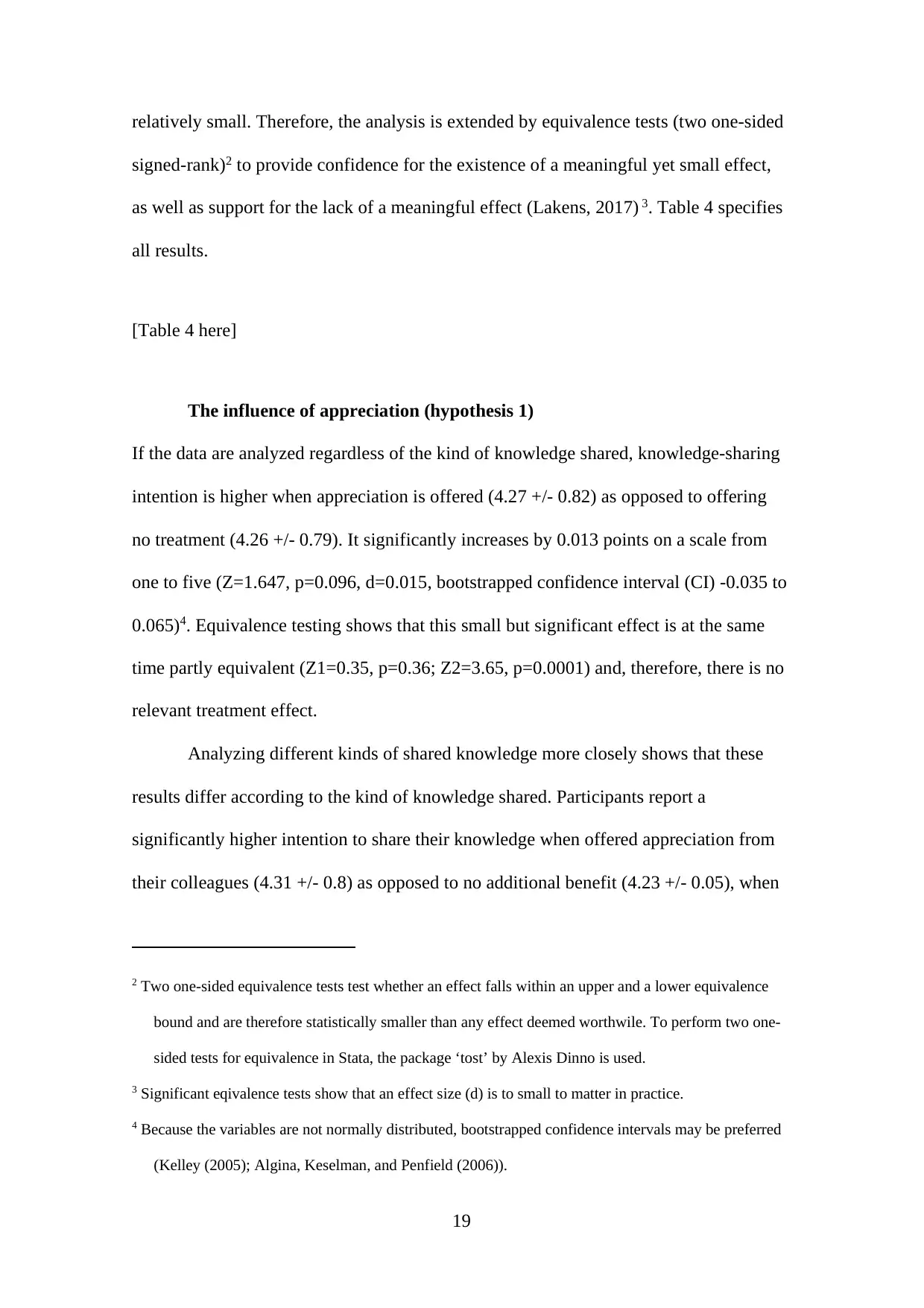
19
relatively small. Therefore, the analysis is extended by equivalence tests (two one-sided
signed-rank)2 to provide confidence for the existence of a meaningful yet small effect,
as well as support for the lack of a meaningful effect (Lakens, 2017) 3. Table 4 specifies
all results.
[Table 4 here]
The influence of appreciation (hypothesis 1)
If the data are analyzed regardless of the kind of knowledge shared, knowledge-sharing
intention is higher when appreciation is offered (4.27 +/- 0.82) as opposed to offering
no treatment (4.26 +/- 0.79). It significantly increases by 0.013 points on a scale from
one to five (Z=1.647, p=0.096, d=0.015, bootstrapped confidence interval (CI) -0.035 to
0.065)4. Equivalence testing shows that this small but significant effect is at the same
time partly equivalent (Z1=0.35, p=0.36; Z2=3.65, p=0.0001) and, therefore, there is no
relevant treatment effect.
Analyzing different kinds of shared knowledge more closely shows that these
results differ according to the kind of knowledge shared. Participants report a
significantly higher intention to share their knowledge when offered appreciation from
their colleagues (4.31 +/- 0.8) as opposed to no additional benefit (4.23 +/- 0.05), when
2 Two one-sided equivalence tests test whether an effect falls within an upper and a lower equivalence
bound and are therefore statistically smaller than any effect deemed worthwile. To perform two one-
sided tests for equivalence in Stata, the package ‘tost’ by Alexis Dinno is used.
3 Significant eqivalence tests show that an effect size (d) is to small to matter in practice.
4 Because the variables are not normally distributed, bootstrapped confidence intervals may be preferred
(Kelley (2005); Algina, Keselman, and Penfield (2006)).
relatively small. Therefore, the analysis is extended by equivalence tests (two one-sided
signed-rank)2 to provide confidence for the existence of a meaningful yet small effect,
as well as support for the lack of a meaningful effect (Lakens, 2017) 3. Table 4 specifies
all results.
[Table 4 here]
The influence of appreciation (hypothesis 1)
If the data are analyzed regardless of the kind of knowledge shared, knowledge-sharing
intention is higher when appreciation is offered (4.27 +/- 0.82) as opposed to offering
no treatment (4.26 +/- 0.79). It significantly increases by 0.013 points on a scale from
one to five (Z=1.647, p=0.096, d=0.015, bootstrapped confidence interval (CI) -0.035 to
0.065)4. Equivalence testing shows that this small but significant effect is at the same
time partly equivalent (Z1=0.35, p=0.36; Z2=3.65, p=0.0001) and, therefore, there is no
relevant treatment effect.
Analyzing different kinds of shared knowledge more closely shows that these
results differ according to the kind of knowledge shared. Participants report a
significantly higher intention to share their knowledge when offered appreciation from
their colleagues (4.31 +/- 0.8) as opposed to no additional benefit (4.23 +/- 0.05), when
2 Two one-sided equivalence tests test whether an effect falls within an upper and a lower equivalence
bound and are therefore statistically smaller than any effect deemed worthwile. To perform two one-
sided tests for equivalence in Stata, the package ‘tost’ by Alexis Dinno is used.
3 Significant eqivalence tests show that an effect size (d) is to small to matter in practice.
4 Because the variables are not normally distributed, bootstrapped confidence intervals may be preferred
(Kelley (2005); Algina, Keselman, and Penfield (2006)).
Secure Best Marks with AI Grader
Need help grading? Try our AI Grader for instant feedback on your assignments.
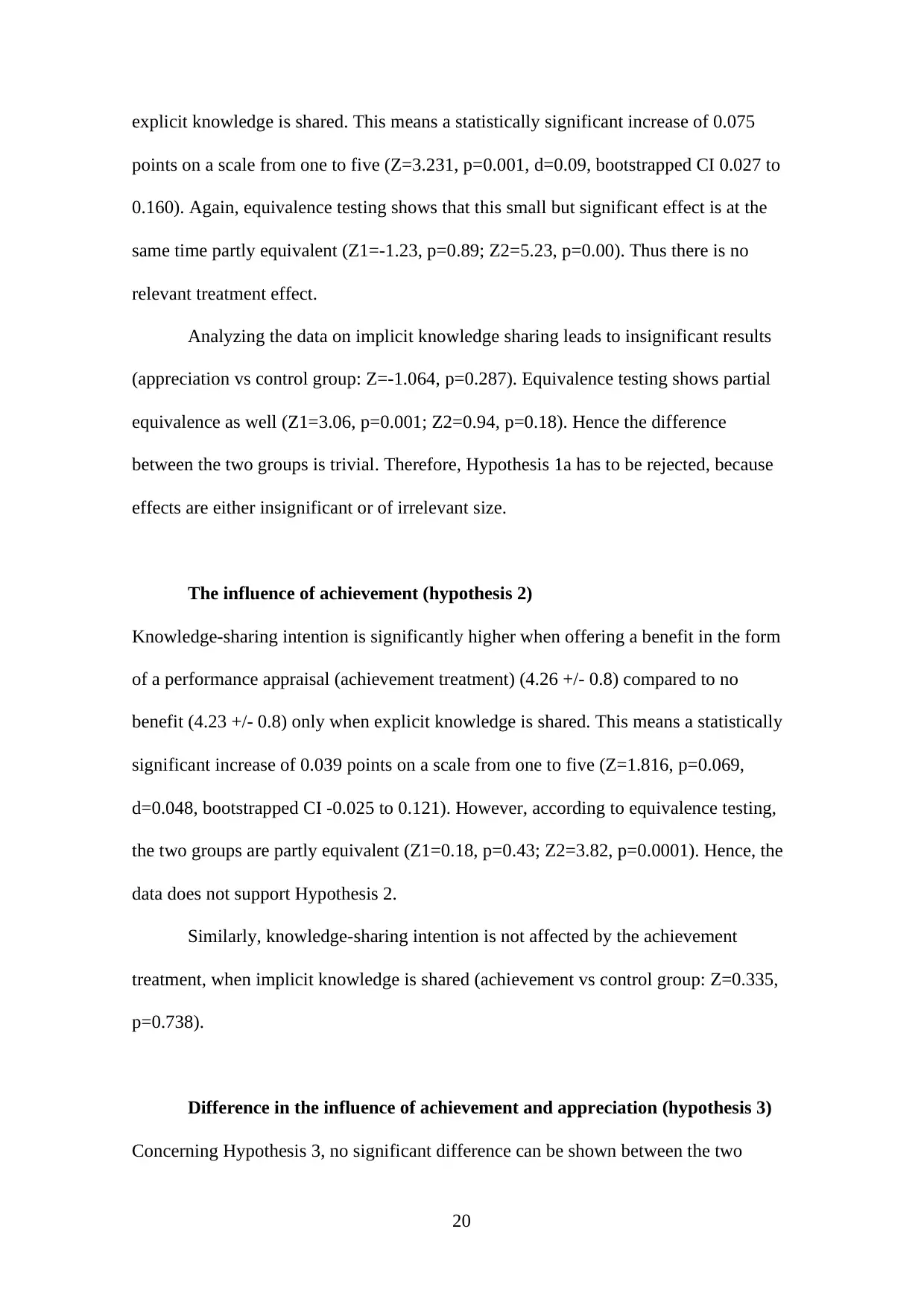
20
explicit knowledge is shared. This means a statistically significant increase of 0.075
points on a scale from one to five (Z=3.231, p=0.001, d=0.09, bootstrapped CI 0.027 to
0.160). Again, equivalence testing shows that this small but significant effect is at the
same time partly equivalent (Z1=-1.23, p=0.89; Z2=5.23, p=0.00). Thus there is no
relevant treatment effect.
Analyzing the data on implicit knowledge sharing leads to insignificant results
(appreciation vs control group: Z=-1.064, p=0.287). Equivalence testing shows partial
equivalence as well (Z1=3.06, p=0.001; Z2=0.94, p=0.18). Hence the difference
between the two groups is trivial. Therefore, Hypothesis 1a has to be rejected, because
effects are either insignificant or of irrelevant size.
The influence of achievement (hypothesis 2)
Knowledge-sharing intention is significantly higher when offering a benefit in the form
of a performance appraisal (achievement treatment) (4.26 +/- 0.8) compared to no
benefit (4.23 +/- 0.8) only when explicit knowledge is shared. This means a statistically
significant increase of 0.039 points on a scale from one to five (Z=1.816, p=0.069,
d=0.048, bootstrapped CI -0.025 to 0.121). However, according to equivalence testing,
the two groups are partly equivalent (Z1=0.18, p=0.43; Z2=3.82, p=0.0001). Hence, the
data does not support Hypothesis 2.
Similarly, knowledge-sharing intention is not affected by the achievement
treatment, when implicit knowledge is shared (achievement vs control group: Z=0.335,
p=0.738).
Difference in the influence of achievement and appreciation (hypothesis 3)
Concerning Hypothesis 3, no significant difference can be shown between the two
explicit knowledge is shared. This means a statistically significant increase of 0.075
points on a scale from one to five (Z=3.231, p=0.001, d=0.09, bootstrapped CI 0.027 to
0.160). Again, equivalence testing shows that this small but significant effect is at the
same time partly equivalent (Z1=-1.23, p=0.89; Z2=5.23, p=0.00). Thus there is no
relevant treatment effect.
Analyzing the data on implicit knowledge sharing leads to insignificant results
(appreciation vs control group: Z=-1.064, p=0.287). Equivalence testing shows partial
equivalence as well (Z1=3.06, p=0.001; Z2=0.94, p=0.18). Hence the difference
between the two groups is trivial. Therefore, Hypothesis 1a has to be rejected, because
effects are either insignificant or of irrelevant size.
The influence of achievement (hypothesis 2)
Knowledge-sharing intention is significantly higher when offering a benefit in the form
of a performance appraisal (achievement treatment) (4.26 +/- 0.8) compared to no
benefit (4.23 +/- 0.8) only when explicit knowledge is shared. This means a statistically
significant increase of 0.039 points on a scale from one to five (Z=1.816, p=0.069,
d=0.048, bootstrapped CI -0.025 to 0.121). However, according to equivalence testing,
the two groups are partly equivalent (Z1=0.18, p=0.43; Z2=3.82, p=0.0001). Hence, the
data does not support Hypothesis 2.
Similarly, knowledge-sharing intention is not affected by the achievement
treatment, when implicit knowledge is shared (achievement vs control group: Z=0.335,
p=0.738).
Difference in the influence of achievement and appreciation (hypothesis 3)
Concerning Hypothesis 3, no significant difference can be shown between the two
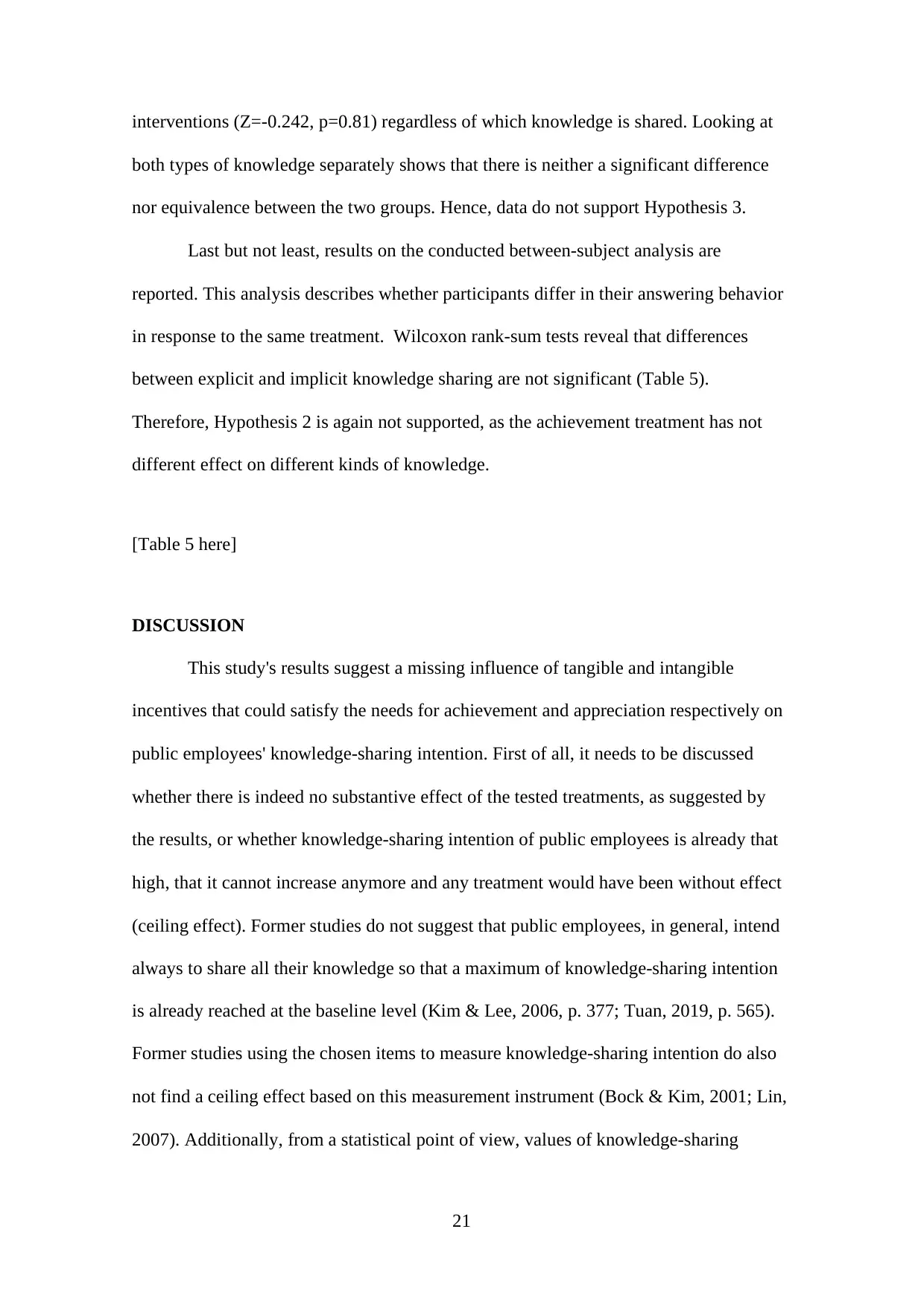
21
interventions (Z=-0.242, p=0.81) regardless of which knowledge is shared. Looking at
both types of knowledge separately shows that there is neither a significant difference
nor equivalence between the two groups. Hence, data do not support Hypothesis 3.
Last but not least, results on the conducted between-subject analysis are
reported. This analysis describes whether participants differ in their answering behavior
in response to the same treatment. Wilcoxon rank-sum tests reveal that differences
between explicit and implicit knowledge sharing are not significant (Table 5).
Therefore, Hypothesis 2 is again not supported, as the achievement treatment has not
different effect on different kinds of knowledge.
[Table 5 here]
DISCUSSION
This study's results suggest a missing influence of tangible and intangible
incentives that could satisfy the needs for achievement and appreciation respectively on
public employees' knowledge-sharing intention. First of all, it needs to be discussed
whether there is indeed no substantive effect of the tested treatments, as suggested by
the results, or whether knowledge-sharing intention of public employees is already that
high, that it cannot increase anymore and any treatment would have been without effect
(ceiling effect). Former studies do not suggest that public employees, in general, intend
always to share all their knowledge so that a maximum of knowledge-sharing intention
is already reached at the baseline level (Kim & Lee, 2006, p. 377; Tuan, 2019, p. 565).
Former studies using the chosen items to measure knowledge-sharing intention do also
not find a ceiling effect based on this measurement instrument (Bock & Kim, 2001; Lin,
2007). Additionally, from a statistical point of view, values of knowledge-sharing
interventions (Z=-0.242, p=0.81) regardless of which knowledge is shared. Looking at
both types of knowledge separately shows that there is neither a significant difference
nor equivalence between the two groups. Hence, data do not support Hypothesis 3.
Last but not least, results on the conducted between-subject analysis are
reported. This analysis describes whether participants differ in their answering behavior
in response to the same treatment. Wilcoxon rank-sum tests reveal that differences
between explicit and implicit knowledge sharing are not significant (Table 5).
Therefore, Hypothesis 2 is again not supported, as the achievement treatment has not
different effect on different kinds of knowledge.
[Table 5 here]
DISCUSSION
This study's results suggest a missing influence of tangible and intangible
incentives that could satisfy the needs for achievement and appreciation respectively on
public employees' knowledge-sharing intention. First of all, it needs to be discussed
whether there is indeed no substantive effect of the tested treatments, as suggested by
the results, or whether knowledge-sharing intention of public employees is already that
high, that it cannot increase anymore and any treatment would have been without effect
(ceiling effect). Former studies do not suggest that public employees, in general, intend
always to share all their knowledge so that a maximum of knowledge-sharing intention
is already reached at the baseline level (Kim & Lee, 2006, p. 377; Tuan, 2019, p. 565).
Former studies using the chosen items to measure knowledge-sharing intention do also
not find a ceiling effect based on this measurement instrument (Bock & Kim, 2001; Lin,
2007). Additionally, from a statistical point of view, values of knowledge-sharing
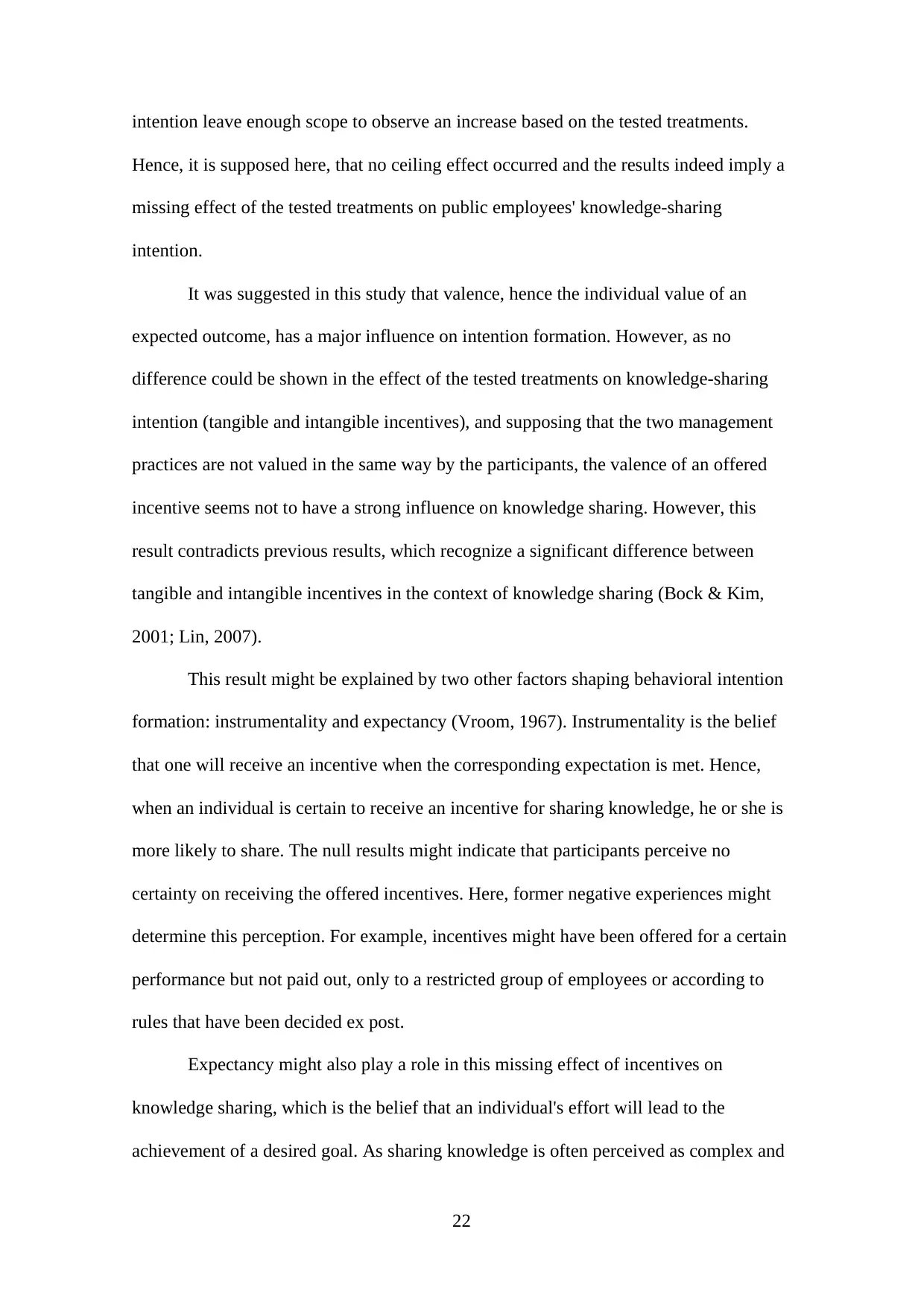
22
intention leave enough scope to observe an increase based on the tested treatments.
Hence, it is supposed here, that no ceiling effect occurred and the results indeed imply a
missing effect of the tested treatments on public employees' knowledge-sharing
intention.
It was suggested in this study that valence, hence the individual value of an
expected outcome, has a major influence on intention formation. However, as no
difference could be shown in the effect of the tested treatments on knowledge-sharing
intention (tangible and intangible incentives), and supposing that the two management
practices are not valued in the same way by the participants, the valence of an offered
incentive seems not to have a strong influence on knowledge sharing. However, this
result contradicts previous results, which recognize a significant difference between
tangible and intangible incentives in the context of knowledge sharing (Bock & Kim,
2001; Lin, 2007).
This result might be explained by two other factors shaping behavioral intention
formation: instrumentality and expectancy (Vroom, 1967). Instrumentality is the belief
that one will receive an incentive when the corresponding expectation is met. Hence,
when an individual is certain to receive an incentive for sharing knowledge, he or she is
more likely to share. The null results might indicate that participants perceive no
certainty on receiving the offered incentives. Here, former negative experiences might
determine this perception. For example, incentives might have been offered for a certain
performance but not paid out, only to a restricted group of employees or according to
rules that have been decided ex post.
Expectancy might also play a role in this missing effect of incentives on
knowledge sharing, which is the belief that an individual's effort will lead to the
achievement of a desired goal. As sharing knowledge is often perceived as complex and
intention leave enough scope to observe an increase based on the tested treatments.
Hence, it is supposed here, that no ceiling effect occurred and the results indeed imply a
missing effect of the tested treatments on public employees' knowledge-sharing
intention.
It was suggested in this study that valence, hence the individual value of an
expected outcome, has a major influence on intention formation. However, as no
difference could be shown in the effect of the tested treatments on knowledge-sharing
intention (tangible and intangible incentives), and supposing that the two management
practices are not valued in the same way by the participants, the valence of an offered
incentive seems not to have a strong influence on knowledge sharing. However, this
result contradicts previous results, which recognize a significant difference between
tangible and intangible incentives in the context of knowledge sharing (Bock & Kim,
2001; Lin, 2007).
This result might be explained by two other factors shaping behavioral intention
formation: instrumentality and expectancy (Vroom, 1967). Instrumentality is the belief
that one will receive an incentive when the corresponding expectation is met. Hence,
when an individual is certain to receive an incentive for sharing knowledge, he or she is
more likely to share. The null results might indicate that participants perceive no
certainty on receiving the offered incentives. Here, former negative experiences might
determine this perception. For example, incentives might have been offered for a certain
performance but not paid out, only to a restricted group of employees or according to
rules that have been decided ex post.
Expectancy might also play a role in this missing effect of incentives on
knowledge sharing, which is the belief that an individual's effort will lead to the
achievement of a desired goal. As sharing knowledge is often perceived as complex and
Paraphrase This Document
Need a fresh take? Get an instant paraphrase of this document with our AI Paraphraser
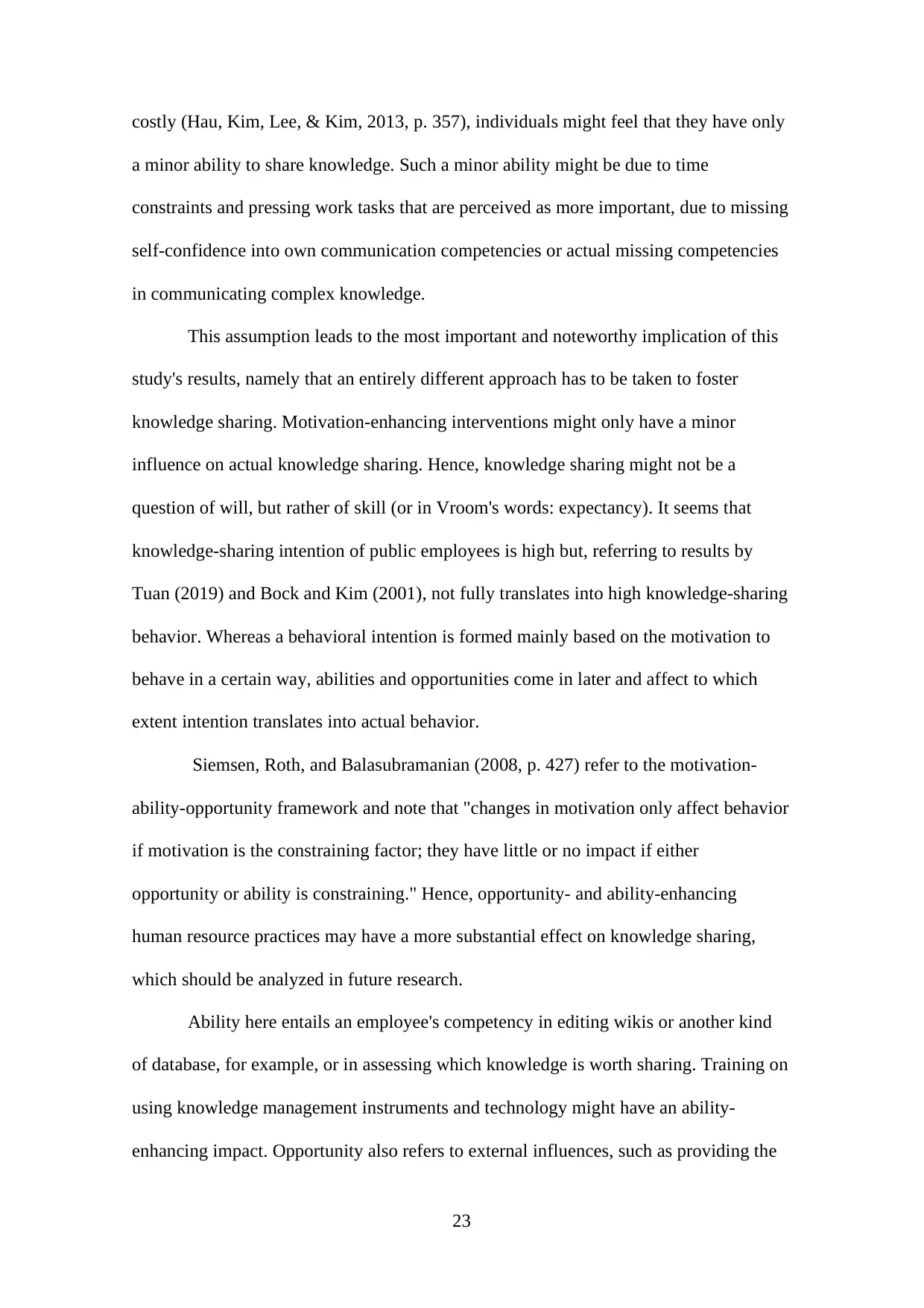
23
costly (Hau, Kim, Lee, & Kim, 2013, p. 357), individuals might feel that they have only
a minor ability to share knowledge. Such a minor ability might be due to time
constraints and pressing work tasks that are perceived as more important, due to missing
self-confidence into own communication competencies or actual missing competencies
in communicating complex knowledge.
This assumption leads to the most important and noteworthy implication of this
study's results, namely that an entirely different approach has to be taken to foster
knowledge sharing. Motivation-enhancing interventions might only have a minor
influence on actual knowledge sharing. Hence, knowledge sharing might not be a
question of will, but rather of skill (or in Vroom's words: expectancy). It seems that
knowledge-sharing intention of public employees is high but, referring to results by
Tuan (2019) and Bock and Kim (2001), not fully translates into high knowledge-sharing
behavior. Whereas a behavioral intention is formed mainly based on the motivation to
behave in a certain way, abilities and opportunities come in later and affect to which
extent intention translates into actual behavior.
Siemsen, Roth, and Balasubramanian (2008, p. 427) refer to the motivation-
ability-opportunity framework and note that "changes in motivation only affect behavior
if motivation is the constraining factor; they have little or no impact if either
opportunity or ability is constraining." Hence, opportunity- and ability-enhancing
human resource practices may have a more substantial effect on knowledge sharing,
which should be analyzed in future research.
Ability here entails an employee's competency in editing wikis or another kind
of database, for example, or in assessing which knowledge is worth sharing. Training on
using knowledge management instruments and technology might have an ability-
enhancing impact. Opportunity also refers to external influences, such as providing the
costly (Hau, Kim, Lee, & Kim, 2013, p. 357), individuals might feel that they have only
a minor ability to share knowledge. Such a minor ability might be due to time
constraints and pressing work tasks that are perceived as more important, due to missing
self-confidence into own communication competencies or actual missing competencies
in communicating complex knowledge.
This assumption leads to the most important and noteworthy implication of this
study's results, namely that an entirely different approach has to be taken to foster
knowledge sharing. Motivation-enhancing interventions might only have a minor
influence on actual knowledge sharing. Hence, knowledge sharing might not be a
question of will, but rather of skill (or in Vroom's words: expectancy). It seems that
knowledge-sharing intention of public employees is high but, referring to results by
Tuan (2019) and Bock and Kim (2001), not fully translates into high knowledge-sharing
behavior. Whereas a behavioral intention is formed mainly based on the motivation to
behave in a certain way, abilities and opportunities come in later and affect to which
extent intention translates into actual behavior.
Siemsen, Roth, and Balasubramanian (2008, p. 427) refer to the motivation-
ability-opportunity framework and note that "changes in motivation only affect behavior
if motivation is the constraining factor; they have little or no impact if either
opportunity or ability is constraining." Hence, opportunity- and ability-enhancing
human resource practices may have a more substantial effect on knowledge sharing,
which should be analyzed in future research.
Ability here entails an employee's competency in editing wikis or another kind
of database, for example, or in assessing which knowledge is worth sharing. Training on
using knowledge management instruments and technology might have an ability-
enhancing impact. Opportunity also refers to external influences, such as providing the
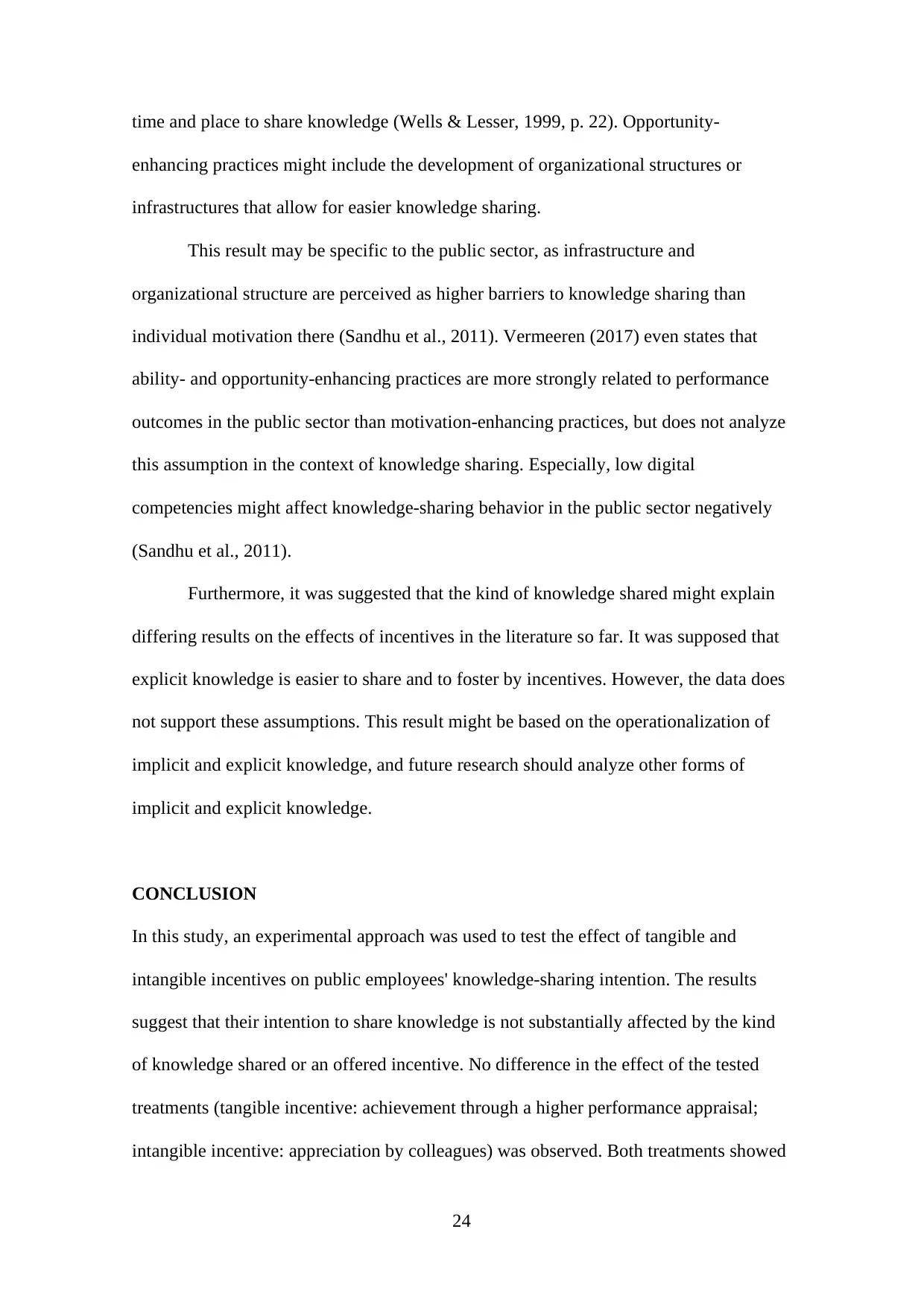
24
time and place to share knowledge (Wells & Lesser, 1999, p. 22). Opportunity-
enhancing practices might include the development of organizational structures or
infrastructures that allow for easier knowledge sharing.
This result may be specific to the public sector, as infrastructure and
organizational structure are perceived as higher barriers to knowledge sharing than
individual motivation there (Sandhu et al., 2011). Vermeeren (2017) even states that
ability- and opportunity-enhancing practices are more strongly related to performance
outcomes in the public sector than motivation-enhancing practices, but does not analyze
this assumption in the context of knowledge sharing. Especially, low digital
competencies might affect knowledge-sharing behavior in the public sector negatively
(Sandhu et al., 2011).
Furthermore, it was suggested that the kind of knowledge shared might explain
differing results on the effects of incentives in the literature so far. It was supposed that
explicit knowledge is easier to share and to foster by incentives. However, the data does
not support these assumptions. This result might be based on the operationalization of
implicit and explicit knowledge, and future research should analyze other forms of
implicit and explicit knowledge.
CONCLUSION
In this study, an experimental approach was used to test the effect of tangible and
intangible incentives on public employees' knowledge-sharing intention. The results
suggest that their intention to share knowledge is not substantially affected by the kind
of knowledge shared or an offered incentive. No difference in the effect of the tested
treatments (tangible incentive: achievement through a higher performance appraisal;
intangible incentive: appreciation by colleagues) was observed. Both treatments showed
time and place to share knowledge (Wells & Lesser, 1999, p. 22). Opportunity-
enhancing practices might include the development of organizational structures or
infrastructures that allow for easier knowledge sharing.
This result may be specific to the public sector, as infrastructure and
organizational structure are perceived as higher barriers to knowledge sharing than
individual motivation there (Sandhu et al., 2011). Vermeeren (2017) even states that
ability- and opportunity-enhancing practices are more strongly related to performance
outcomes in the public sector than motivation-enhancing practices, but does not analyze
this assumption in the context of knowledge sharing. Especially, low digital
competencies might affect knowledge-sharing behavior in the public sector negatively
(Sandhu et al., 2011).
Furthermore, it was suggested that the kind of knowledge shared might explain
differing results on the effects of incentives in the literature so far. It was supposed that
explicit knowledge is easier to share and to foster by incentives. However, the data does
not support these assumptions. This result might be based on the operationalization of
implicit and explicit knowledge, and future research should analyze other forms of
implicit and explicit knowledge.
CONCLUSION
In this study, an experimental approach was used to test the effect of tangible and
intangible incentives on public employees' knowledge-sharing intention. The results
suggest that their intention to share knowledge is not substantially affected by the kind
of knowledge shared or an offered incentive. No difference in the effect of the tested
treatments (tangible incentive: achievement through a higher performance appraisal;
intangible incentive: appreciation by colleagues) was observed. Both treatments showed
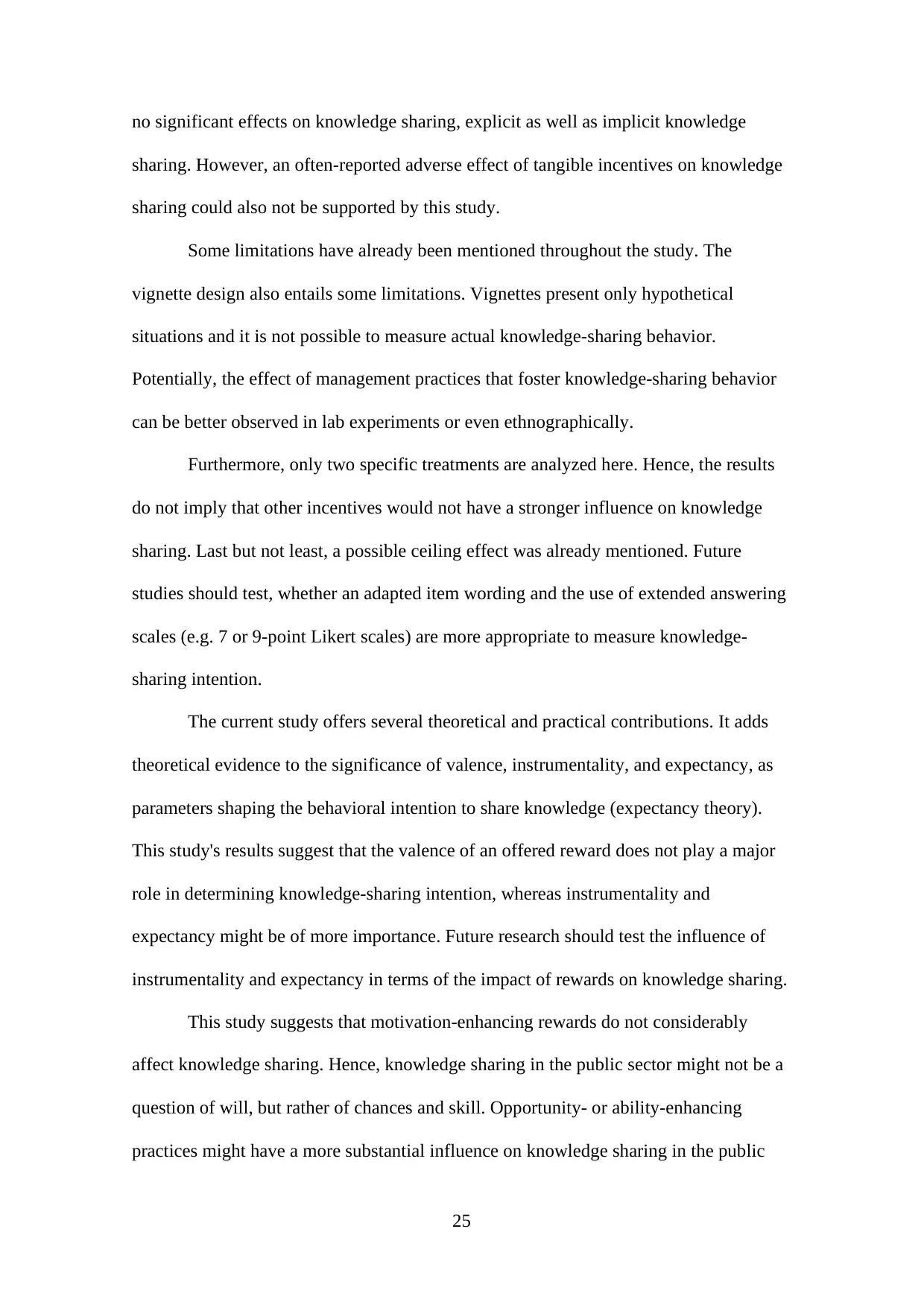
25
no significant effects on knowledge sharing, explicit as well as implicit knowledge
sharing. However, an often-reported adverse effect of tangible incentives on knowledge
sharing could also not be supported by this study.
Some limitations have already been mentioned throughout the study. The
vignette design also entails some limitations. Vignettes present only hypothetical
situations and it is not possible to measure actual knowledge-sharing behavior.
Potentially, the effect of management practices that foster knowledge-sharing behavior
can be better observed in lab experiments or even ethnographically.
Furthermore, only two specific treatments are analyzed here. Hence, the results
do not imply that other incentives would not have a stronger influence on knowledge
sharing. Last but not least, a possible ceiling effect was already mentioned. Future
studies should test, whether an adapted item wording and the use of extended answering
scales (e.g. 7 or 9-point Likert scales) are more appropriate to measure knowledge-
sharing intention.
The current study offers several theoretical and practical contributions. It adds
theoretical evidence to the significance of valence, instrumentality, and expectancy, as
parameters shaping the behavioral intention to share knowledge (expectancy theory).
This study's results suggest that the valence of an offered reward does not play a major
role in determining knowledge-sharing intention, whereas instrumentality and
expectancy might be of more importance. Future research should test the influence of
instrumentality and expectancy in terms of the impact of rewards on knowledge sharing.
This study suggests that motivation-enhancing rewards do not considerably
affect knowledge sharing. Hence, knowledge sharing in the public sector might not be a
question of will, but rather of chances and skill. Opportunity- or ability-enhancing
practices might have a more substantial influence on knowledge sharing in the public
no significant effects on knowledge sharing, explicit as well as implicit knowledge
sharing. However, an often-reported adverse effect of tangible incentives on knowledge
sharing could also not be supported by this study.
Some limitations have already been mentioned throughout the study. The
vignette design also entails some limitations. Vignettes present only hypothetical
situations and it is not possible to measure actual knowledge-sharing behavior.
Potentially, the effect of management practices that foster knowledge-sharing behavior
can be better observed in lab experiments or even ethnographically.
Furthermore, only two specific treatments are analyzed here. Hence, the results
do not imply that other incentives would not have a stronger influence on knowledge
sharing. Last but not least, a possible ceiling effect was already mentioned. Future
studies should test, whether an adapted item wording and the use of extended answering
scales (e.g. 7 or 9-point Likert scales) are more appropriate to measure knowledge-
sharing intention.
The current study offers several theoretical and practical contributions. It adds
theoretical evidence to the significance of valence, instrumentality, and expectancy, as
parameters shaping the behavioral intention to share knowledge (expectancy theory).
This study's results suggest that the valence of an offered reward does not play a major
role in determining knowledge-sharing intention, whereas instrumentality and
expectancy might be of more importance. Future research should test the influence of
instrumentality and expectancy in terms of the impact of rewards on knowledge sharing.
This study suggests that motivation-enhancing rewards do not considerably
affect knowledge sharing. Hence, knowledge sharing in the public sector might not be a
question of will, but rather of chances and skill. Opportunity- or ability-enhancing
practices might have a more substantial influence on knowledge sharing in the public
Secure Best Marks with AI Grader
Need help grading? Try our AI Grader for instant feedback on your assignments.
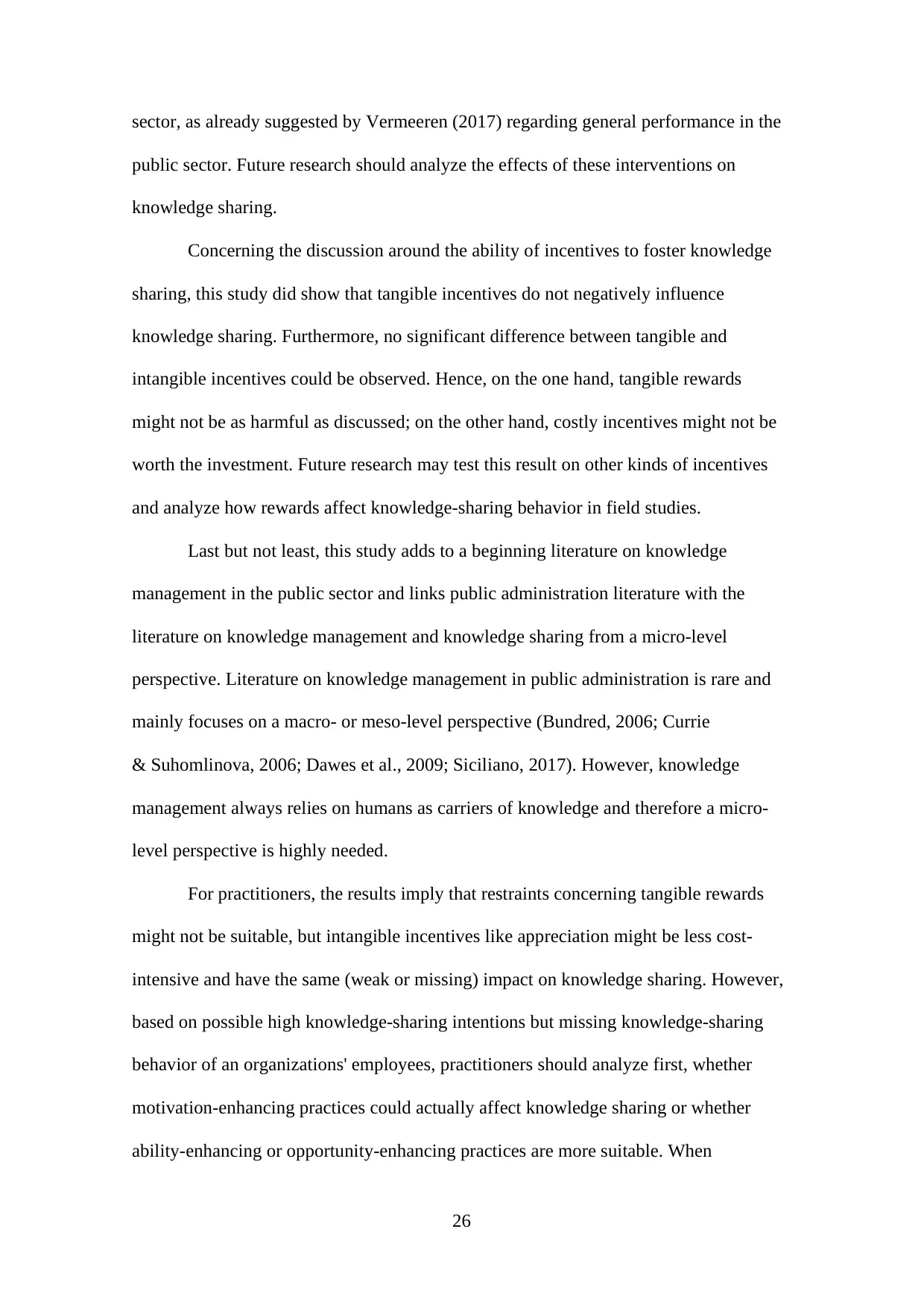
26
sector, as already suggested by Vermeeren (2017) regarding general performance in the
public sector. Future research should analyze the effects of these interventions on
knowledge sharing.
Concerning the discussion around the ability of incentives to foster knowledge
sharing, this study did show that tangible incentives do not negatively influence
knowledge sharing. Furthermore, no significant difference between tangible and
intangible incentives could be observed. Hence, on the one hand, tangible rewards
might not be as harmful as discussed; on the other hand, costly incentives might not be
worth the investment. Future research may test this result on other kinds of incentives
and analyze how rewards affect knowledge-sharing behavior in field studies.
Last but not least, this study adds to a beginning literature on knowledge
management in the public sector and links public administration literature with the
literature on knowledge management and knowledge sharing from a micro-level
perspective. Literature on knowledge management in public administration is rare and
mainly focuses on a macro- or meso-level perspective (Bundred, 2006; Currie
& Suhomlinova, 2006; Dawes et al., 2009; Siciliano, 2017). However, knowledge
management always relies on humans as carriers of knowledge and therefore a micro-
level perspective is highly needed.
For practitioners, the results imply that restraints concerning tangible rewards
might not be suitable, but intangible incentives like appreciation might be less cost-
intensive and have the same (weak or missing) impact on knowledge sharing. However,
based on possible high knowledge-sharing intentions but missing knowledge-sharing
behavior of an organizations' employees, practitioners should analyze first, whether
motivation-enhancing practices could actually affect knowledge sharing or whether
ability-enhancing or opportunity-enhancing practices are more suitable. When
sector, as already suggested by Vermeeren (2017) regarding general performance in the
public sector. Future research should analyze the effects of these interventions on
knowledge sharing.
Concerning the discussion around the ability of incentives to foster knowledge
sharing, this study did show that tangible incentives do not negatively influence
knowledge sharing. Furthermore, no significant difference between tangible and
intangible incentives could be observed. Hence, on the one hand, tangible rewards
might not be as harmful as discussed; on the other hand, costly incentives might not be
worth the investment. Future research may test this result on other kinds of incentives
and analyze how rewards affect knowledge-sharing behavior in field studies.
Last but not least, this study adds to a beginning literature on knowledge
management in the public sector and links public administration literature with the
literature on knowledge management and knowledge sharing from a micro-level
perspective. Literature on knowledge management in public administration is rare and
mainly focuses on a macro- or meso-level perspective (Bundred, 2006; Currie
& Suhomlinova, 2006; Dawes et al., 2009; Siciliano, 2017). However, knowledge
management always relies on humans as carriers of knowledge and therefore a micro-
level perspective is highly needed.
For practitioners, the results imply that restraints concerning tangible rewards
might not be suitable, but intangible incentives like appreciation might be less cost-
intensive and have the same (weak or missing) impact on knowledge sharing. However,
based on possible high knowledge-sharing intentions but missing knowledge-sharing
behavior of an organizations' employees, practitioners should analyze first, whether
motivation-enhancing practices could actually affect knowledge sharing or whether
ability-enhancing or opportunity-enhancing practices are more suitable. When

27
knowledge-sharing intention is low, motivation-enhancing instruments such as
incentives might fit. When intention is already high, abilities and opportunities have to
be increased to foster actual knowledge sharing.
knowledge-sharing intention is low, motivation-enhancing instruments such as
incentives might fit. When intention is already high, abilities and opportunities have to
be increased to foster actual knowledge sharing.
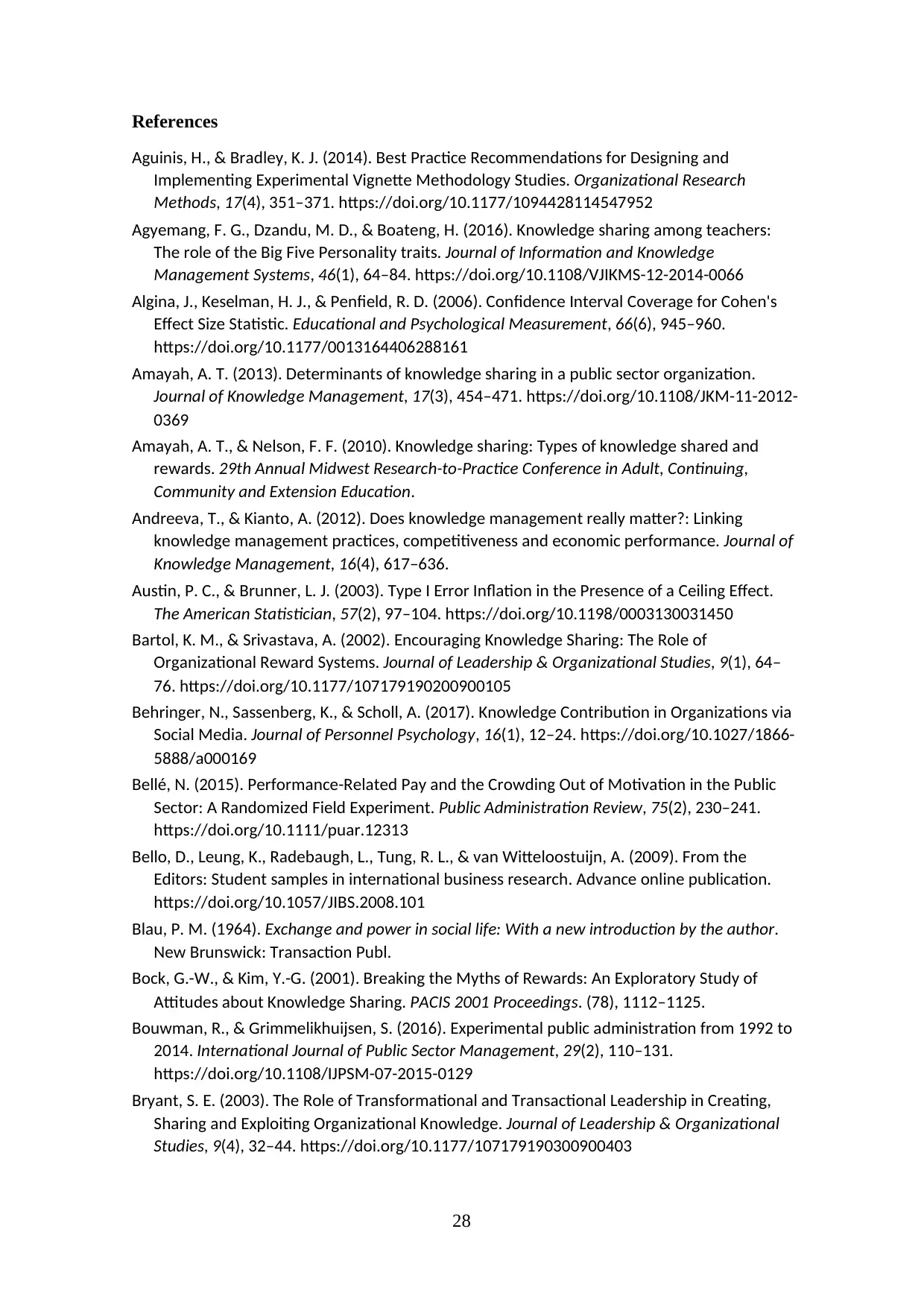
28
References
Aguinis, H., & Bradley, K. J. (2014). Best Practice Recommendations for Designing and
Implementing Experimental Vignette Methodology Studies. Organizational Research
Methods, 17(4), 351–371. https://doi.org/10.1177/1094428114547952
Agyemang, F. G., Dzandu, M. D., & Boateng, H. (2016). Knowledge sharing among teachers:
The role of the Big Five Personality traits. Journal of Information and Knowledge
Management Systems, 46(1), 64–84. https://doi.org/10.1108/VJIKMS-12-2014-0066
Algina, J., Keselman, H. J., & Penfield, R. D. (2006). Confidence Interval Coverage for Cohen's
Effect Size Statistic. Educational and Psychological Measurement, 66(6), 945–960.
https://doi.org/10.1177/0013164406288161
Amayah, A. T. (2013). Determinants of knowledge sharing in a public sector organization.
Journal of Knowledge Management, 17(3), 454–471. https://doi.org/10.1108/JKM-11-2012-
0369
Amayah, A. T., & Nelson, F. F. (2010). Knowledge sharing: Types of knowledge shared and
rewards. 29th Annual Midwest Research-to-Practice Conference in Adult, Continuing,
Community and Extension Education.
Andreeva, T., & Kianto, A. (2012). Does knowledge management really matter?: Linking
knowledge management practices, competitiveness and economic performance. Journal of
Knowledge Management, 16(4), 617–636.
Austin, P. C., & Brunner, L. J. (2003). Type I Error Inflation in the Presence of a Ceiling Effect.
The American Statistician, 57(2), 97–104. https://doi.org/10.1198/0003130031450
Bartol, K. M., & Srivastava, A. (2002). Encouraging Knowledge Sharing: The Role of
Organizational Reward Systems. Journal of Leadership & Organizational Studies, 9(1), 64–
76. https://doi.org/10.1177/107179190200900105
Behringer, N., Sassenberg, K., & Scholl, A. (2017). Knowledge Contribution in Organizations via
Social Media. Journal of Personnel Psychology, 16(1), 12–24. https://doi.org/10.1027/1866-
5888/a000169
Bellé, N. (2015). Performance-Related Pay and the Crowding Out of Motivation in the Public
Sector: A Randomized Field Experiment. Public Administration Review, 75(2), 230–241.
https://doi.org/10.1111/puar.12313
Bello, D., Leung, K., Radebaugh, L., Tung, R. L., & van Witteloostuijn, A. (2009). From the
Editors: Student samples in international business research. Advance online publication.
https://doi.org/10.1057/JIBS.2008.101
Blau, P. M. (1964). Exchange and power in social life: With a new introduction by the author.
New Brunswick: Transaction Publ.
Bock, G.-W., & Kim, Y.-G. (2001). Breaking the Myths of Rewards: An Exploratory Study of
Attitudes about Knowledge Sharing. PACIS 2001 Proceedings. (78), 1112–1125.
Bouwman, R., & Grimmelikhuijsen, S. (2016). Experimental public administration from 1992 to
2014. International Journal of Public Sector Management, 29(2), 110–131.
https://doi.org/10.1108/IJPSM-07-2015-0129
Bryant, S. E. (2003). The Role of Transformational and Transactional Leadership in Creating,
Sharing and Exploiting Organizational Knowledge. Journal of Leadership & Organizational
Studies, 9(4), 32–44. https://doi.org/10.1177/107179190300900403
References
Aguinis, H., & Bradley, K. J. (2014). Best Practice Recommendations for Designing and
Implementing Experimental Vignette Methodology Studies. Organizational Research
Methods, 17(4), 351–371. https://doi.org/10.1177/1094428114547952
Agyemang, F. G., Dzandu, M. D., & Boateng, H. (2016). Knowledge sharing among teachers:
The role of the Big Five Personality traits. Journal of Information and Knowledge
Management Systems, 46(1), 64–84. https://doi.org/10.1108/VJIKMS-12-2014-0066
Algina, J., Keselman, H. J., & Penfield, R. D. (2006). Confidence Interval Coverage for Cohen's
Effect Size Statistic. Educational and Psychological Measurement, 66(6), 945–960.
https://doi.org/10.1177/0013164406288161
Amayah, A. T. (2013). Determinants of knowledge sharing in a public sector organization.
Journal of Knowledge Management, 17(3), 454–471. https://doi.org/10.1108/JKM-11-2012-
0369
Amayah, A. T., & Nelson, F. F. (2010). Knowledge sharing: Types of knowledge shared and
rewards. 29th Annual Midwest Research-to-Practice Conference in Adult, Continuing,
Community and Extension Education.
Andreeva, T., & Kianto, A. (2012). Does knowledge management really matter?: Linking
knowledge management practices, competitiveness and economic performance. Journal of
Knowledge Management, 16(4), 617–636.
Austin, P. C., & Brunner, L. J. (2003). Type I Error Inflation in the Presence of a Ceiling Effect.
The American Statistician, 57(2), 97–104. https://doi.org/10.1198/0003130031450
Bartol, K. M., & Srivastava, A. (2002). Encouraging Knowledge Sharing: The Role of
Organizational Reward Systems. Journal of Leadership & Organizational Studies, 9(1), 64–
76. https://doi.org/10.1177/107179190200900105
Behringer, N., Sassenberg, K., & Scholl, A. (2017). Knowledge Contribution in Organizations via
Social Media. Journal of Personnel Psychology, 16(1), 12–24. https://doi.org/10.1027/1866-
5888/a000169
Bellé, N. (2015). Performance-Related Pay and the Crowding Out of Motivation in the Public
Sector: A Randomized Field Experiment. Public Administration Review, 75(2), 230–241.
https://doi.org/10.1111/puar.12313
Bello, D., Leung, K., Radebaugh, L., Tung, R. L., & van Witteloostuijn, A. (2009). From the
Editors: Student samples in international business research. Advance online publication.
https://doi.org/10.1057/JIBS.2008.101
Blau, P. M. (1964). Exchange and power in social life: With a new introduction by the author.
New Brunswick: Transaction Publ.
Bock, G.-W., & Kim, Y.-G. (2001). Breaking the Myths of Rewards: An Exploratory Study of
Attitudes about Knowledge Sharing. PACIS 2001 Proceedings. (78), 1112–1125.
Bouwman, R., & Grimmelikhuijsen, S. (2016). Experimental public administration from 1992 to
2014. International Journal of Public Sector Management, 29(2), 110–131.
https://doi.org/10.1108/IJPSM-07-2015-0129
Bryant, S. E. (2003). The Role of Transformational and Transactional Leadership in Creating,
Sharing and Exploiting Organizational Knowledge. Journal of Leadership & Organizational
Studies, 9(4), 32–44. https://doi.org/10.1177/107179190300900403
Paraphrase This Document
Need a fresh take? Get an instant paraphrase of this document with our AI Paraphraser
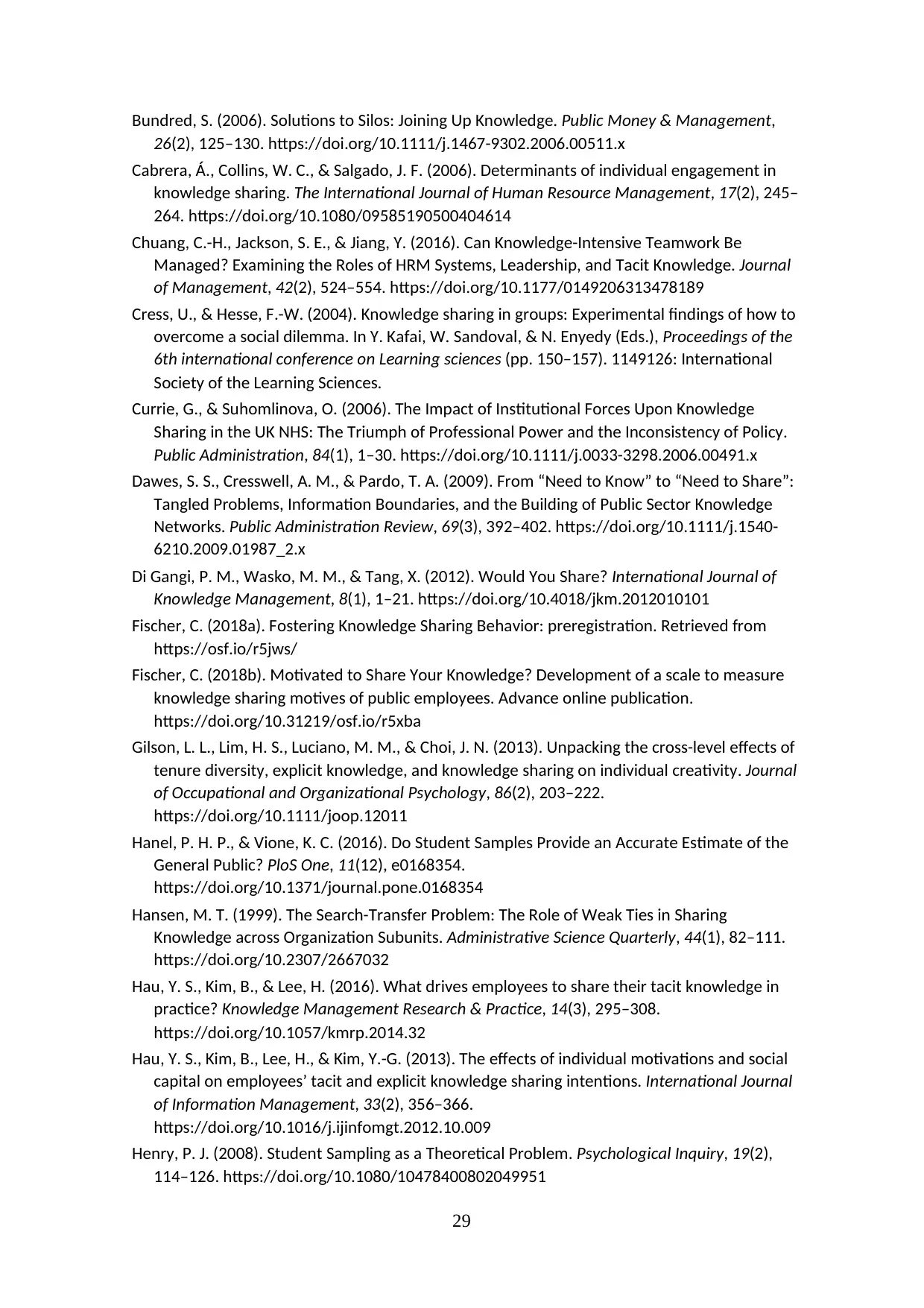
29
Bundred, S. (2006). Solutions to Silos: Joining Up Knowledge. Public Money & Management,
26(2), 125–130. https://doi.org/10.1111/j.1467-9302.2006.00511.x
Cabrera, Á., Collins, W. C., & Salgado, J. F. (2006). Determinants of individual engagement in
knowledge sharing. The International Journal of Human Resource Management, 17(2), 245–
264. https://doi.org/10.1080/09585190500404614
Chuang, C.-H., Jackson, S. E., & Jiang, Y. (2016). Can Knowledge-Intensive Teamwork Be
Managed? Examining the Roles of HRM Systems, Leadership, and Tacit Knowledge. Journal
of Management, 42(2), 524–554. https://doi.org/10.1177/0149206313478189
Cress, U., & Hesse, F.-W. (2004). Knowledge sharing in groups: Experimental findings of how to
overcome a social dilemma. In Y. Kafai, W. Sandoval, & N. Enyedy (Eds.), Proceedings of the
6th international conference on Learning sciences (pp. 150–157). 1149126: International
Society of the Learning Sciences.
Currie, G., & Suhomlinova, O. (2006). The Impact of Institutional Forces Upon Knowledge
Sharing in the UK NHS: The Triumph of Professional Power and the Inconsistency of Policy.
Public Administration, 84(1), 1–30. https://doi.org/10.1111/j.0033-3298.2006.00491.x
Dawes, S. S., Cresswell, A. M., & Pardo, T. A. (2009). From “Need to Know” to “Need to Share”:
Tangled Problems, Information Boundaries, and the Building of Public Sector Knowledge
Networks. Public Administration Review, 69(3), 392–402. https://doi.org/10.1111/j.1540-
6210.2009.01987_2.x
Di Gangi, P. M., Wasko, M. M., & Tang, X. (2012). Would You Share? International Journal of
Knowledge Management, 8(1), 1–21. https://doi.org/10.4018/jkm.2012010101
Fischer, C. (2018a). Fostering Knowledge Sharing Behavior: preregistration. Retrieved from
https://osf.io/r5jws/
Fischer, C. (2018b). Motivated to Share Your Knowledge? Development of a scale to measure
knowledge sharing motives of public employees. Advance online publication.
https://doi.org/10.31219/osf.io/r5xba
Gilson, L. L., Lim, H. S., Luciano, M. M., & Choi, J. N. (2013). Unpacking the cross-level effects of
tenure diversity, explicit knowledge, and knowledge sharing on individual creativity. Journal
of Occupational and Organizational Psychology, 86(2), 203–222.
https://doi.org/10.1111/joop.12011
Hanel, P. H. P., & Vione, K. C. (2016). Do Student Samples Provide an Accurate Estimate of the
General Public? PloS One, 11(12), e0168354.
https://doi.org/10.1371/journal.pone.0168354
Hansen, M. T. (1999). The Search-Transfer Problem: The Role of Weak Ties in Sharing
Knowledge across Organization Subunits. Administrative Science Quarterly, 44(1), 82–111.
https://doi.org/10.2307/2667032
Hau, Y. S., Kim, B., & Lee, H. (2016). What drives employees to share their tacit knowledge in
practice? Knowledge Management Research & Practice, 14(3), 295–308.
https://doi.org/10.1057/kmrp.2014.32
Hau, Y. S., Kim, B., Lee, H., & Kim, Y.-G. (2013). The effects of individual motivations and social
capital on employees’ tacit and explicit knowledge sharing intentions. International Journal
of Information Management, 33(2), 356–366.
https://doi.org/10.1016/j.ijinfomgt.2012.10.009
Henry, P. J. (2008). Student Sampling as a Theoretical Problem. Psychological Inquiry, 19(2),
114–126. https://doi.org/10.1080/10478400802049951
Bundred, S. (2006). Solutions to Silos: Joining Up Knowledge. Public Money & Management,
26(2), 125–130. https://doi.org/10.1111/j.1467-9302.2006.00511.x
Cabrera, Á., Collins, W. C., & Salgado, J. F. (2006). Determinants of individual engagement in
knowledge sharing. The International Journal of Human Resource Management, 17(2), 245–
264. https://doi.org/10.1080/09585190500404614
Chuang, C.-H., Jackson, S. E., & Jiang, Y. (2016). Can Knowledge-Intensive Teamwork Be
Managed? Examining the Roles of HRM Systems, Leadership, and Tacit Knowledge. Journal
of Management, 42(2), 524–554. https://doi.org/10.1177/0149206313478189
Cress, U., & Hesse, F.-W. (2004). Knowledge sharing in groups: Experimental findings of how to
overcome a social dilemma. In Y. Kafai, W. Sandoval, & N. Enyedy (Eds.), Proceedings of the
6th international conference on Learning sciences (pp. 150–157). 1149126: International
Society of the Learning Sciences.
Currie, G., & Suhomlinova, O. (2006). The Impact of Institutional Forces Upon Knowledge
Sharing in the UK NHS: The Triumph of Professional Power and the Inconsistency of Policy.
Public Administration, 84(1), 1–30. https://doi.org/10.1111/j.0033-3298.2006.00491.x
Dawes, S. S., Cresswell, A. M., & Pardo, T. A. (2009). From “Need to Know” to “Need to Share”:
Tangled Problems, Information Boundaries, and the Building of Public Sector Knowledge
Networks. Public Administration Review, 69(3), 392–402. https://doi.org/10.1111/j.1540-
6210.2009.01987_2.x
Di Gangi, P. M., Wasko, M. M., & Tang, X. (2012). Would You Share? International Journal of
Knowledge Management, 8(1), 1–21. https://doi.org/10.4018/jkm.2012010101
Fischer, C. (2018a). Fostering Knowledge Sharing Behavior: preregistration. Retrieved from
https://osf.io/r5jws/
Fischer, C. (2018b). Motivated to Share Your Knowledge? Development of a scale to measure
knowledge sharing motives of public employees. Advance online publication.
https://doi.org/10.31219/osf.io/r5xba
Gilson, L. L., Lim, H. S., Luciano, M. M., & Choi, J. N. (2013). Unpacking the cross-level effects of
tenure diversity, explicit knowledge, and knowledge sharing on individual creativity. Journal
of Occupational and Organizational Psychology, 86(2), 203–222.
https://doi.org/10.1111/joop.12011
Hanel, P. H. P., & Vione, K. C. (2016). Do Student Samples Provide an Accurate Estimate of the
General Public? PloS One, 11(12), e0168354.
https://doi.org/10.1371/journal.pone.0168354
Hansen, M. T. (1999). The Search-Transfer Problem: The Role of Weak Ties in Sharing
Knowledge across Organization Subunits. Administrative Science Quarterly, 44(1), 82–111.
https://doi.org/10.2307/2667032
Hau, Y. S., Kim, B., & Lee, H. (2016). What drives employees to share their tacit knowledge in
practice? Knowledge Management Research & Practice, 14(3), 295–308.
https://doi.org/10.1057/kmrp.2014.32
Hau, Y. S., Kim, B., Lee, H., & Kim, Y.-G. (2013). The effects of individual motivations and social
capital on employees’ tacit and explicit knowledge sharing intentions. International Journal
of Information Management, 33(2), 356–366.
https://doi.org/10.1016/j.ijinfomgt.2012.10.009
Henry, P. J. (2008). Student Sampling as a Theoretical Problem. Psychological Inquiry, 19(2),
114–126. https://doi.org/10.1080/10478400802049951
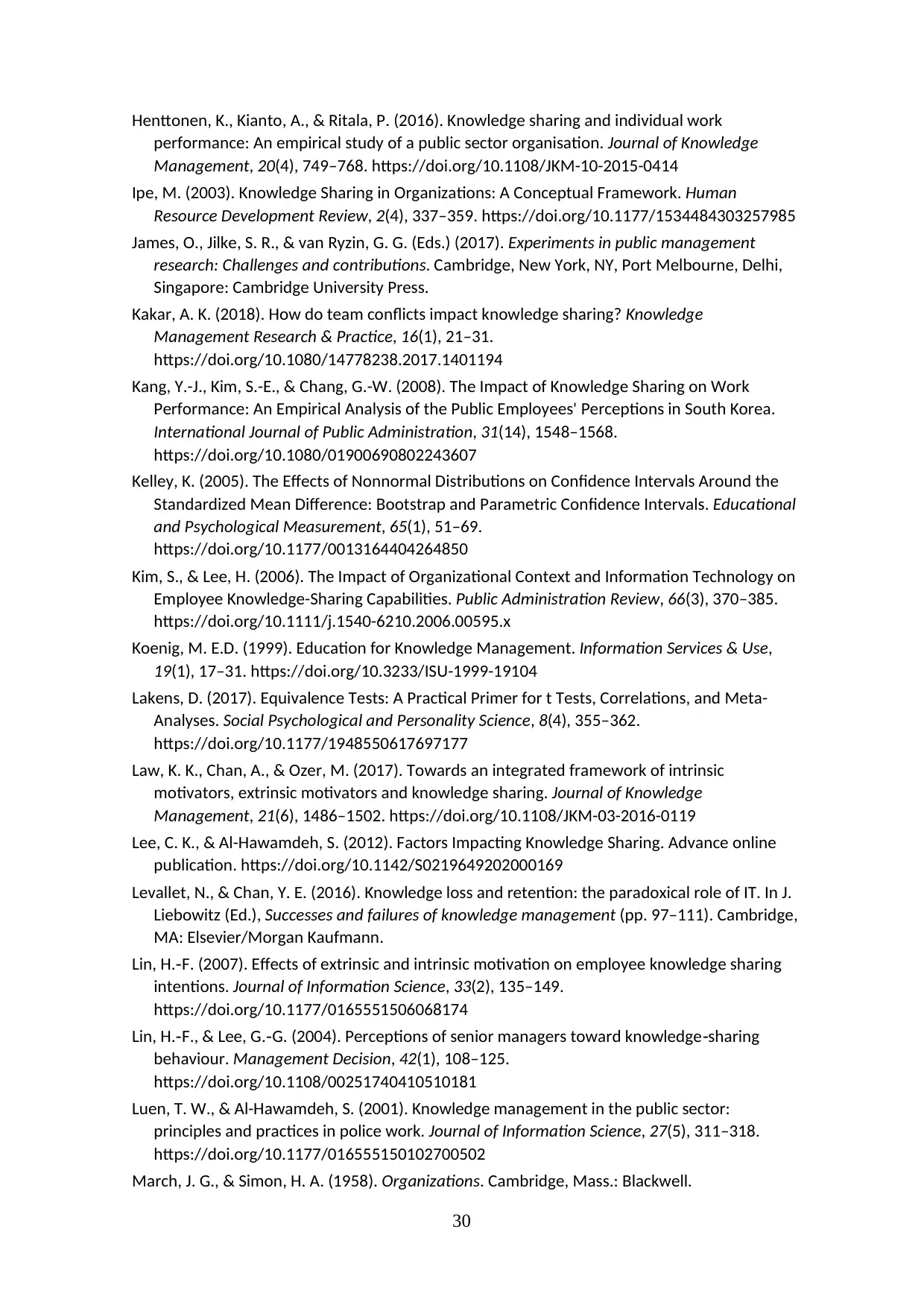
30
Henttonen, K., Kianto, A., & Ritala, P. (2016). Knowledge sharing and individual work
performance: An empirical study of a public sector organisation. Journal of Knowledge
Management, 20(4), 749–768. https://doi.org/10.1108/JKM-10-2015-0414
Ipe, M. (2003). Knowledge Sharing in Organizations: A Conceptual Framework. Human
Resource Development Review, 2(4), 337–359. https://doi.org/10.1177/1534484303257985
James, O., Jilke, S. R., & van Ryzin, G. G. (Eds.) (2017). Experiments in public management
research: Challenges and contributions. Cambridge, New York, NY, Port Melbourne, Delhi,
Singapore: Cambridge University Press.
Kakar, A. K. (2018). How do team conflicts impact knowledge sharing? Knowledge
Management Research & Practice, 16(1), 21–31.
https://doi.org/10.1080/14778238.2017.1401194
Kang, Y.-J., Kim, S.-E., & Chang, G.-W. (2008). The Impact of Knowledge Sharing on Work
Performance: An Empirical Analysis of the Public Employees' Perceptions in South Korea.
International Journal of Public Administration, 31(14), 1548–1568.
https://doi.org/10.1080/01900690802243607
Kelley, K. (2005). The Effects of Nonnormal Distributions on Confidence Intervals Around the
Standardized Mean Difference: Bootstrap and Parametric Confidence Intervals. Educational
and Psychological Measurement, 65(1), 51–69.
https://doi.org/10.1177/0013164404264850
Kim, S., & Lee, H. (2006). The Impact of Organizational Context and Information Technology on
Employee Knowledge-Sharing Capabilities. Public Administration Review, 66(3), 370–385.
https://doi.org/10.1111/j.1540-6210.2006.00595.x
Koenig, M. E.D. (1999). Education for Knowledge Management. Information Services & Use,
19(1), 17–31. https://doi.org/10.3233/ISU-1999-19104
Lakens, D. (2017). Equivalence Tests: A Practical Primer for t Tests, Correlations, and Meta-
Analyses. Social Psychological and Personality Science, 8(4), 355–362.
https://doi.org/10.1177/1948550617697177
Law, K. K., Chan, A., & Ozer, M. (2017). Towards an integrated framework of intrinsic
motivators, extrinsic motivators and knowledge sharing. Journal of Knowledge
Management, 21(6), 1486–1502. https://doi.org/10.1108/JKM-03-2016-0119
Lee, C. K., & Al-Hawamdeh, S. (2012). Factors Impacting Knowledge Sharing. Advance online
publication. https://doi.org/10.1142/S0219649202000169
Levallet, N., & Chan, Y. E. (2016). Knowledge loss and retention: the paradoxical role of IT. In J.
Liebowitz (Ed.), Successes and failures of knowledge management (pp. 97–111). Cambridge,
MA: Elsevier/Morgan Kaufmann.
Lin, H. F. (2007). Effects of extrinsic and intrinsic motivation on employee knowledge sharing‐
intentions. Journal of Information Science, 33(2), 135–149.
https://doi.org/10.1177/0165551506068174
Lin, H. F., & Lee, G. G. (2004). Perceptions of senior managers toward knowledge sharing‐ ‐ ‐
behaviour. Management Decision, 42(1), 108–125.
https://doi.org/10.1108/00251740410510181
Luen, T. W., & Al-Hawamdeh, S. (2001). Knowledge management in the public sector:
principles and practices in police work. Journal of Information Science, 27(5), 311–318.
https://doi.org/10.1177/016555150102700502
March, J. G., & Simon, H. A. (1958). Organizations. Cambridge, Mass.: Blackwell.
Henttonen, K., Kianto, A., & Ritala, P. (2016). Knowledge sharing and individual work
performance: An empirical study of a public sector organisation. Journal of Knowledge
Management, 20(4), 749–768. https://doi.org/10.1108/JKM-10-2015-0414
Ipe, M. (2003). Knowledge Sharing in Organizations: A Conceptual Framework. Human
Resource Development Review, 2(4), 337–359. https://doi.org/10.1177/1534484303257985
James, O., Jilke, S. R., & van Ryzin, G. G. (Eds.) (2017). Experiments in public management
research: Challenges and contributions. Cambridge, New York, NY, Port Melbourne, Delhi,
Singapore: Cambridge University Press.
Kakar, A. K. (2018). How do team conflicts impact knowledge sharing? Knowledge
Management Research & Practice, 16(1), 21–31.
https://doi.org/10.1080/14778238.2017.1401194
Kang, Y.-J., Kim, S.-E., & Chang, G.-W. (2008). The Impact of Knowledge Sharing on Work
Performance: An Empirical Analysis of the Public Employees' Perceptions in South Korea.
International Journal of Public Administration, 31(14), 1548–1568.
https://doi.org/10.1080/01900690802243607
Kelley, K. (2005). The Effects of Nonnormal Distributions on Confidence Intervals Around the
Standardized Mean Difference: Bootstrap and Parametric Confidence Intervals. Educational
and Psychological Measurement, 65(1), 51–69.
https://doi.org/10.1177/0013164404264850
Kim, S., & Lee, H. (2006). The Impact of Organizational Context and Information Technology on
Employee Knowledge-Sharing Capabilities. Public Administration Review, 66(3), 370–385.
https://doi.org/10.1111/j.1540-6210.2006.00595.x
Koenig, M. E.D. (1999). Education for Knowledge Management. Information Services & Use,
19(1), 17–31. https://doi.org/10.3233/ISU-1999-19104
Lakens, D. (2017). Equivalence Tests: A Practical Primer for t Tests, Correlations, and Meta-
Analyses. Social Psychological and Personality Science, 8(4), 355–362.
https://doi.org/10.1177/1948550617697177
Law, K. K., Chan, A., & Ozer, M. (2017). Towards an integrated framework of intrinsic
motivators, extrinsic motivators and knowledge sharing. Journal of Knowledge
Management, 21(6), 1486–1502. https://doi.org/10.1108/JKM-03-2016-0119
Lee, C. K., & Al-Hawamdeh, S. (2012). Factors Impacting Knowledge Sharing. Advance online
publication. https://doi.org/10.1142/S0219649202000169
Levallet, N., & Chan, Y. E. (2016). Knowledge loss and retention: the paradoxical role of IT. In J.
Liebowitz (Ed.), Successes and failures of knowledge management (pp. 97–111). Cambridge,
MA: Elsevier/Morgan Kaufmann.
Lin, H. F. (2007). Effects of extrinsic and intrinsic motivation on employee knowledge sharing‐
intentions. Journal of Information Science, 33(2), 135–149.
https://doi.org/10.1177/0165551506068174
Lin, H. F., & Lee, G. G. (2004). Perceptions of senior managers toward knowledge sharing‐ ‐ ‐
behaviour. Management Decision, 42(1), 108–125.
https://doi.org/10.1108/00251740410510181
Luen, T. W., & Al-Hawamdeh, S. (2001). Knowledge management in the public sector:
principles and practices in police work. Journal of Information Science, 27(5), 311–318.
https://doi.org/10.1177/016555150102700502
March, J. G., & Simon, H. A. (1958). Organizations. Cambridge, Mass.: Blackwell.
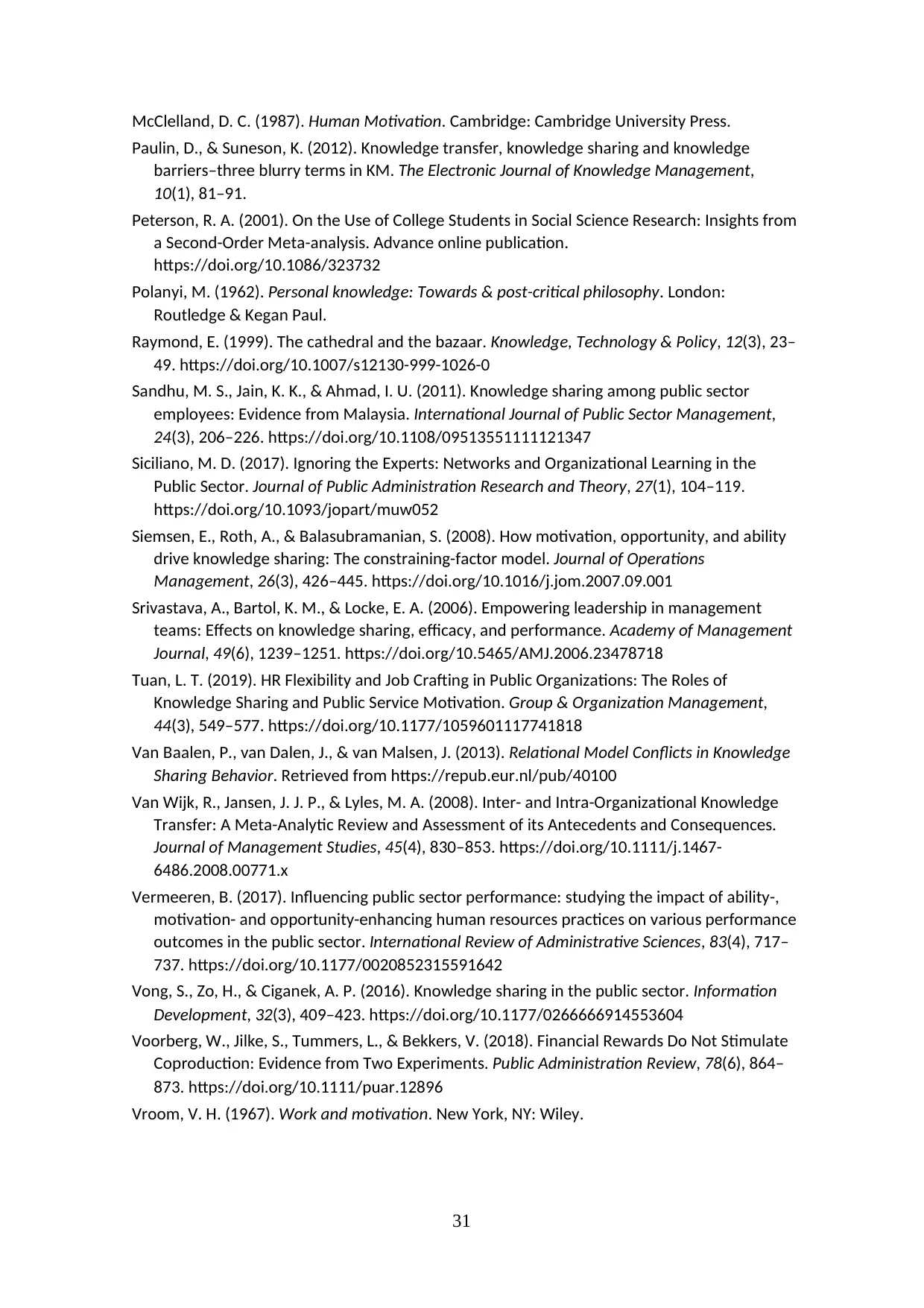
31
McClelland, D. C. (1987). Human Motivation. Cambridge: Cambridge University Press.
Paulin, D., & Suneson, K. (2012). Knowledge transfer, knowledge sharing and knowledge
barriers–three blurry terms in KM. The Electronic Journal of Knowledge Management,
10(1), 81–91.
Peterson, R. A. (2001). On the Use of College Students in Social Science Research: Insights from
a Second-Order Meta-analysis. Advance online publication.
https://doi.org/10.1086/323732
Polanyi, M. (1962). Personal knowledge: Towards & post-critical philosophy. London:
Routledge & Kegan Paul.
Raymond, E. (1999). The cathedral and the bazaar. Knowledge, Technology & Policy, 12(3), 23–
49. https://doi.org/10.1007/s12130-999-1026-0
Sandhu, M. S., Jain, K. K., & Ahmad, I. U. (2011). Knowledge sharing among public sector
employees: Evidence from Malaysia. International Journal of Public Sector Management,
24(3), 206–226. https://doi.org/10.1108/09513551111121347
Siciliano, M. D. (2017). Ignoring the Experts: Networks and Organizational Learning in the
Public Sector. Journal of Public Administration Research and Theory, 27(1), 104–119.
https://doi.org/10.1093/jopart/muw052
Siemsen, E., Roth, A., & Balasubramanian, S. (2008). How motivation, opportunity, and ability
drive knowledge sharing: The constraining-factor model. Journal of Operations
Management, 26(3), 426–445. https://doi.org/10.1016/j.jom.2007.09.001
Srivastava, A., Bartol, K. M., & Locke, E. A. (2006). Empowering leadership in management
teams: Effects on knowledge sharing, efficacy, and performance. Academy of Management
Journal, 49(6), 1239–1251. https://doi.org/10.5465/AMJ.2006.23478718
Tuan, L. T. (2019). HR Flexibility and Job Crafting in Public Organizations: The Roles of
Knowledge Sharing and Public Service Motivation. Group & Organization Management,
44(3), 549–577. https://doi.org/10.1177/1059601117741818
Van Baalen, P., van Dalen, J., & van Malsen, J. (2013). Relational Model Conflicts in Knowledge
Sharing Behavior. Retrieved from https://repub.eur.nl/pub/40100
Van Wijk, R., Jansen, J. J. P., & Lyles, M. A. (2008). Inter- and Intra-Organizational Knowledge
Transfer: A Meta-Analytic Review and Assessment of its Antecedents and Consequences.
Journal of Management Studies, 45(4), 830–853. https://doi.org/10.1111/j.1467-
6486.2008.00771.x
Vermeeren, B. (2017). Influencing public sector performance: studying the impact of ability-,
motivation- and opportunity-enhancing human resources practices on various performance
outcomes in the public sector. International Review of Administrative Sciences, 83(4), 717–
737. https://doi.org/10.1177/0020852315591642
Vong, S., Zo, H., & Ciganek, A. P. (2016). Knowledge sharing in the public sector. Information
Development, 32(3), 409–423. https://doi.org/10.1177/0266666914553604
Voorberg, W., Jilke, S., Tummers, L., & Bekkers, V. (2018). Financial Rewards Do Not Stimulate
Coproduction: Evidence from Two Experiments. Public Administration Review, 78(6), 864–
873. https://doi.org/10.1111/puar.12896
Vroom, V. H. (1967). Work and motivation. New York, NY: Wiley.
McClelland, D. C. (1987). Human Motivation. Cambridge: Cambridge University Press.
Paulin, D., & Suneson, K. (2012). Knowledge transfer, knowledge sharing and knowledge
barriers–three blurry terms in KM. The Electronic Journal of Knowledge Management,
10(1), 81–91.
Peterson, R. A. (2001). On the Use of College Students in Social Science Research: Insights from
a Second-Order Meta-analysis. Advance online publication.
https://doi.org/10.1086/323732
Polanyi, M. (1962). Personal knowledge: Towards & post-critical philosophy. London:
Routledge & Kegan Paul.
Raymond, E. (1999). The cathedral and the bazaar. Knowledge, Technology & Policy, 12(3), 23–
49. https://doi.org/10.1007/s12130-999-1026-0
Sandhu, M. S., Jain, K. K., & Ahmad, I. U. (2011). Knowledge sharing among public sector
employees: Evidence from Malaysia. International Journal of Public Sector Management,
24(3), 206–226. https://doi.org/10.1108/09513551111121347
Siciliano, M. D. (2017). Ignoring the Experts: Networks and Organizational Learning in the
Public Sector. Journal of Public Administration Research and Theory, 27(1), 104–119.
https://doi.org/10.1093/jopart/muw052
Siemsen, E., Roth, A., & Balasubramanian, S. (2008). How motivation, opportunity, and ability
drive knowledge sharing: The constraining-factor model. Journal of Operations
Management, 26(3), 426–445. https://doi.org/10.1016/j.jom.2007.09.001
Srivastava, A., Bartol, K. M., & Locke, E. A. (2006). Empowering leadership in management
teams: Effects on knowledge sharing, efficacy, and performance. Academy of Management
Journal, 49(6), 1239–1251. https://doi.org/10.5465/AMJ.2006.23478718
Tuan, L. T. (2019). HR Flexibility and Job Crafting in Public Organizations: The Roles of
Knowledge Sharing and Public Service Motivation. Group & Organization Management,
44(3), 549–577. https://doi.org/10.1177/1059601117741818
Van Baalen, P., van Dalen, J., & van Malsen, J. (2013). Relational Model Conflicts in Knowledge
Sharing Behavior. Retrieved from https://repub.eur.nl/pub/40100
Van Wijk, R., Jansen, J. J. P., & Lyles, M. A. (2008). Inter- and Intra-Organizational Knowledge
Transfer: A Meta-Analytic Review and Assessment of its Antecedents and Consequences.
Journal of Management Studies, 45(4), 830–853. https://doi.org/10.1111/j.1467-
6486.2008.00771.x
Vermeeren, B. (2017). Influencing public sector performance: studying the impact of ability-,
motivation- and opportunity-enhancing human resources practices on various performance
outcomes in the public sector. International Review of Administrative Sciences, 83(4), 717–
737. https://doi.org/10.1177/0020852315591642
Vong, S., Zo, H., & Ciganek, A. P. (2016). Knowledge sharing in the public sector. Information
Development, 32(3), 409–423. https://doi.org/10.1177/0266666914553604
Voorberg, W., Jilke, S., Tummers, L., & Bekkers, V. (2018). Financial Rewards Do Not Stimulate
Coproduction: Evidence from Two Experiments. Public Administration Review, 78(6), 864–
873. https://doi.org/10.1111/puar.12896
Vroom, V. H. (1967). Work and motivation. New York, NY: Wiley.
Secure Best Marks with AI Grader
Need help grading? Try our AI Grader for instant feedback on your assignments.
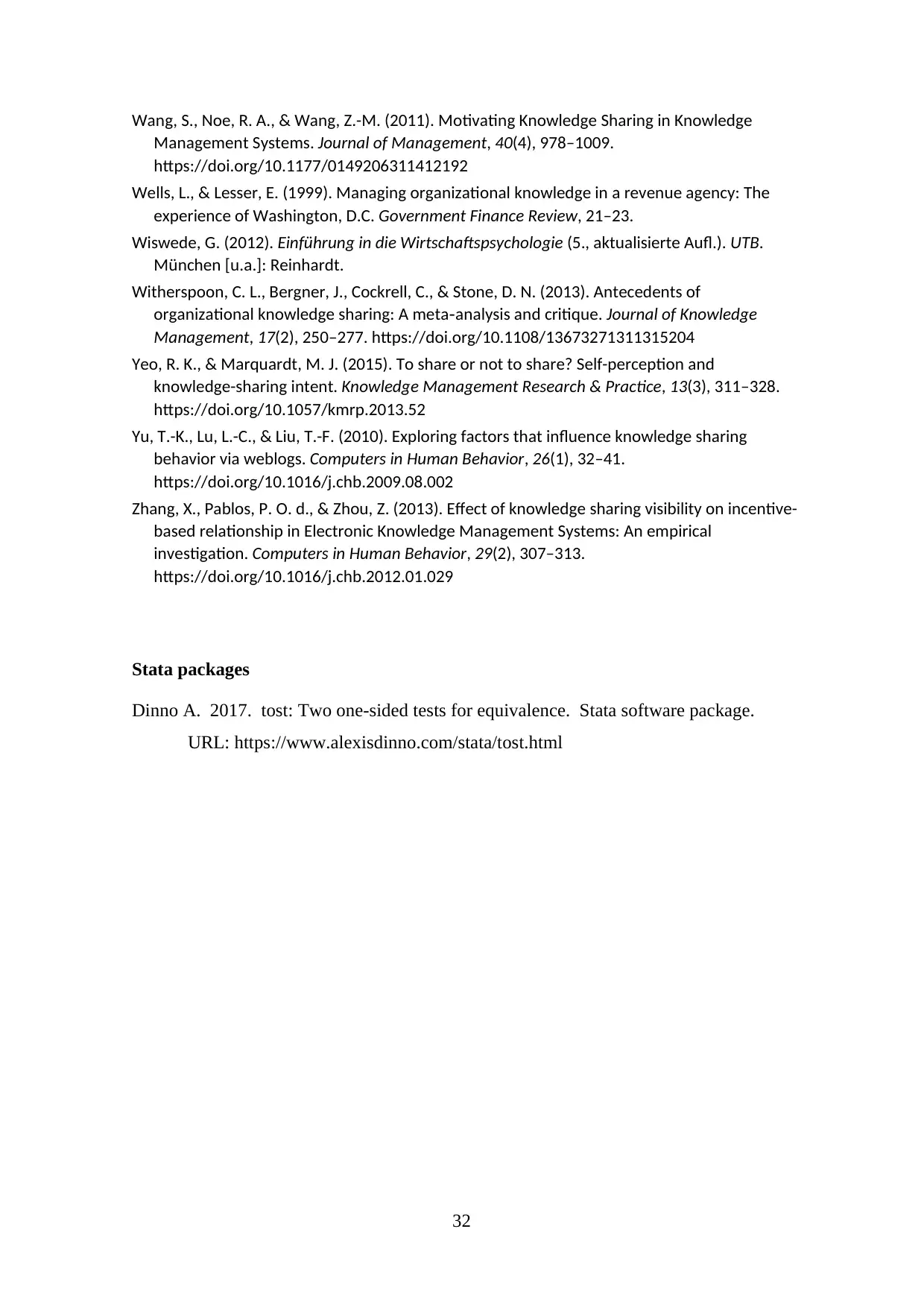
32
Wang, S., Noe, R. A., & Wang, Z.-M. (2011). Motivating Knowledge Sharing in Knowledge
Management Systems. Journal of Management, 40(4), 978–1009.
https://doi.org/10.1177/0149206311412192
Wells, L., & Lesser, E. (1999). Managing organizational knowledge in a revenue agency: The
experience of Washington, D.C. Government Finance Review, 21–23.
Wiswede, G. (2012). Einführung in die Wirtschaftspsychologie (5., aktualisierte Aufl.). UTB.
München [u.a.]: Reinhardt.
Witherspoon, C. L., Bergner, J., Cockrell, C., & Stone, D. N. (2013). Antecedents of
organizational knowledge sharing: A meta analysis and critique.‐ Journal of Knowledge
Management, 17(2), 250–277. https://doi.org/10.1108/13673271311315204
Yeo, R. K., & Marquardt, M. J. (2015). To share or not to share? Self-perception and
knowledge-sharing intent. Knowledge Management Research & Practice, 13(3), 311–328.
https://doi.org/10.1057/kmrp.2013.52
Yu, T.-K., Lu, L.-C., & Liu, T.-F. (2010). Exploring factors that influence knowledge sharing
behavior via weblogs. Computers in Human Behavior, 26(1), 32–41.
https://doi.org/10.1016/j.chb.2009.08.002
Zhang, X., Pablos, P. O. d., & Zhou, Z. (2013). Effect of knowledge sharing visibility on incentive-
based relationship in Electronic Knowledge Management Systems: An empirical
investigation. Computers in Human Behavior, 29(2), 307–313.
https://doi.org/10.1016/j.chb.2012.01.029
Stata packages
Dinno A. 2017. tost: Two one-sided tests for equivalence. Stata software package.
URL: https://www.alexisdinno.com/stata/tost.html
Wang, S., Noe, R. A., & Wang, Z.-M. (2011). Motivating Knowledge Sharing in Knowledge
Management Systems. Journal of Management, 40(4), 978–1009.
https://doi.org/10.1177/0149206311412192
Wells, L., & Lesser, E. (1999). Managing organizational knowledge in a revenue agency: The
experience of Washington, D.C. Government Finance Review, 21–23.
Wiswede, G. (2012). Einführung in die Wirtschaftspsychologie (5., aktualisierte Aufl.). UTB.
München [u.a.]: Reinhardt.
Witherspoon, C. L., Bergner, J., Cockrell, C., & Stone, D. N. (2013). Antecedents of
organizational knowledge sharing: A meta analysis and critique.‐ Journal of Knowledge
Management, 17(2), 250–277. https://doi.org/10.1108/13673271311315204
Yeo, R. K., & Marquardt, M. J. (2015). To share or not to share? Self-perception and
knowledge-sharing intent. Knowledge Management Research & Practice, 13(3), 311–328.
https://doi.org/10.1057/kmrp.2013.52
Yu, T.-K., Lu, L.-C., & Liu, T.-F. (2010). Exploring factors that influence knowledge sharing
behavior via weblogs. Computers in Human Behavior, 26(1), 32–41.
https://doi.org/10.1016/j.chb.2009.08.002
Zhang, X., Pablos, P. O. d., & Zhou, Z. (2013). Effect of knowledge sharing visibility on incentive-
based relationship in Electronic Knowledge Management Systems: An empirical
investigation. Computers in Human Behavior, 29(2), 307–313.
https://doi.org/10.1016/j.chb.2012.01.029
Stata packages
Dinno A. 2017. tost: Two one-sided tests for equivalence. Stata software package.
URL: https://www.alexisdinno.com/stata/tost.html
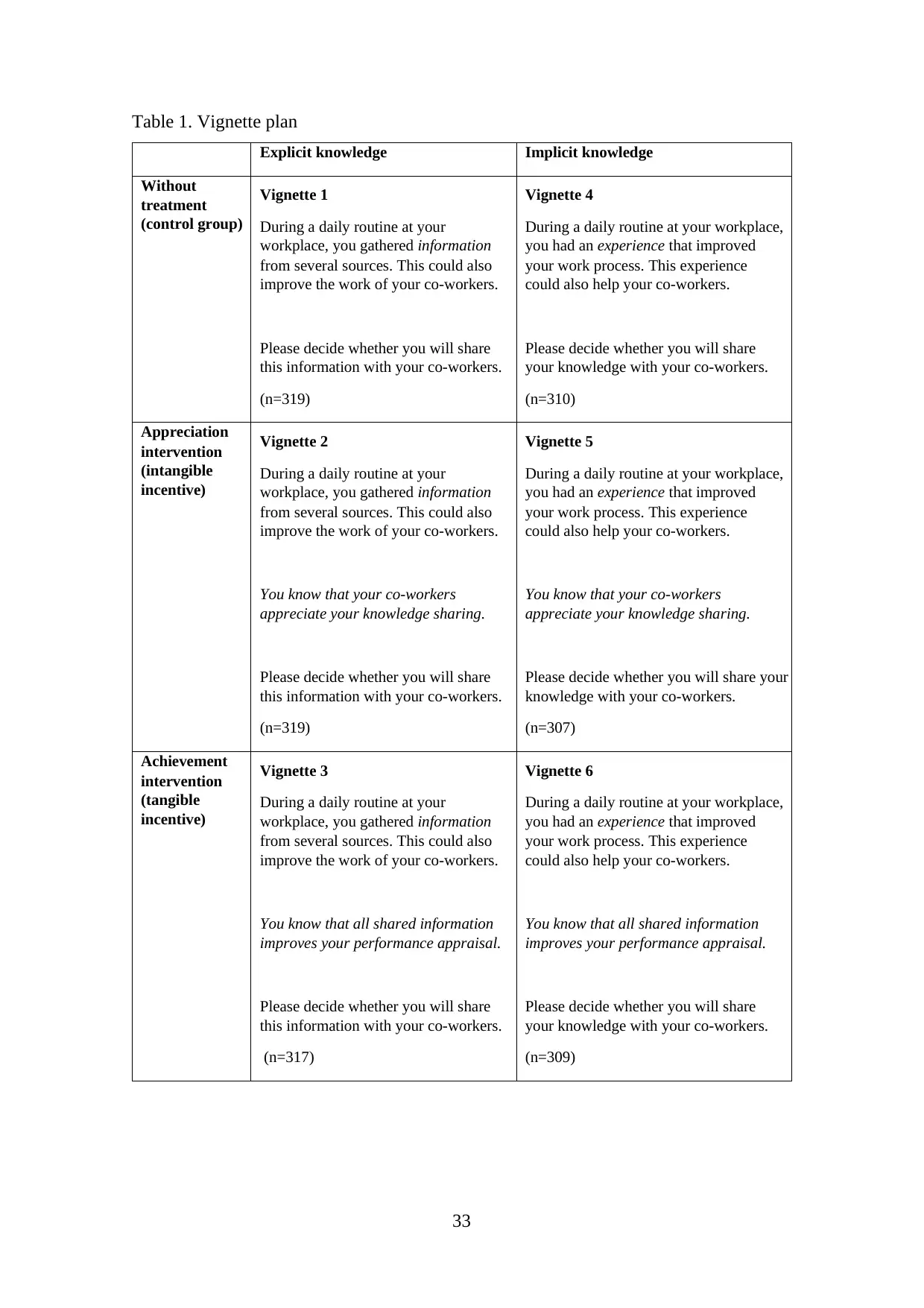
33
Table 1. Vignette plan
Explicit knowledge Implicit knowledge
Without
treatment
(control group)
Vignette 1
During a daily routine at your
workplace, you gathered information
from several sources. This could also
improve the work of your co-workers.
Please decide whether you will share
this information with your co-workers.
(n=319)
Vignette 4
During a daily routine at your workplace,
you had an experience that improved
your work process. This experience
could also help your co-workers.
Please decide whether you will share
your knowledge with your co-workers.
(n=310)
Appreciation
intervention
(intangible
incentive)
Vignette 2
During a daily routine at your
workplace, you gathered information
from several sources. This could also
improve the work of your co-workers.
You know that your co-workers
appreciate your knowledge sharing.
Please decide whether you will share
this information with your co-workers.
(n=319)
Vignette 5
During a daily routine at your workplace,
you had an experience that improved
your work process. This experience
could also help your co-workers.
You know that your co-workers
appreciate your knowledge sharing.
Please decide whether you will share your
knowledge with your co-workers.
(n=307)
Achievement
intervention
(tangible
incentive)
Vignette 3
During a daily routine at your
workplace, you gathered information
from several sources. This could also
improve the work of your co-workers.
You know that all shared information
improves your performance appraisal.
Please decide whether you will share
this information with your co-workers.
(n=317)
Vignette 6
During a daily routine at your workplace,
you had an experience that improved
your work process. This experience
could also help your co-workers.
You know that all shared information
improves your performance appraisal.
Please decide whether you will share
your knowledge with your co-workers.
(n=309)
Table 1. Vignette plan
Explicit knowledge Implicit knowledge
Without
treatment
(control group)
Vignette 1
During a daily routine at your
workplace, you gathered information
from several sources. This could also
improve the work of your co-workers.
Please decide whether you will share
this information with your co-workers.
(n=319)
Vignette 4
During a daily routine at your workplace,
you had an experience that improved
your work process. This experience
could also help your co-workers.
Please decide whether you will share
your knowledge with your co-workers.
(n=310)
Appreciation
intervention
(intangible
incentive)
Vignette 2
During a daily routine at your
workplace, you gathered information
from several sources. This could also
improve the work of your co-workers.
You know that your co-workers
appreciate your knowledge sharing.
Please decide whether you will share
this information with your co-workers.
(n=319)
Vignette 5
During a daily routine at your workplace,
you had an experience that improved
your work process. This experience
could also help your co-workers.
You know that your co-workers
appreciate your knowledge sharing.
Please decide whether you will share your
knowledge with your co-workers.
(n=307)
Achievement
intervention
(tangible
incentive)
Vignette 3
During a daily routine at your
workplace, you gathered information
from several sources. This could also
improve the work of your co-workers.
You know that all shared information
improves your performance appraisal.
Please decide whether you will share
this information with your co-workers.
(n=317)
Vignette 6
During a daily routine at your workplace,
you had an experience that improved
your work process. This experience
could also help your co-workers.
You know that all shared information
improves your performance appraisal.
Please decide whether you will share
your knowledge with your co-workers.
(n=309)
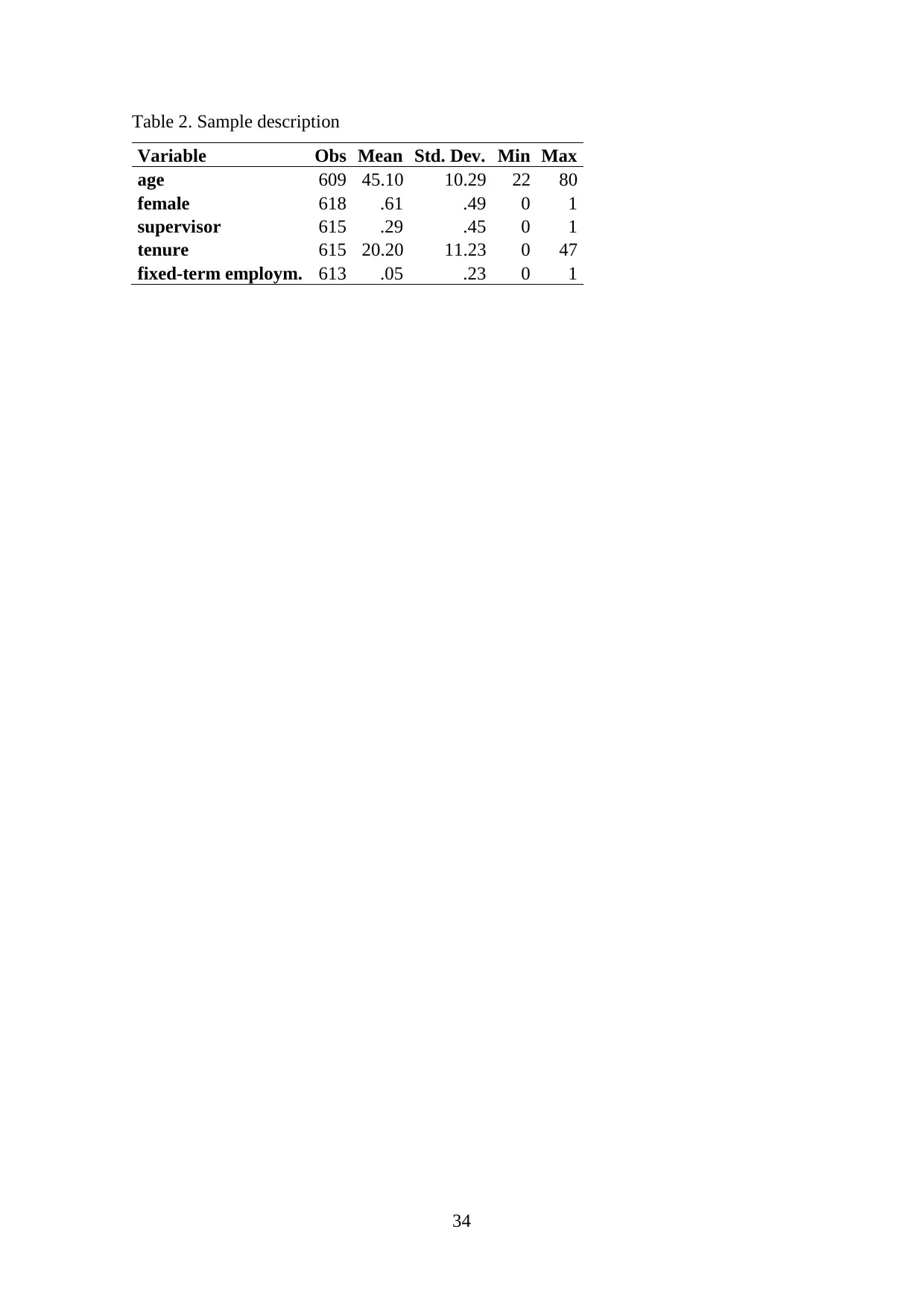
34
Table 2. Sample description
Variable Obs Mean Std. Dev. Min Max
age 609 45.10 10.29 22 80
female 618 .61 .49 0 1
supervisor 615 .29 .45 0 1
tenure 615 20.20 11.23 0 47
fixed-term employm. 613 .05 .23 0 1
Table 2. Sample description
Variable Obs Mean Std. Dev. Min Max
age 609 45.10 10.29 22 80
female 618 .61 .49 0 1
supervisor 615 .29 .45 0 1
tenure 615 20.20 11.23 0 47
fixed-term employm. 613 .05 .23 0 1
Paraphrase This Document
Need a fresh take? Get an instant paraphrase of this document with our AI Paraphraser
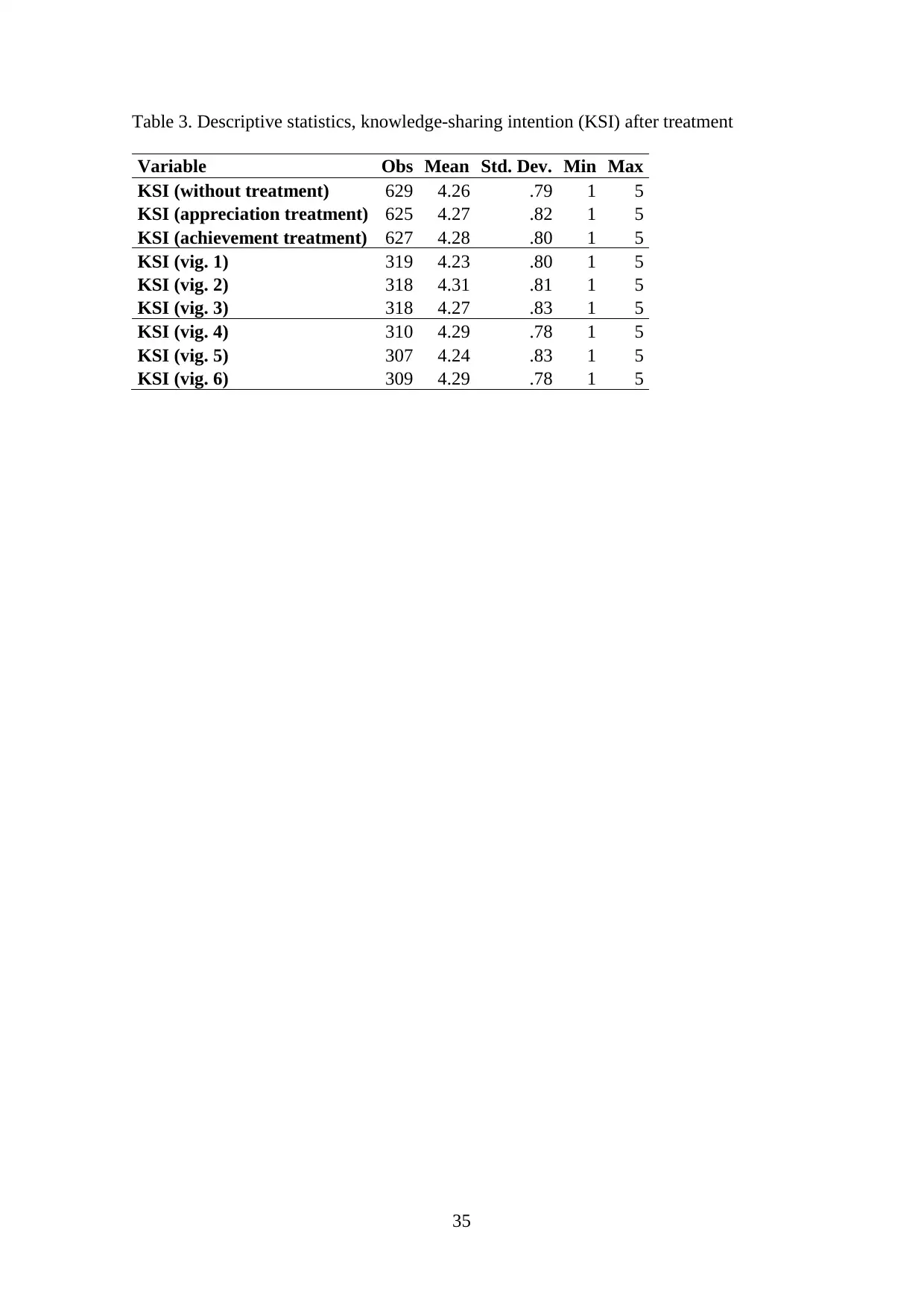
35
Table 3. Descriptive statistics, knowledge-sharing intention (KSI) after treatment
Variable Obs Mean Std. Dev. Min Max
KSI (without treatment) 629 4.26 .79 1 5
KSI (appreciation treatment) 625 4.27 .82 1 5
KSI (achievement treatment) 627 4.28 .80 1 5
KSI (vig. 1) 319 4.23 .80 1 5
KSI (vig. 2) 318 4.31 .81 1 5
KSI (vig. 3) 318 4.27 .83 1 5
KSI (vig. 4) 310 4.29 .78 1 5
KSI (vig. 5) 307 4.24 .83 1 5
KSI (vig. 6) 309 4.29 .78 1 5
Table 3. Descriptive statistics, knowledge-sharing intention (KSI) after treatment
Variable Obs Mean Std. Dev. Min Max
KSI (without treatment) 629 4.26 .79 1 5
KSI (appreciation treatment) 625 4.27 .82 1 5
KSI (achievement treatment) 627 4.28 .80 1 5
KSI (vig. 1) 319 4.23 .80 1 5
KSI (vig. 2) 318 4.31 .81 1 5
KSI (vig. 3) 318 4.27 .83 1 5
KSI (vig. 4) 310 4.29 .78 1 5
KSI (vig. 5) 307 4.24 .83 1 5
KSI (vig. 6) 309 4.29 .78 1 5
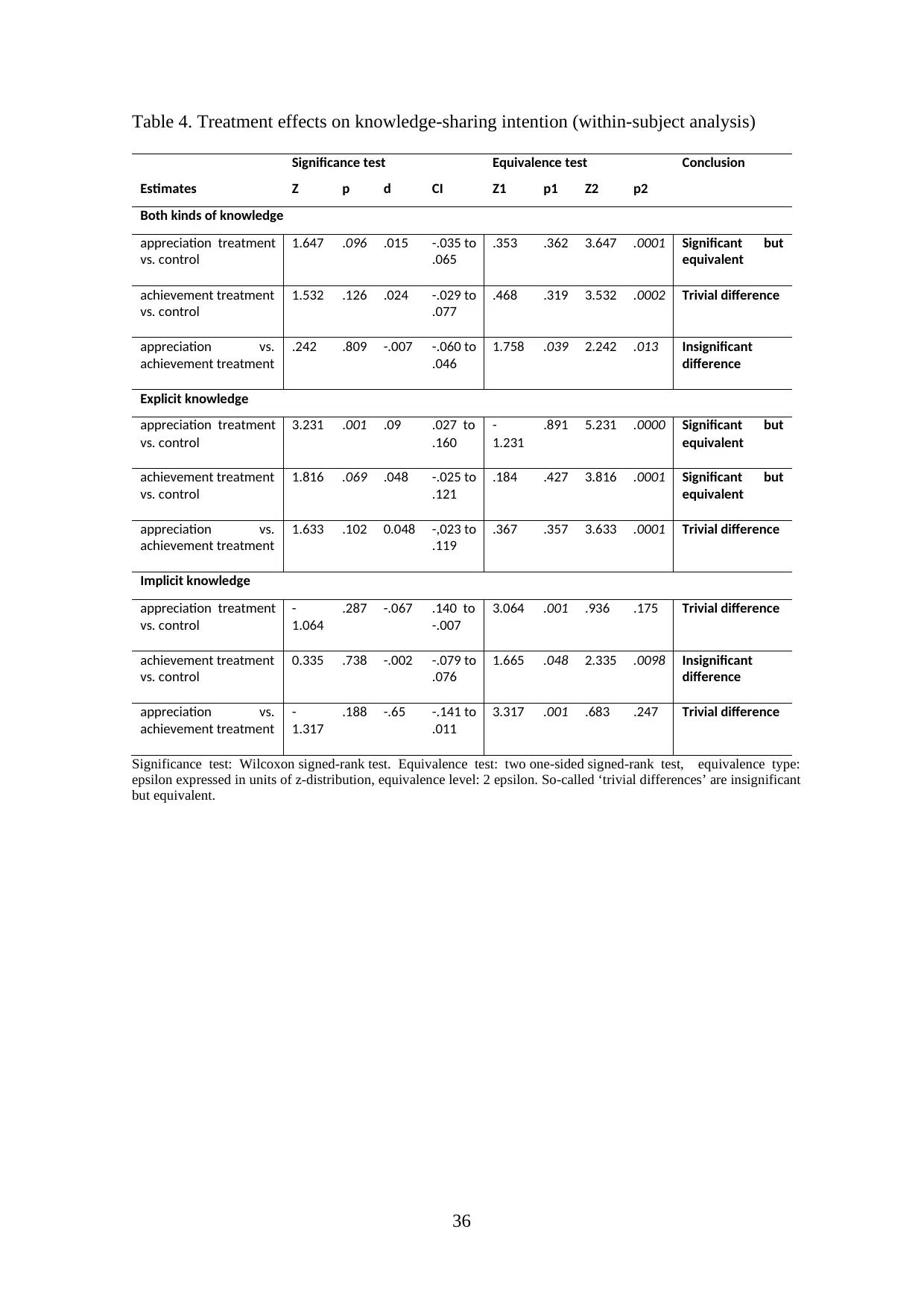
36
Table 4. Treatment effects on knowledge-sharing intention (within-subject analysis)
Significance test Equivalence test Conclusion
Estimates Z p d CI Z1 p1 Z2 p2
Both kinds of knowledge
appreciation treatment
vs. control
1.647 .096 .015 -.035 to
.065
.353 .362 3.647 .0001 Significant but
equivalent
achievement treatment
vs. control
1.532 .126 .024 -.029 to
.077
.468 .319 3.532 .0002 Trivial difference
appreciation vs.
achievement treatment
.242 .809 -.007 -.060 to
.046
1.758 .039 2.242 .013 Insignificant
difference
Explicit knowledge
appreciation treatment
vs. control
3.231 .001 .09 .027 to
.160
-
1.231
.891 5.231 .0000 Significant but
equivalent
achievement treatment
vs. control
1.816 .069 .048 -.025 to
.121
.184 .427 3.816 .0001 Significant but
equivalent
appreciation vs.
achievement treatment
1.633 .102 0.048 -,023 to
.119
.367 .357 3.633 .0001 Trivial difference
Implicit knowledge
appreciation treatment
vs. control
-
1.064
.287 -.067 .140 to
-.007
3.064 .001 .936 .175 Trivial difference
achievement treatment
vs. control
0.335 .738 -.002 -.079 to
.076
1.665 .048 2.335 .0098 Insignificant
difference
appreciation vs.
achievement treatment
-
1.317
.188 -.65 -.141 to
.011
3.317 .001 .683 .247 Trivial difference
Significance test: Wilcoxon signed-rank test. Equivalence test: two one-sided signed-rank test, equivalence type:
epsilon expressed in units of z-distribution, equivalence level: 2 epsilon. So-called ‘trivial differences’ are insignificant
but equivalent.
Table 4. Treatment effects on knowledge-sharing intention (within-subject analysis)
Significance test Equivalence test Conclusion
Estimates Z p d CI Z1 p1 Z2 p2
Both kinds of knowledge
appreciation treatment
vs. control
1.647 .096 .015 -.035 to
.065
.353 .362 3.647 .0001 Significant but
equivalent
achievement treatment
vs. control
1.532 .126 .024 -.029 to
.077
.468 .319 3.532 .0002 Trivial difference
appreciation vs.
achievement treatment
.242 .809 -.007 -.060 to
.046
1.758 .039 2.242 .013 Insignificant
difference
Explicit knowledge
appreciation treatment
vs. control
3.231 .001 .09 .027 to
.160
-
1.231
.891 5.231 .0000 Significant but
equivalent
achievement treatment
vs. control
1.816 .069 .048 -.025 to
.121
.184 .427 3.816 .0001 Significant but
equivalent
appreciation vs.
achievement treatment
1.633 .102 0.048 -,023 to
.119
.367 .357 3.633 .0001 Trivial difference
Implicit knowledge
appreciation treatment
vs. control
-
1.064
.287 -.067 .140 to
-.007
3.064 .001 .936 .175 Trivial difference
achievement treatment
vs. control
0.335 .738 -.002 -.079 to
.076
1.665 .048 2.335 .0098 Insignificant
difference
appreciation vs.
achievement treatment
-
1.317
.188 -.65 -.141 to
.011
3.317 .001 .683 .247 Trivial difference
Significance test: Wilcoxon signed-rank test. Equivalence test: two one-sided signed-rank test, equivalence type:
epsilon expressed in units of z-distribution, equivalence level: 2 epsilon. So-called ‘trivial differences’ are insignificant
but equivalent.
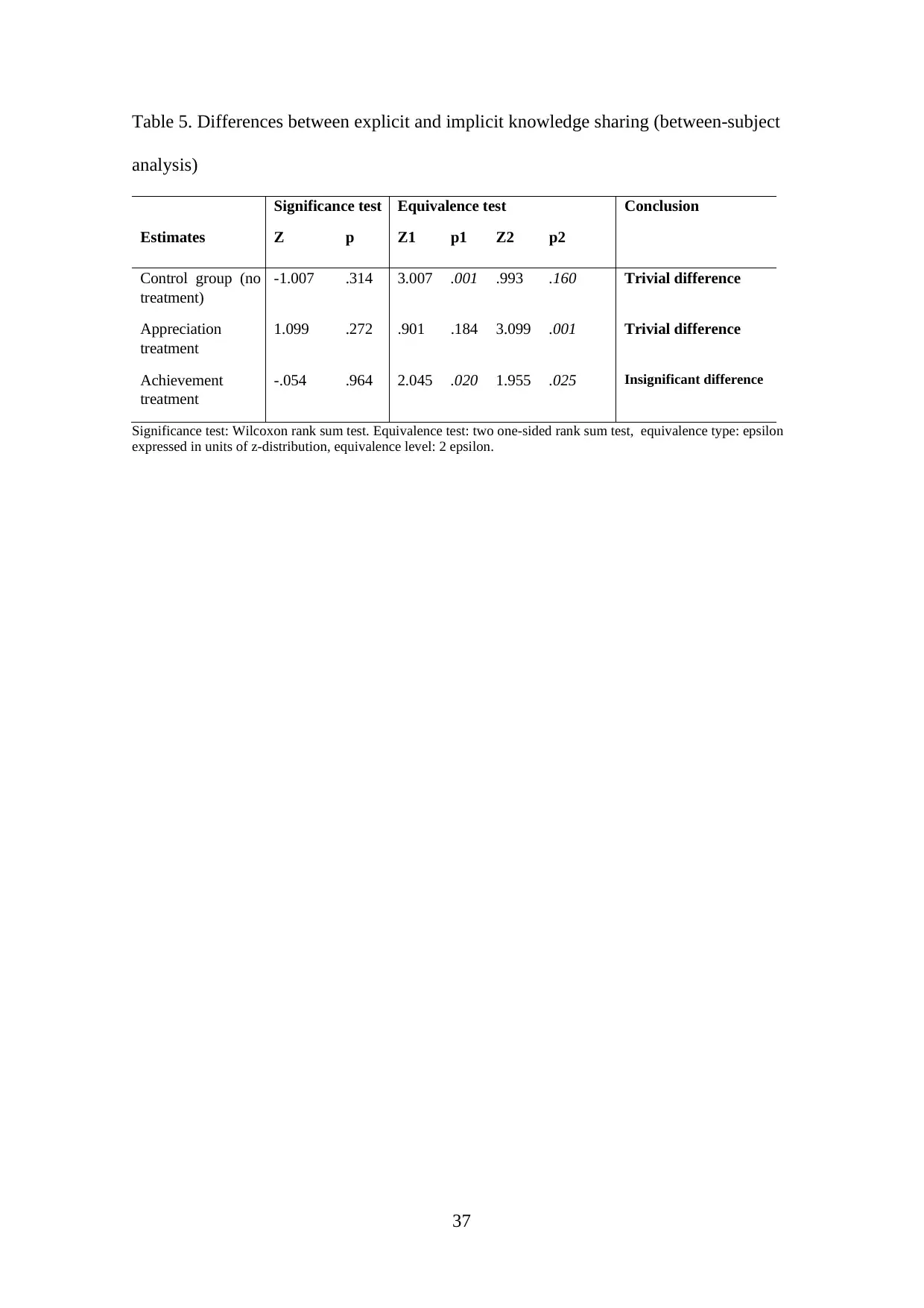
37
Table 5. Differences between explicit and implicit knowledge sharing (between-subject
analysis)
Significance test Equivalence test Conclusion
Estimates Z p Z1 p1 Z2 p2
Control group (no
treatment)
-1.007 .314 3.007 .001 .993 .160 Trivial difference
Appreciation
treatment
1.099 .272 .901 .184 3.099 .001 Trivial difference
Achievement
treatment
-.054 .964 2.045 .020 1.955 .025 Insignificant difference
Significance test: Wilcoxon rank sum test. Equivalence test: two one-sided rank sum test, equivalence type: epsilon
expressed in units of z-distribution, equivalence level: 2 epsilon.
Table 5. Differences between explicit and implicit knowledge sharing (between-subject
analysis)
Significance test Equivalence test Conclusion
Estimates Z p Z1 p1 Z2 p2
Control group (no
treatment)
-1.007 .314 3.007 .001 .993 .160 Trivial difference
Appreciation
treatment
1.099 .272 .901 .184 3.099 .001 Trivial difference
Achievement
treatment
-.054 .964 2.045 .020 1.955 .025 Insignificant difference
Significance test: Wilcoxon rank sum test. Equivalence test: two one-sided rank sum test, equivalence type: epsilon
expressed in units of z-distribution, equivalence level: 2 epsilon.
Secure Best Marks with AI Grader
Need help grading? Try our AI Grader for instant feedback on your assignments.
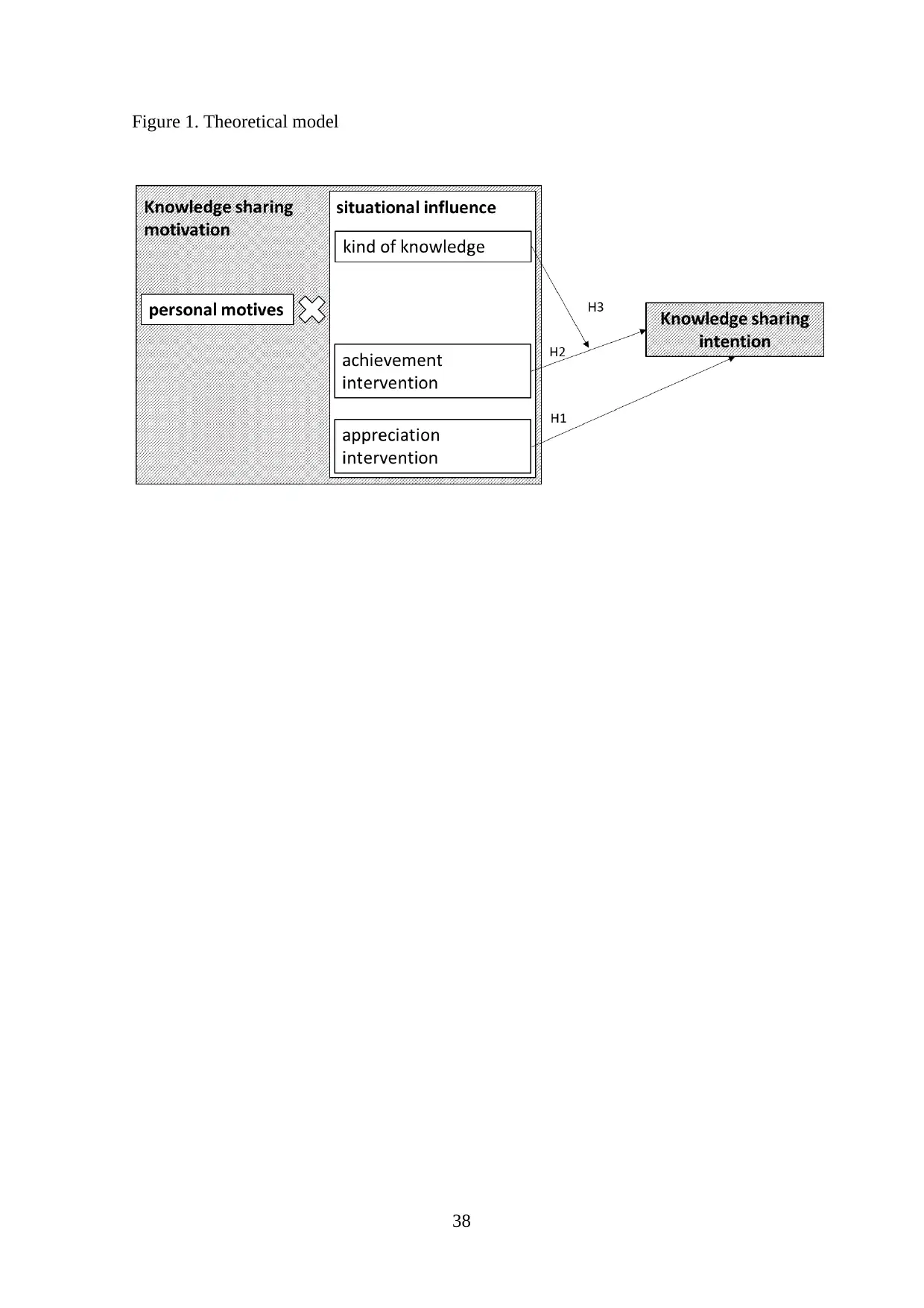
38
Figure 1. Theoretical model
Figure 1. Theoretical model
1 out of 38
![[object Object]](/_next/static/media/star-bottom.7253800d.svg)